What’s Your Perfect Career? Take the Free Quiz
Which School is Perfect For You? Find Out!


75 Best Motivational and Inspirational Quotes For College Students
Darius Goldman
To save you from endless research, we’ve put together a list of the 75 best graduation, and college student inspiration quotes of all time..
Going to college and prepping for the “real world” is not easy. Dealing with grades, studying, bills, pressure from your parents, and having to answer the big question: “What should I do with my life?“, means there are a lot of expectations on your plate.
Whether you are a new college student, a graduate, prepping for your finals, or in the middle of a semester still trying to get through your classes, being a student can be stressful.
However, sometimes all it takes is a little inspiration and wisdom to find the motivation to kill it in your college classes. To save you from endless research and homework, we’ve put together a list of the 75 best graduation, and college student inspirational quotes of all time.
Quotes From Freshmen in College
- “It’s not about perfect. It’s about effort.” – Jillian Michaels
- “Excellence is not a skill. It is an attitude.”– Ralph Marston
- “Focus on your goal. Don’t look in any direction but ahead.” -unknown
- “You don’t get what you wish for. You get what you work for.” – Daniel Milstein
- “Do something now; your future self will thank you for later.” – unknown
- “Don’t try to be perfect. Just try to be better than you were yesterday.” – unknown
- “Keep going. Everything you need will come to you at the perfect time.” – unknown
- “Even the greatest were beginners. Don’t be afraid to take that first step.” – unknown
- “Everything you’ve ever wanted is on the other side of fear.” – George Addair
- “Your time is limited, so don’t waste it living someone else’s life.”– Steve Jobs
- “You can’t use up creativity. The more you use, the more you have.”– Maya Angelou
- ‘The best way to gain self-confidence is to do what you are afraid to do.” – Swati Sharma
- “If you hear a voice within you say ‘you cannot paint,’ then by all means paint, and that voice will be silenced.” – Vincent Van Gogh
- “Courage doesn’t always roar. Sometimes courage is the quiet voice at the end of the day saying ‘I will try again tomorrow’.”– Mary Anne Radmacher
Quotes to Help You Study Harder
15. “A little progress each day adds up to big results.” – Satya Nani
16. “It’s not about having time. It’s about making time.” – unknown
17. “Losers quit when they’re tired. Winners quit when they’ve won.”
18. “Skill is only developed by hours and hours of work.” – Usain Bolt
19. “You will never always be motivated. You have to learn to be disciplined.” – unknown
20. “Self-discipline is the magic power that makes you virtually unstoppable.” – Dan Kennedy
21. “The way to get started is to quit talking and begin doing.” – Walt Disney
22. “Focus on doing the right things instead of a bunch of things.” – Mike Krieger
23. “The successful warrior is the average man, with laser-like focus.” – Bruce Lee
24. “Discipline is just choosing between what you want now and what you want most.” – Abraham Lincoln
Quotes That Help Build Determination
25. “Wake up with determination. Go to bed with satisfaction.” – unknown
26. “It never gets easier. You just get better.” – Jordan Hoechlin
27. “Fall seven times, stand up eight.” – Japanese Proverb
28. “The pain you feel today will be the strength you feel tomorrow.” – Nicole
29. “You don’t want to look back and know you could have done better.” – unknown
30. “Successful people are not gifted; they just work hard, then succeed on purpose.” – G.K. Nielson
31. “Determination is doing what needs to be done even when you don’t feel like doing it.” – unknown
32. “If you are not willing to risk the usual, you will have to settle for the ordinary.” – Jim Rohn
33. “Perseverance is the hard work you do after you get tired of doing the hard work you already did.” – Newt Gingrich
Quotes for Graduation
34. “Everything’s always ending. But everything’s always beginning, too.” — Patrick Ness 35. “There is no passion to be found in playing small, in settling for a life that is less than the one you are capable of living. —Nelson Mandela 36. “The fireworks begin today. Each diploma is a lighted match, each one of you is a fuse.” — Ed Koch 37. “Don’t cry because it’s over. Smile because it happened.” —Dr. Seuss
38. “Always be a first-rate version of yourself, instead of a second-rate version of somebody else.” — Judy Garland
39. “You may never know what results come of your action, but if you do nothing there will be no result.” — Mahatma Ghandi
40. “Education is something we have to keep pursuing day after day.” — Premier Brian Gallant 41. “If you don’t go after what you want, you’ll never have it. If you don’t ask, the answer is always no. If you don’t step forward, you’re always in the same place.” – Nora Roberts 42. “The best way to predict your future is to create it.” – Abraham Lincoln 43. “No, sky is not the limit. It is only the beginning.” — Donovan Livingston
44, “Every person you meet knows something you don’t; learn from them.” —H Jackson Brown Jr.
45. “Great things are done by a series of small things brought together.” — Vincent Van Gogh
46. “Never bend your head. Always hold it high. Look the world right in the eye.” – Helen Keller 47. “To accomplish great things, we must not only act, but also dream, not only plan, but also believe.” — Anatole Franc 48. “It takes courage to grow up and become who you really are.” – E.E. Cummings
Motivational Quotes For After Graduation
49. “Whatever you are, be a good one.”– Abraham Lincoln
50. “Opportunities don’t happen. You create them.”– Chris Grosser
51. “The true success is the person who invented himself.”– Al Goldstein
52. “Your time is limited, so don’t waste it living someone else’s life.”– Steve Jobs
53. “All progress takes place outside of your comfort zone.”– Michael John Bobak
54. “Set a goal so big that you can’t achieve it until you grow into the person who can.”
55. “Make the most of yourself….for that is all there is of you.”– Ralph Waldo Emerson
56. “Definiteness of purpose is the starting point of all achievement.”– W. Clement Stone
57. “There is only one thing that makes a dream impossible to achieve: the fear of failure.” – Paulo Coelho
58. “With the realization of one’s own potential and self-confidence in one’s ability, one can build a better world.”– Dalai Lama
59. “The noblest question in the world is: What good may I do in it?” — Benjamin Franklin
60. “You get in life what you have the courage to ask for.” —Oprah Winfrey Funny Graduation Quotes
61. “Do not worry too much about your lawn. You will soon find, if you haven’t already, that almost every adult American devotes tremendous time and money to the maintenance of an invasive plant species called turf grass that we can’t eat. I encourage you to choose better obsessions.”- John Green to Butler University in 2013
62. “Remember, when it comes to applying for jobs, books ARE judged by their cover!” Patricia Akins
63. “Struggling to decide what to do after graduation is, and always will be, a sort of rite of passage to the next phase of your life.” Gloria Davidson
64. “Life is an improvisation. You have no idea what’s going to happen next and you are mostly just making things up as you go along. – Stephen Colbert
65. “I learned many great lessons from my father, not the least of which was that you can fail at what you don’t want, so you might as well take a chance on doing what you love.” – Jim Carrey
66. “You will never have more energy or enthusiasm, hair, or brain cells than you have today.” – Tom & Ray Magliozzi
67. “You’re going to fall down, but the world doesn’t care how many times you fall down, as long as it’s one fewer than the numbers of times you get back up.” – Aaron Sorkin
68. “Just remember, you can’t climb the ladder of success with your hands in your pockets.” – Arnold Schwarzenegger
69. “So long as your desire to explore is greater than your desire to not screw up, you’re on the right track.” – Ed Helms
70. “The only place where success comes before work is in the dictionary.” – Vidal Sassoon
71. “You will find the key to success under the alarm clock.” – Benjamin Franklin
72. “Your families are extremely proud of you. You can’t imagine the sense of relief they are experiencing. This would be a most opportune time to ask for money.” – Gary Bolding
73. “To those of you who received honors, awards and distinctions, I say well done. And to the C students, I say you too may one day be president of the United States.” – George W. Bush
74. “The road to success is dotted with many tempting parking spaces.” – Will Rogers
75. “Now that you’ve graduated, just remember: Bosses don’t usually accept notes from your mother.” – Melanie White
College can be stressful. It’s easy to get into a cycle where you can lack motivation, confidence, and drive. Hopefully these quotes from noteworthy people have given you some confidence to push through college or encouragement to take on the post-college world. If you’re looking for some more college advice check out our blog!
About the author
Related posts.

Career Schools: How To Simplify Student Financing With A Single Application To Multiple Lenders

Manuevering the Complex Landscape of Student Loan Debt in the United States

6 Best Options to Pay For School After You’ve Exhausted your Federal Aid
Ready to discover the power of learn now, pay later.
Let Meratas empower you.
Meratas provides embedded payment plan infrastructure and a multi-lender marketplace. Meratas does not provide financing and is not a lending institution.
Privacy Policy
Terms of Use
Lender Marketplace Login
School Payment Plan Login
NMLS Consumer Access: ID 2120180
Meratas is not responsible for third party products, services, sites, recommendations, endorsements, reviews, etc. All products, logos, and company names are trademarks™ or registered® trademarks of their respective holders. Their use does not signify or suggest the endorsement, affiliation, or sponsorship, of or by Meratas.
School matching is provided by Meratas as an independent, advertising-supported service. We may be compensated by the schools we promote in exchange for featured placement of certain sponsored products and services, or your clicking on links posted on this website.
This compensation may impact how and where products appear on this site (including, for example, the order in which they appear). Meratas strives to provide a wide array of offers for our users, but our offers do not represent all learning institutions or course programs.
We endeavor to ensure that the information on this site is current and accurate but you should confirm any information directly with your selected learning institution and read the information they provide. Although every effort has been made to provide complete and accurate information, Meratas makes no warranties, express or implied, or representations as to the accuracy of content contained herein, which has been provided to us by our school partners.. We assume no liability or responsibility for any error or omissions in the information contained herein or the operation or use of these materials
At Meratas, we believe in transparency and partner with reputable companies to enhance your potential for success. Earnings figures are indicative, not guarantees. Earnings figures are taken from ZipRecruiter for the New York, NY region, and can be reviewed here . Using this link , you may review earnings figures specific to your state of residence. Success stories are not typical; results may vary. Placement rates are not a promise of employment.
We endeavor to ensure that the information on this site is current and accurate but you should confirm any information directly with your selected learning institution and read the information they provide. Although every effort has been made to provide complete and accurate information, Meratas makes no warranties, express or implied, or representations as to the accuracy of content contained herein, which has been provided to us by our school partners.. We assume no liability or responsibility for any error or omissions in the information contained herein or the operation or use of these materials.
Home — Blog — Study Tips & Tricks — 50 Study Motivational Quotes: For College and University Students
50 Study Motivational Quotes: For College and University Students

When you seek inspiration and want to push yourself forward, you have to get creative and look for those words that will help you to feel motivated. It can be a quote from the book or a movie quote from your favorite superhero, an athlete, or a celebrity that helps you to feel better and be yourself. It is a reason why study motivation quotes are so popular because they inspire us to read and explore, follow the best values, and implement acquired knowledge where it is applicable. Even the schoolchildren know that using a famous quote by Winnie The Pooh can help them to stay friendly and approach their studies as a responsibility. The same relates to college and university learners who need to show their best and follow those people who have achieved success through hard work, research, and dedication.
This is how we learn! Keeping this fact in mind, we have collected fifty motivational quotes that will help you to find something that will take your studies to another level. When you introduce a saying in an essay or research project, it will show that you have done some research to make your writing even more inspirational. Additionally, exploring reflective essay examples can be equally enlightening when searching for motivation. These essays often delve into personal experiences and insights, offering readers not only motivational quotes but also real-life applications of perseverance, resilience, and growth. Reflective essays underscore the power of reflection in overcoming obstacles and achieving personal growth, making them a rich source of inspiration for anyone looking to ignite their motivation.
50 Motivational Quotes to Consider For Your Learning
Speaking of study motivational quotes for students , we decided to choose not only the most famous but also those that are not so well-known.
- "Success is the sum of small efforts, repeated." (R Collier)
- "One day these 5 am's will make you a legend." (Author Unknown)
- "You may encounter many defeats but you must not be defeated." (Maya Angelou)
- "Wake up determined, go to bed satisfied." (Author Unknown)
- "The only place where success comes before work is in the dictionary." (Vidal Sassoon)
- "Forget the mistake, remember the lesson." (Author Unknown)
- "I find that the harder I work, the more luck I seem to have." (Thomas Jefferson)
- "Education is the key to success." (Author Unknown)
- "Why fit in when you were born to stand out?" (Dr. Seuss)
- "The future belongs to those who believe in the beauty of their dreams." (Eleanor Roosevelt)
Now let us explore various study quotes that will fit students of all ages. Just say them to your younger sibling or a child and trust your heart as you will see their eyes sparkle with inspiration from a short phrase:
- "The best way to predict your future is to create it." (Abraham Lincoln)
- "There's no learning without trying lots of ideas and failing lots of times." (Jonathan Ive)
- "Failure is the opportunity to begin again more intelligently." (Henry Ford)
- "No one is perfect! That's why pencils have erasers." (Wolfgang Riebe)
- "Always desire to learn something useful." (Sophocles)
- "Don't study until you get it right . Study until you can't get it wrong." (Author Unknown)
- "No kid is unsmart. Every kid's a genius at something." (Robin Sharma)
- "What we learn with pleasure, we never forget." (Alfred Mercier)
- "Poor is the pupil who does not surpass his master." (Leonardo da Vinci)
- "Every child is gifted. They just unwrap their packages at different times." (Author Unknown) You may also be interested Challenges in My Life: a Reflection Introduction No one really counts the number of obstacles they face in their lives because as the years go by, they just keep piling on endlessly. ...
Let us continue with the famous quotes about studying that you may already know well, yet it never hurts to remind of positive words again:
- "Every morning you have two choices: continue to sleep with your dreams or wake up and chase them." (Author Unknown)
- "It always seems impossible until it's done." (Author Unknown)
- "Strive for progress, not perfection." (Author Unknown)
- "What seems to us as bitter trials are often blessings in disguise." (Oscar Wilde)
- "Don't let what you cannot do interfere with what you can do. (John Wooden)
- "Just believe in yourself. Even if you don't, pretend that you do and, at some point, you will." (Venus Williams)
- "Focus on one thing at a time, set your priority, and stick with one no matter what!" (Tyler Perry)
- "If you get tired, learn to rest, not to quit." (Banksy)
- "Hard work beats talent when talent doesn't work hard." (Author Unknown)
- "Teach me how to think, not what to think." (Author Unknown)
Now let’s proceed with the famous people we all know about who have achieved great success both as employees and entrepreneurs:
- "The greatest enemy of knowledge is not ignorance, it is the illusion of knowledge." (Stephen Hawking)
- "Challenge yourself! It's the only path which leads to growth." (Morgan Freeman)
- "Technology is just a tool. In terms of getting the kids working together and motivating them, the teacher is the most important." (Bill Gates)
- "The people who are crazy enough to believe they can change the world are the ones who do." (Steve Jobs)
- "Success is most often achieved by those who don't know that failure is inevitable." (Coco Chanel)
- "We are what we repeatedly do. Excellence, therefore, is not an act but a habit." (Aristotle)
- "A person who never made a mistake never tried anything new!" (Albert Einstein)
- "The secret of getting ahead is getting started." (Mark Twain)
- "Education is the most powerful weapon which you can use to change the world." (Nelson Mandela)
- "I've learned it's important not to limit yourself. You can do whatever you really love to do, no matter what it is." (Ryan Gosling)
As for the final bunch, we took a look through 100 inspirational ideas, and here is a little bit of everything to help you keep motivated as you learn and keep going through the challenges:
- "All great leaders are readers." (Author Unknown)
- "Education is the passport to the future, for tomorrow belongs to those who prepare for it today." (Malcolm X)
- "College is tough, but so are you!" (Author Unknown)
- "College is about three things: homework, fun, and sleep... but you can only choose two." (Andy Stern)
- "There is no elevator to success! You have to take the stairs." (Author Unknown)
- "Success is the sum of small efforts, repeated day-in and day-out." (Robert Collier)
- "The things taught in schools and colleges are not an education, but the means to an education." (Author Unknown)
- "Never give up because great things take time." (Author Unknown)
- "Work hard in silence! Let your success do the noise." (Author Unknown)
- "Education is our passport to the future. For tomorrow belongs to the people who study." (Author Unknown)
How Do We Learn From Quotes?
Here is one of the most important aspects to consider when you are dealing with inspiring study quotes . It means that you should use actionable tips as you learn. For example:
- Motivational quotes help you to set clear goals and avoid procrastination or making Monday your lazy day.
"Procrastination is the thief of time." - Charles Dickens.
- Take responsibility as you learn as you will be free to manage your time and life.
"Responsibility is the price of freedom." - Elbert Hubbard.
- Push yourself through the challenges as you overcome the fear of failing because it is the only thing that can limit you as you start your studies.
"There is only one thing that makes a dream impossible to achieve: the fear of failure." (Paulo Coelho)
- You start to learn outside the box and think differently. As Tim Ferriss says, one should act the same way too!
"It isn't enough to think outside the box. Thinking is passive. Get used to acting outside the box." - Tim Ferriss.
- You learn how to listen to others because listening is an integral part of learning. Stay polite, be kind to others, and remember that if you know how to listen, you will always learn in a much better way.
"If you're not listening, you're not learning." - Lyndon Baines Johnson.
- You approach success in another way and take one step at a time. Remember that there is no specific mark that can say that you have learned it all! You have to become a part of the process as you learn.
"College learning is a journey, not a destination. The process is what helps you grow and learn." (Author Unknown)
- You learn how to reward yourself and realize that you will get there. It is important to give yourself due credit for every achievement even if it is something minor. After all, only you know how much it took to get there!
"Celebrate personal victories because no one else understands what it took to accomplish them." (Author Unknown)
Most importantly, it is extremely fun to use various goal study hard quotes , and explore what has been said before in books, movies, and other sources. Sometimes a short phrase spoken by your school teacher or a college professor will help you through all the challenges and the difficult times when you need to get yourself together and continue with your studies. Keeping things inspiring as it’s what helps to get you there!
The Inspiration Matters!
The majority of college students, bloggers, musicians, writers, famous athletes, entertainers, or simple people who are involved in studies have at least three phrases that motivate them through every stage of life. As they turn to famous motivational quotes or something they have read or heard before, they achieve academic success thanks to inspiration. The trick with the positive study quotes is that they help your mind to switch from stress and anxiety to success and stress relief. The inspiration you get will push you forward and help you to feel more confident as you learn that you are not alone. Some quotes will make you smile and be a good friend when you need support or something that can boost your student’s confidence fast. Just choose the one that works for you!
Even the most boring and complex tasks become easier when you are turning to inspiration and start to approach your work differently. It always takes time and effort to achieve something and the quotes help you to understand that because people that will work hard will get there sooner or later because the good things come to those who believe in what they do and show true learning passion. All the famous people share their knowledge because they know what has helped them to stay true to what they believe in even though other people show little care or trust. It is a reason why so many motivational quotes for college students help them to overcome challenges.

We use cookies to personalyze your web-site experience. By continuing we’ll assume you board with our cookie policy .
Get our admissions insider tips in your inbox! Sign up .
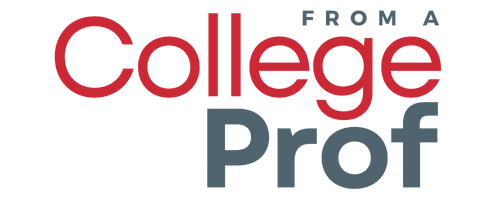
75 Top Motivational Quotes for Exam Confidence and Focus

Achieve exam success with motivational quotes and proven study techniques. Be inspired by timeless words of wisdom to overcome fear, challenges and self-doubt as a student. Plus, learn how to strike a balance between hard work and self-care when you’re studying.
Some of the links below are affiliate links. At no additional cost to you, we earn a commission if you click through and make a purchase. We appreciate your support.
Feeling overwhelmed by upcoming exams? Struggling to stay motivated and focused while studying?
You’re not alone.
Exams are, by far, the biggest source of stress for college students. In 2022, the American Addiction Center asked college students about the most stressful things in their lives. Over 89% said exams.
Tests are a reality of college life, and they’re not going away. I give exams to my students as one way for them to demonstrate learning and understanding.
But I’m very aware of the anxiety that comes with those necessary exams. Around midterms and finals, the increased stress on campus is palpable.
So what can you do?
- Take care of yourself. Check out our list of science-backed self care strategies if you need some ideas.
- Ask for help if you need it. Check in with your professors, study with other students or hire a tutor if you need one.
- Find ways to stay motivated. Keeping some inspiring quotes visible is a small but effective way to boost your confidence.
Motivational quotes can help you stay on track.
They can shift your mindset from self-doubt to determination and perseverance. The wisdom of others who found success through focus and dedication can encourage you to keep pushing forward.
The Power of Motivation
In a broad sense, motivation is the reason behind our behaviors. It’s what pushes us to achieve our goals and fulfill our dreams.
Without motivation, moving forward and staying focused can be really difficult. When we lack the drive to succeed, it’s hard to achieve our goals.
You’ve heard of intrinsic and extrinsic motivation. But how well do you understand your own motivation?
Some people are motivated intrinsically by personal things like values, interests, beliefs or enjoyment. Others are motivated extrinsically by rewards, recognition or support.
When you understand what motivates you, you can tap into that motivation and stay focused on your goals.
If you want to dig into this a little more, we recommend Gretchen Rubin’s The Four Tendencies.

What if you understood why you respond to expectations in a certain way and what motivates you? The 4 tendencies framework can honestly be life-changing.
Role of Motivation in Exams
Motivation to prepare for exams plays a crucial role in your success as a college student. It can help you stay focused, overcome challenges and maintain a positive mindset.
Decades of research have identified different activities as evidence of academic motivation :
- Persistence
- Learning challenging, difficult and novel tasks
- Paying attention
- Planning and monitoring
Having exam motivation means that you’re willing to put in the time and effort required to succeed. And the studies I just mentioned can help you understand what “staying motivated” really looks like.
Curiosity – Find something (anything!) interesting or fascinating about what you’re studying.
Persistence – Remember times in your life when you felt like quitting and how accomplished you felt when you refused to give up.
Learning – Break things down into manageable chunks of information.
Paying attention – Do something that helps you focus. Listen to music, study in the library or a coffee shop, take short breaks and move your body.
Connection – Make specific connections between what you already know and what you’re trying to learn, memorize or understand.
Planning and monitoring – Set specific, achievable study goals. Celebrate when you meet each goal.

Imagine listening to music that is scientifically tested to help your brain focus or relax.
Brain.fm's science-first approach creates music that sounds different and affects your brain differently than any other music.
We listen to a variety of music genres and nature soundscapes!
The Impact of Motivational Quotes
There’s nothing like that boost of inspiration that comes from a great quote. And we know you’ll take all the inspiration you can get when you’re studying for a big exam.
#MondayMotivation on Instagram has over 32 MILLION posts.
(Just trust us on that massive number – no time to lose yourself in a black hole of social media scrolling. You have studying to do!)
Motivational sayings are effective because they’re short bits of wisdom. Research from Cornell University suggests that quotes are memorable when they’re distinctive (less common word choices) and general (can apply to new contexts).
The quotes we’re sharing won’t guarantee an A at exam time, but they can definitely encourage you to stay focused and positive.
How to Maximize Your Favorite Quotes
One of the best ways to use motivational quotes is to keep them front and center. Reading them here and then forgetting them isn’t helpful for the long term.
Try these ideas to maximize the benefits of your favorite quote:
- Make it your laptop background or your phone’s lock screen
- Share it on social media
- Write it on a post-it note and put it near your study space or on your mirror
- Put the quote on a sticker, journal or coffee mug
The Importance of Hard Work
Hard work is foundational to achieving success. It’s not a guarantee, but you’re much more likely to achieve your goals when you put in the time and effort .
You’ve heard about the value of hard work for years from a parent or other family member, mentors, teachers, coaches, managers and more. And it’s obvious that you DO work hard or you wouldn’t be in college, studying for exams.
But hard work isn’t just about the number of hours and hustle. It’s also about working smart.
It’s discipline, focus and consistency.
The difference between successful and unsuccessful people isn’t talent or ability. The difference is willingness to do the work.
Motivational Quotes About Hard Work
Studying for exams is stressful and exhausting, but it’s a necessary evil to get the results you want. Need a little motivation to remind you that your hard work is worth it?
These quotes can help.
- The fruit of your own hard work is the sweetest. – Deepika Padukone
- The price of success is hard work, dedication to the job at hand, and the determination that whether we win or lose, we have applied the best of ourselves to the task at hand. – Vince Lombardi
- You are capable of more than you know. Choose a goal that seems right for you and strive to be the best, however hard the path. – E. O. Wilson

- I find that the harder I work, the more luck I seem to have. – Thomas Jefferson
- Genius is one percent inspiration and ninety-nine percent perspiration. – Thomas Edison
- I believe that fortitude is key. More than anything, be consistent. Go at it. Go at it. Go at it. – Antonia Novello
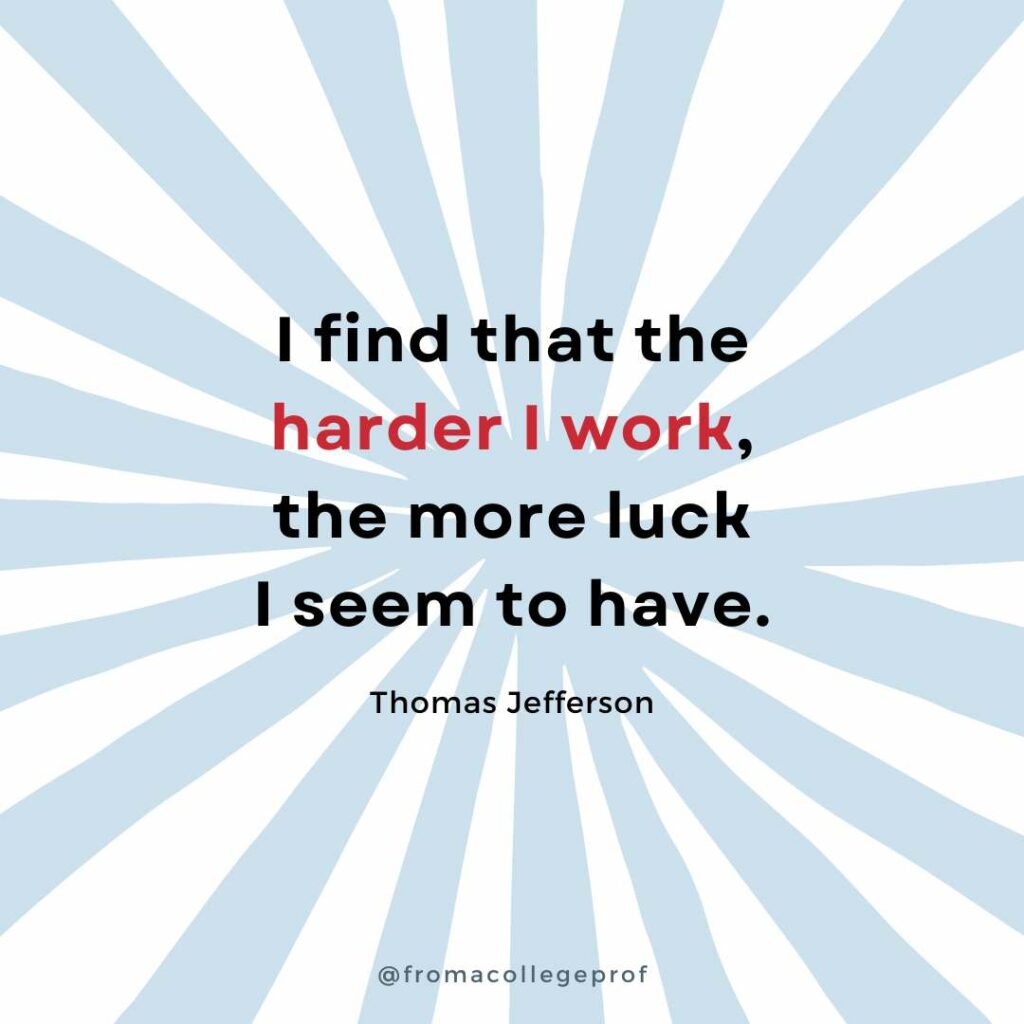
- If you want something you’ve never had before, you’ve got to do something you’ve never done before. – Coco Chanel
- The difference between try and triumph is just a little umph! – Marvin Phillips
- I’m always asked, ‘What’s the secret to success?’ But there are no secrets. Be humble. Be hungry. And always be the hardest worker in the room. – Dwayne Johnson

- Success is no accident. It is hard work, perseverance, learning, studying, sacrifice, and most of all, love of what you are doing or learning to do. – Pelé
- Do. The. Work. Every day, you have to do something you don’t want to do. Every day. Challenge yourself to be uncomfortable, push past the apathy and laziness and fear. – Tim S. Grover
- The only place where success comes before work is in the dictionary. – Vidal Sassoon
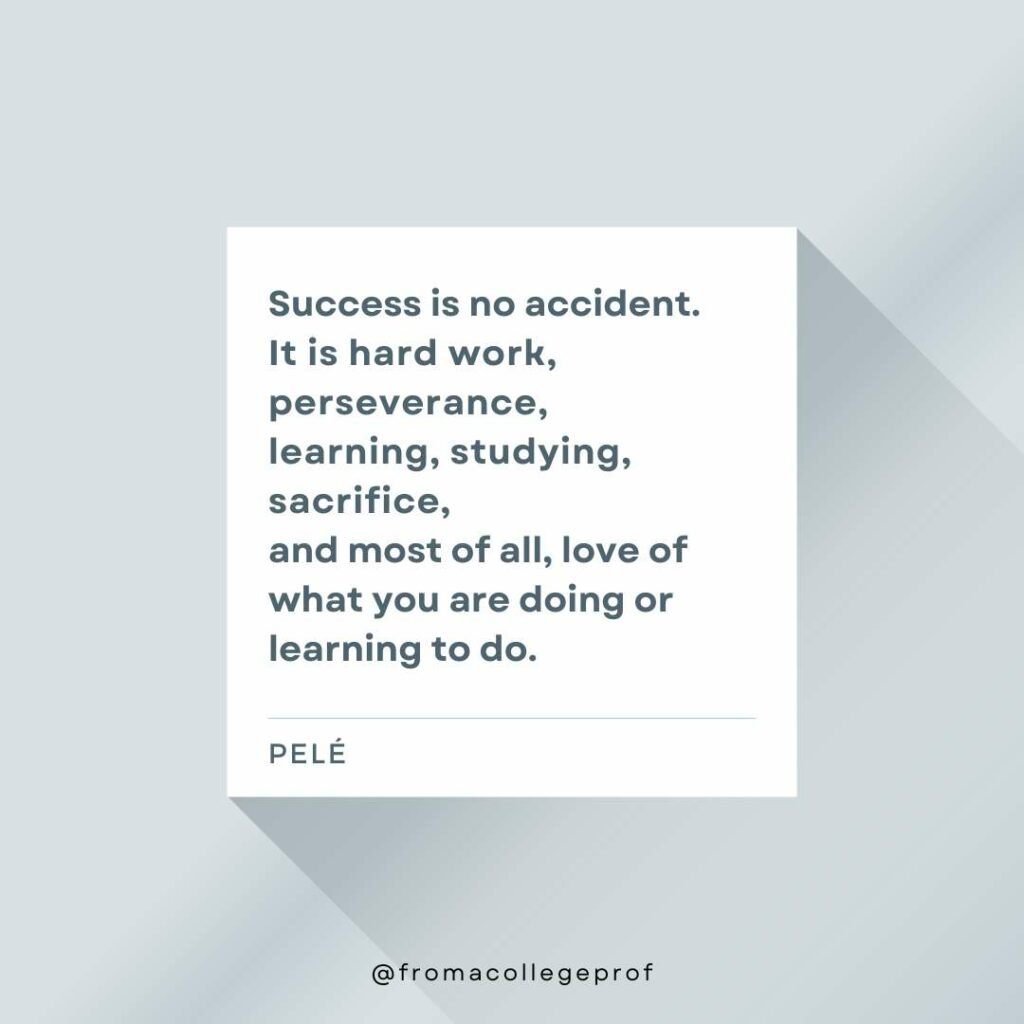
- Opportunities are usually disguised as hard work, so most people don’t recognize them. – Ann Landers
- Hard work spotlights the character of people: some turn up their sleeves, some turn up their noses, and some don’t turn up at all. – Sam Ewing
- The only way to enjoy anything in this life is to earn it first. – Ginger Rogers
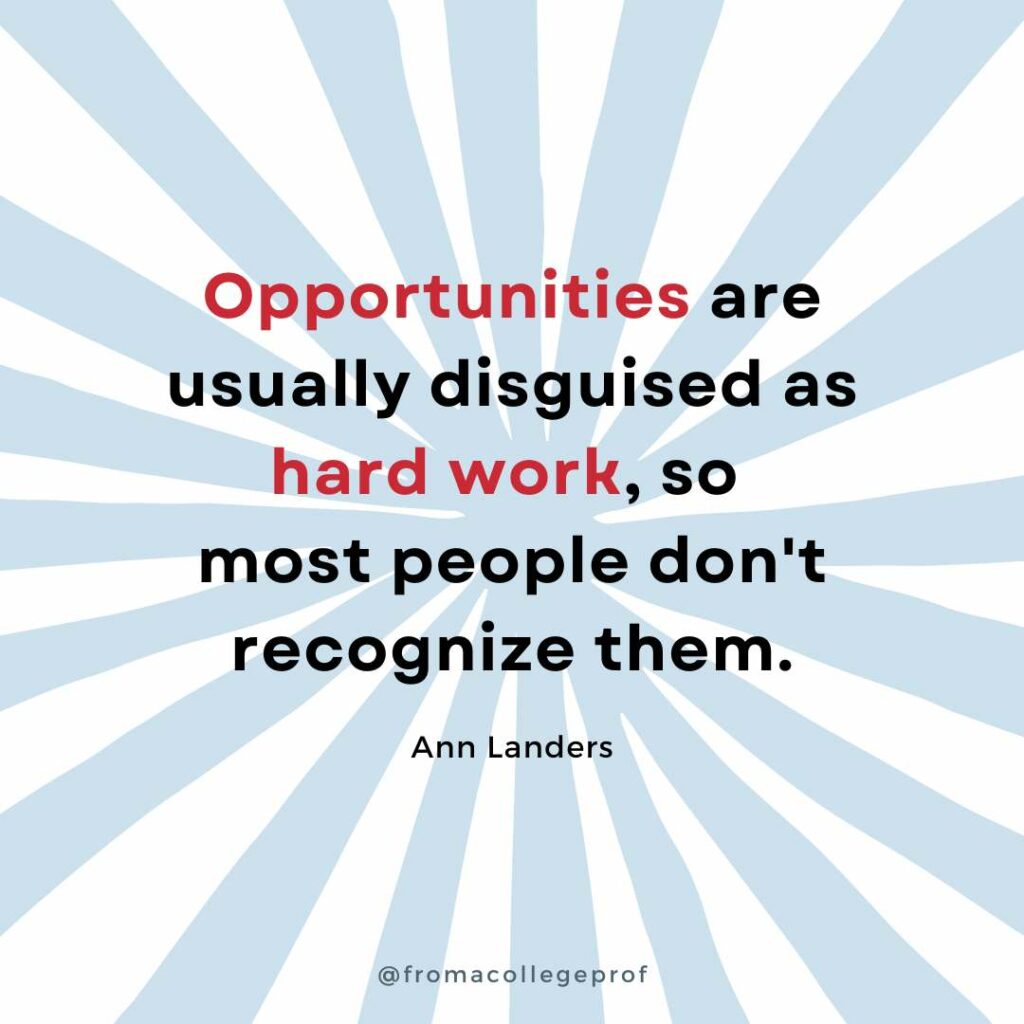
Study Smarter, Not Harder
Yes, we just spent the previous section talking about the importance of hard work. But hard work alone isn’t going to get you closer to your goals.
You don’t have endless hours in the day and there’s so much more to life than studying! You need a plan or strategy.
With the right mindset and study techniques, you can master the art of studying and use your time well.
You can retain information and improve exam performance when you figure out the best study techniques for you.
The way you learn and study best may look very different from how your roommates or friends learn. That’s normal and expected.
You also may find that your go-to study techniques in high school just aren’t cutting it in college.
I often tell my students to go back to basics like:
Use pen and paper. Research shows that writing the information by hand improves retention .
- Ditch the laptop for taking notes and try a notebook instead
- Make your own flashcards on actual, physical index cards instead of using an app
Practice active reading. Try these strategies from Princeton .
- Ask questions and make notes in the margins.
- Write brief summaries of what you read.
- Create charts or diagrams or concept maps.
Test yourself. Research shows that self-testing is significantly related to student achievement .
- Use your flashcards to test yourself. Don’t just read through them.
- Find practice quizzes or tests online or ask your professor.
Motivational Quotes About Studying Smarter
Here are some of the best quotes about studying:
- The best way to predict your future is to create it. – Abraham Lincoln
- We must all suffer one of two things: the pain of discipline or the pain of regret or disappointment. – Jim Rohn
- If you can’t fly then run, if you can’t run then walk, if you can’t walk then crawl, but whatever you do you have to keep moving forward. – Martin Luther King, Jr.
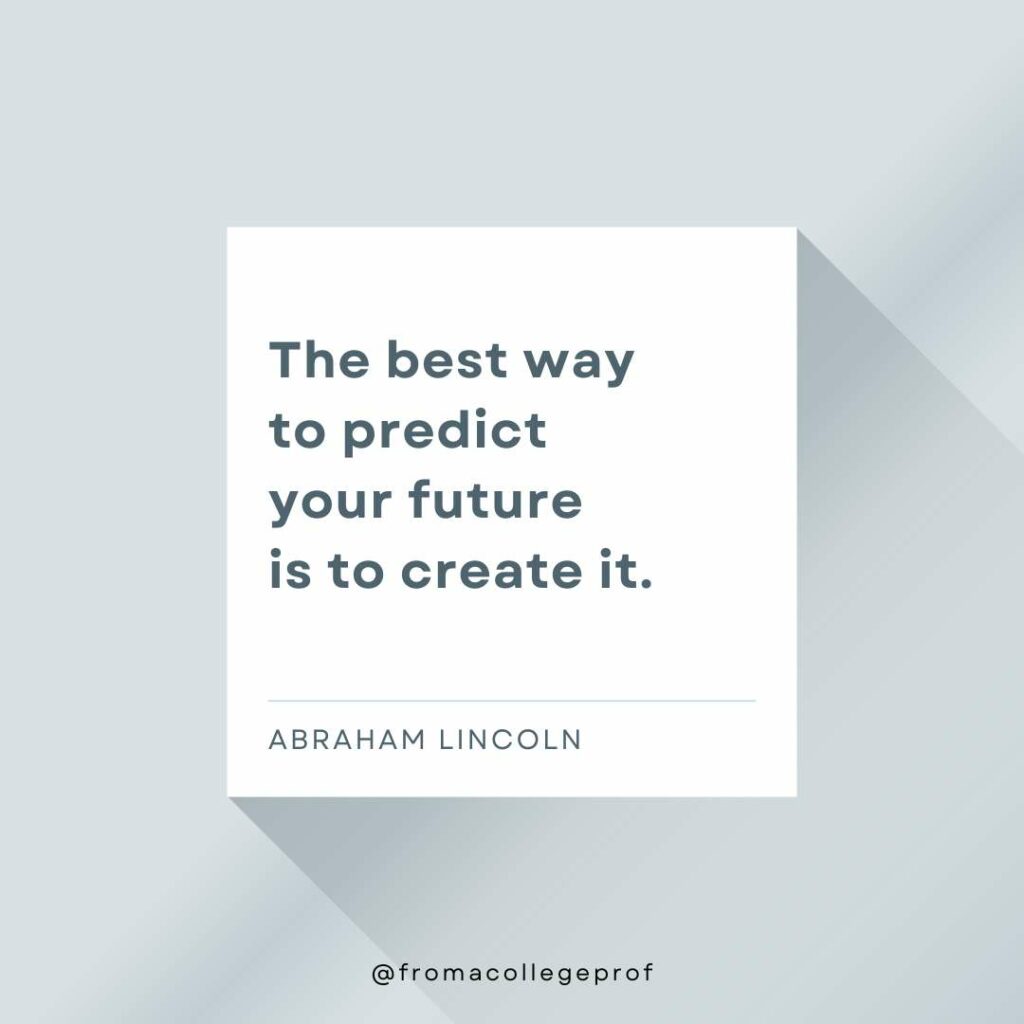
- Study while others are sleeping; work while others are loafing; prepare while others are playing; and dream while others are wishing. – William Arthur Ward
- Study hard in the beginning so you can relax later. – Proverb
- You learn to speak by speaking, to study by studying, to run by running, to work by working. – Anatole France
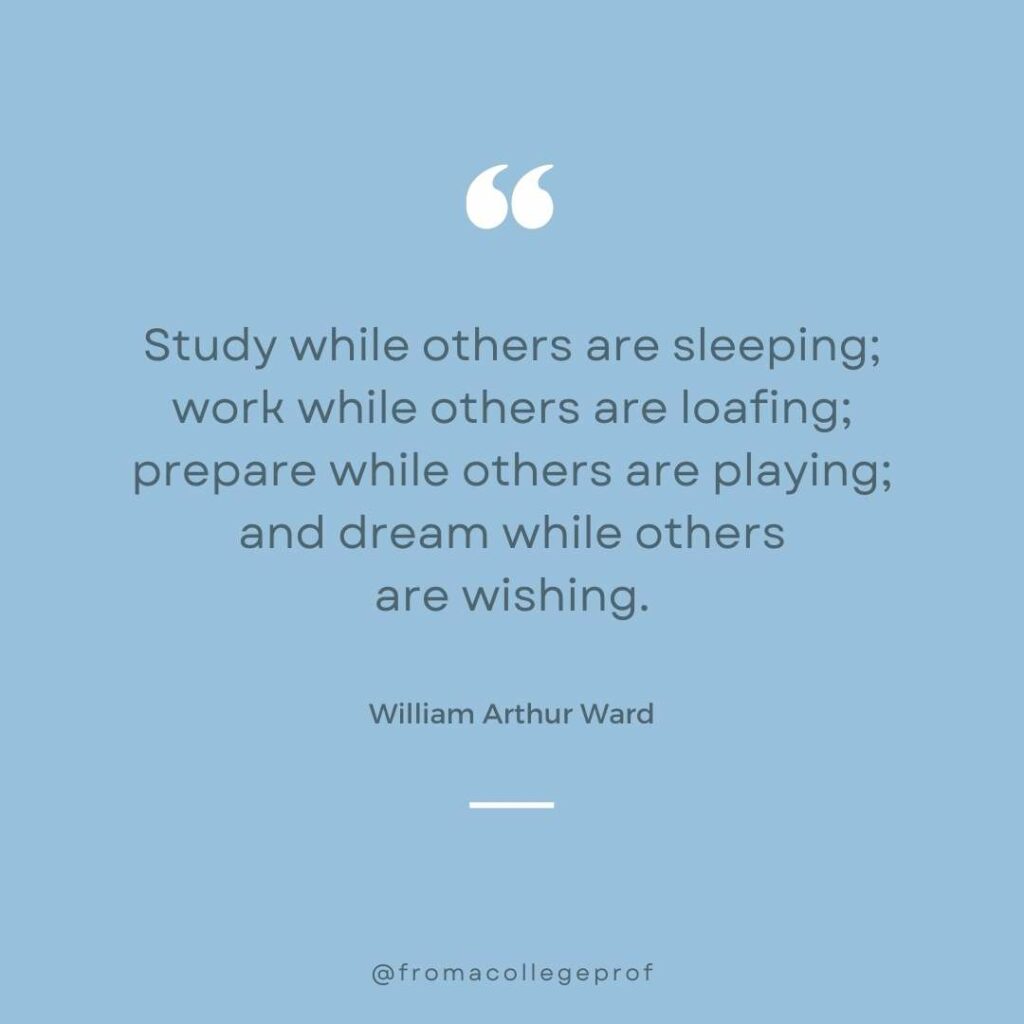
- Keep the flame of curiosity and wonderment alive, even when studying for boring exams. That is the well from which we scientists draw our nourishment and energy. And also, learn the math. Math is the language of nature, so we have to learn this language. – Michio Kaku
- The difference between ordinary and extraordinary is that little extra. – Jimmy Johnson
- Believe in yourself and all that you are. Know that there is something inside you that is greater than any obstacle. – Christian D. Larson
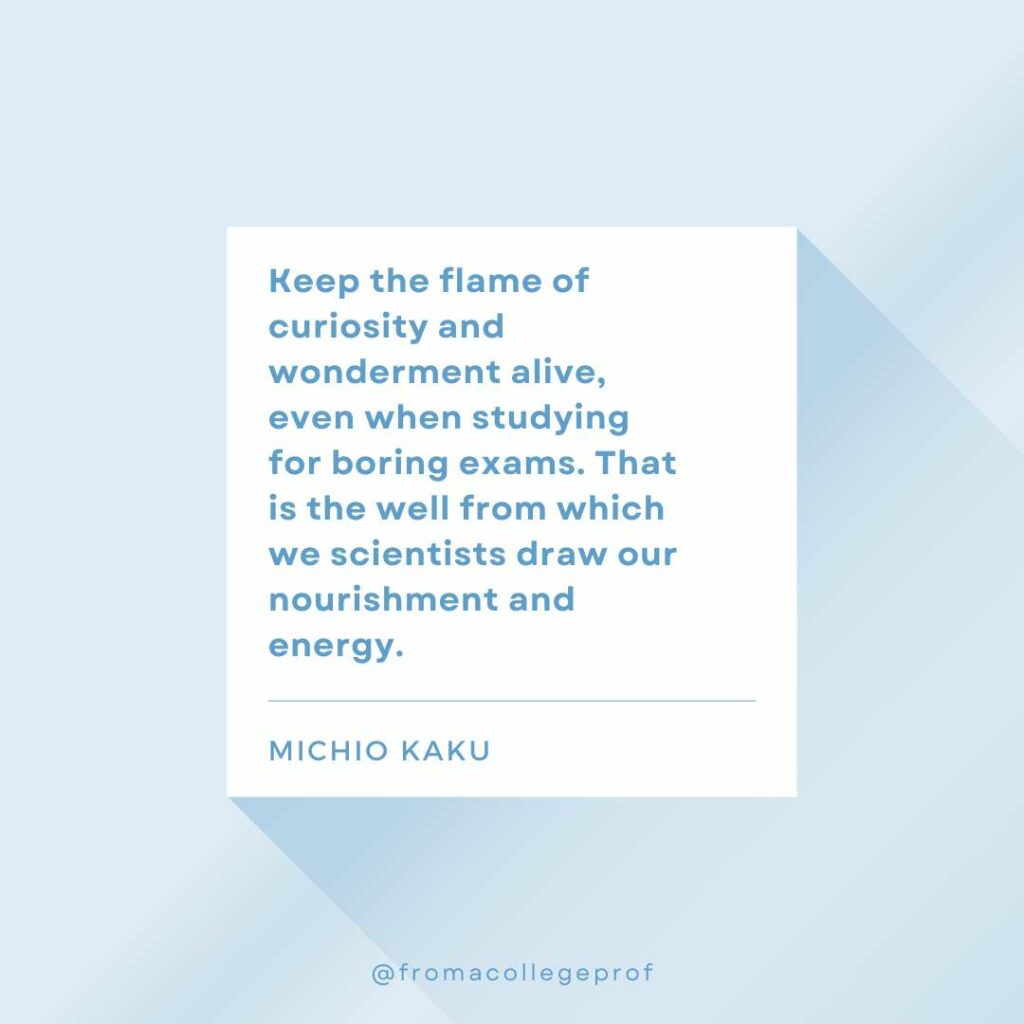
- You have within you right now, everything you need to deal with whatever the world can throw at you. – Brian Tracy
- If you don’t like something, change it. If you can’t change it, change your attitude. – Maya Angelou
- What lies behind you and what lies in front of you, pales in comparison to what lies inside of you. – Ralph Waldo Emerson
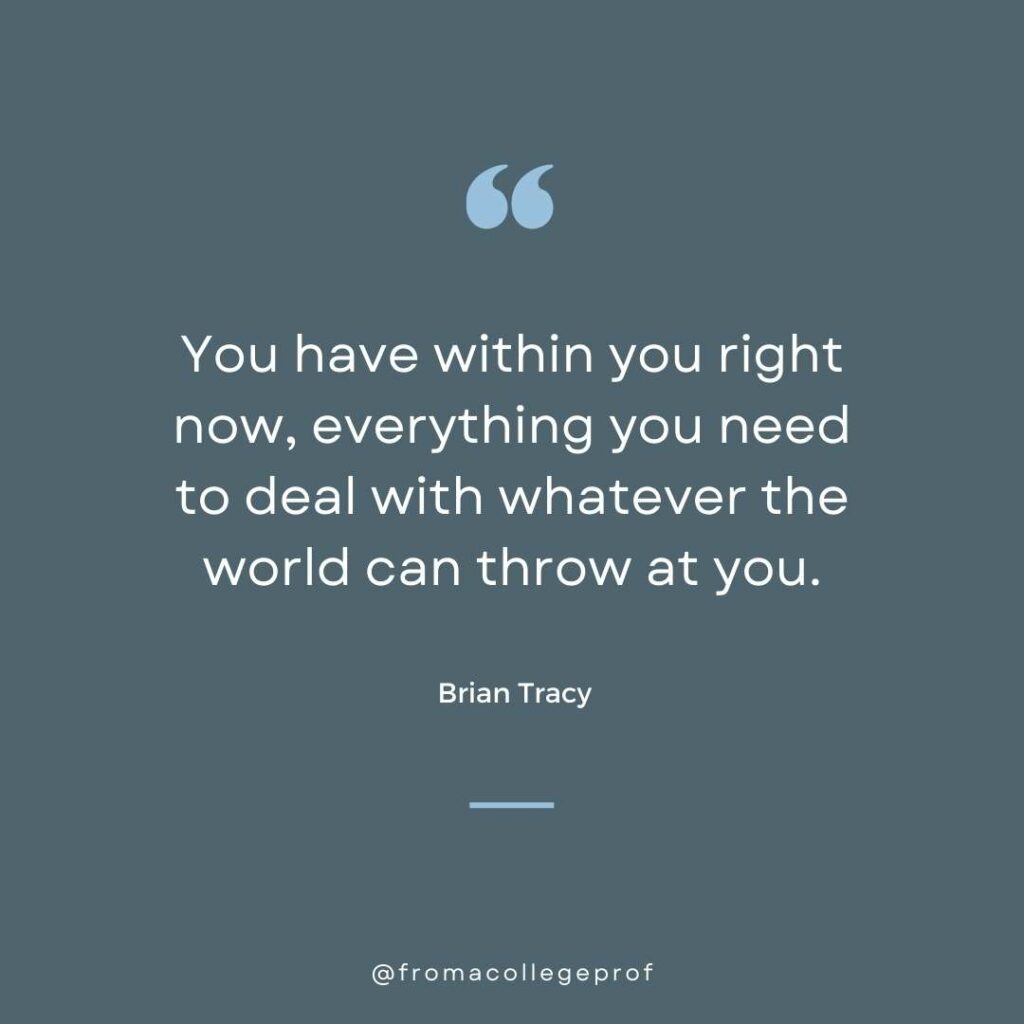
- Always make the choice to learn. What Princeton taught me was whatever mess you are studying, pull a thread with great persistence ’til you have clarity of thought. Princeton taught me how to solve a problem. How to think – that’s what we pull out of this place. – Maria Ressa
- Trust yourself, you know more than you think you do. – Benjamin Spock
- Never regard study as a duty but as an enviable opportunity to learn to know the liberating influence of beauty in the realm of the spirit for your own personal joy and to the profit of the community to which your later works belong. – Albert Einstein
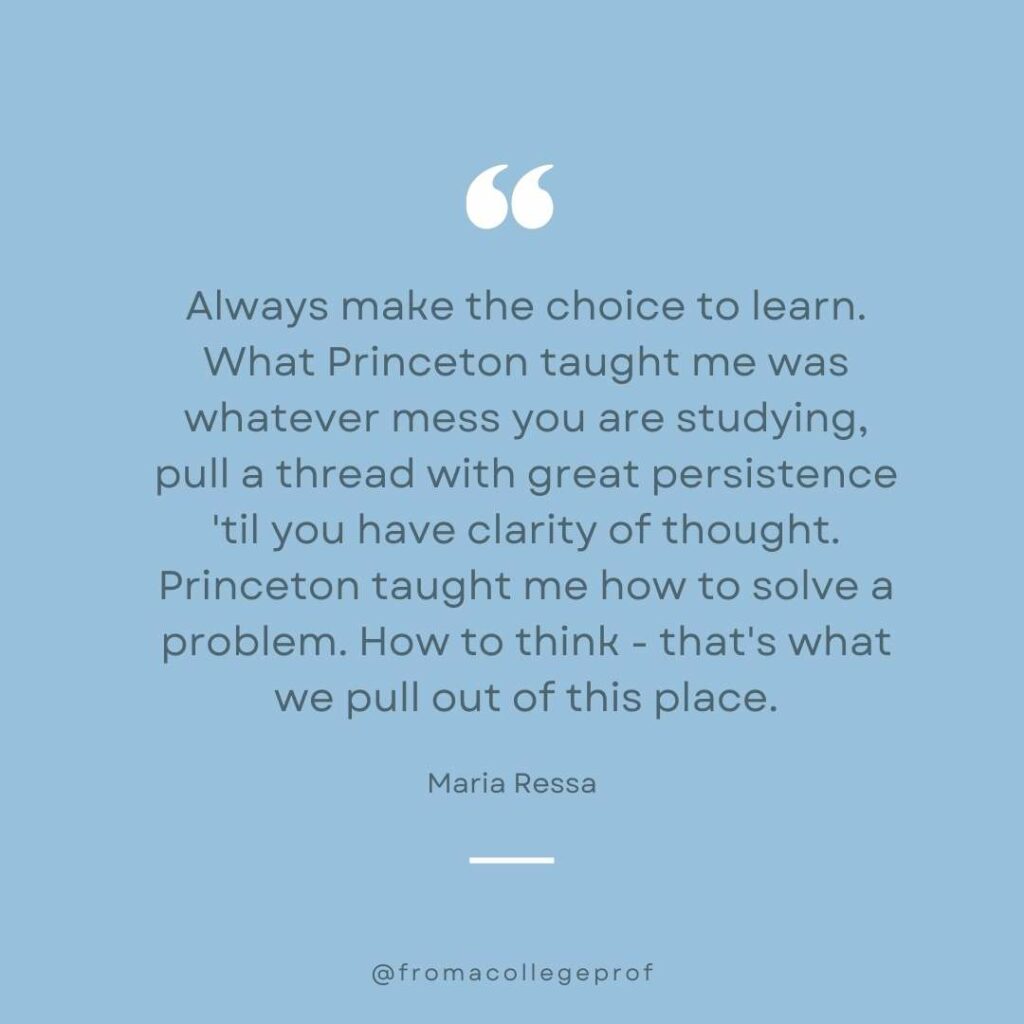
- Before anything else, preparation is the key to success. – Alexander Graham Bell
- Education is transformational. It changes lives. That is why people work so hard to become educated and why education has always been the key to the American Dream, the force that erases arbitrary divisions of race and class and culture and unlocks every person’s God-given potential. – Condoleezza Rice
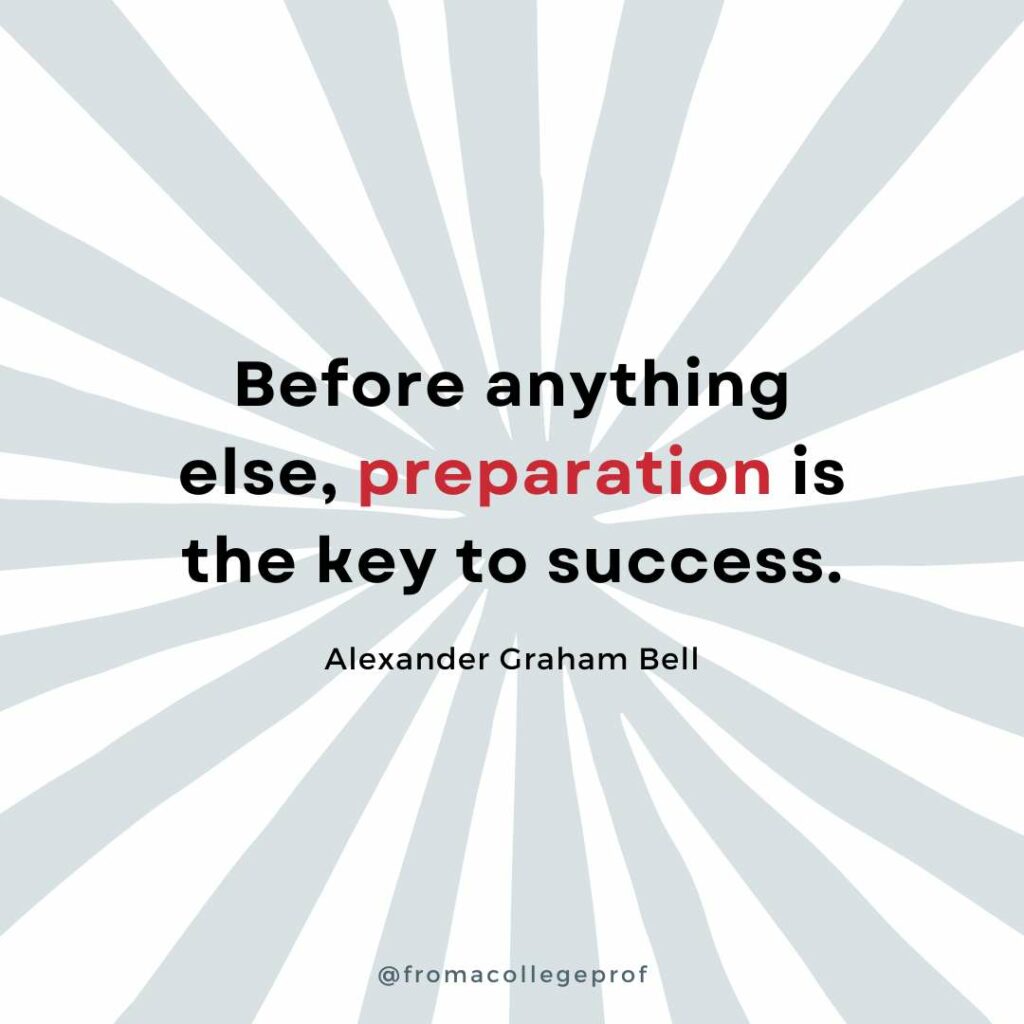
Balance Exam Success & Self-Care
Studying for exams can be stressful, especially if it’s midterms or final exams. You may think you don’t have enough time for anything else, but you do.
This college prof is here to remind you to find a balance between studying and taking care of yourself. To ace your exams, you need to show up as the best version of yourself.
Running on snacks and caffeine isn’t good for you, and it’s definitely not sustainable.
Check out our list of self-care strategies .
Study Quotes About Success & Self-Care
Remember to keep these quotes where you can see them.
- Success is not the key to happiness. Happiness is the key to success. If you love what you are doing, you will be successful. – Albert Schweitzer
- The only way to do great work is to love what you do. If you haven’t found it yet, keep looking. Don’t settle. As with all matters of the heart, you’ll know when you find it. – Steve Jobs
- I don’t love studying. I hate studying. I like learning. Learning is beautiful. – Natalie Portman
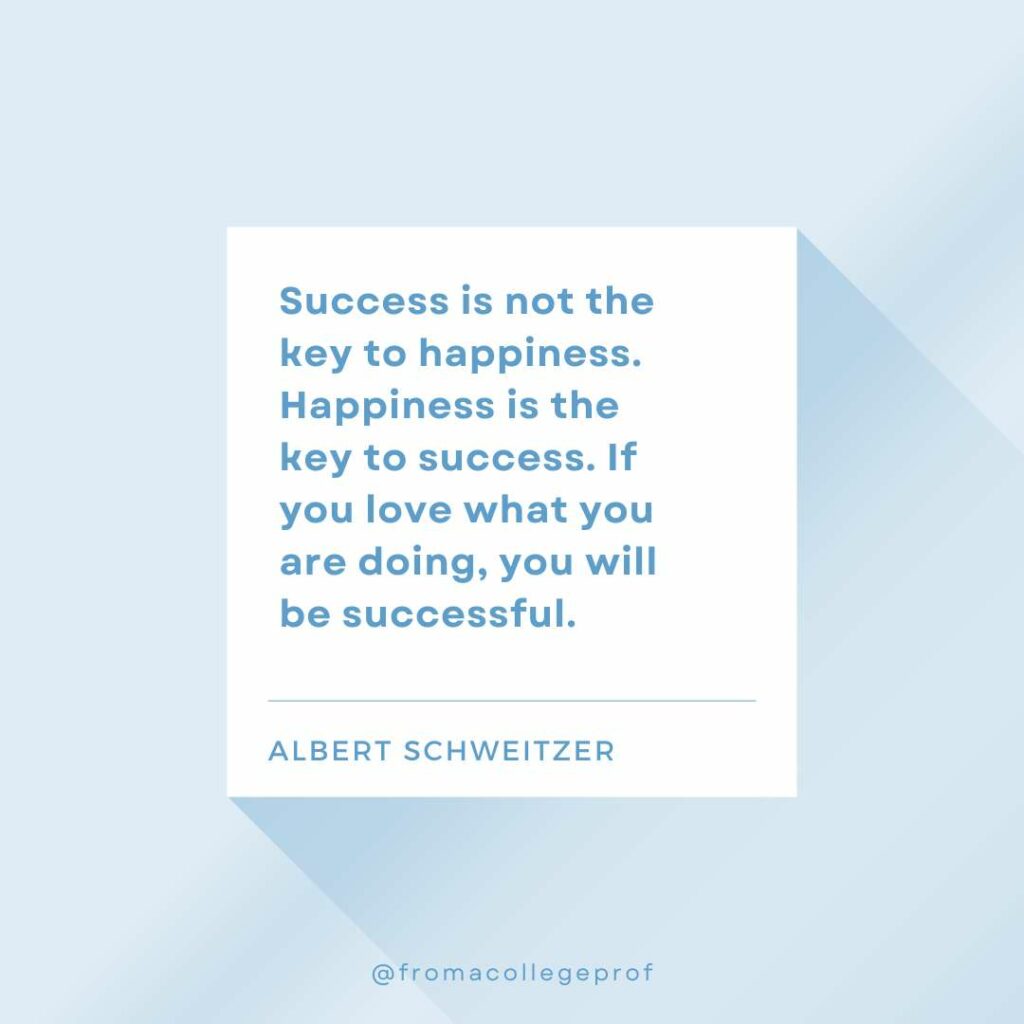
- The greatest weapon against stress is our ability to choose one thought over another. – William James
- Stress is caused by being ‘here’ but wanting to be ‘there.’ – Eckhart Tolle
- Success is the sum of small efforts, repeated day in and day out. – Robert Collier

- The secret of success is to do the common things uncommonly well. – James D. Rockefeller
- Success is not how high you have climbed, but how you make a positive difference to the world. – Roy T. Bennett
- If you want to live a happy life, tie it to a goal, not to people or things. – Albert Einstein
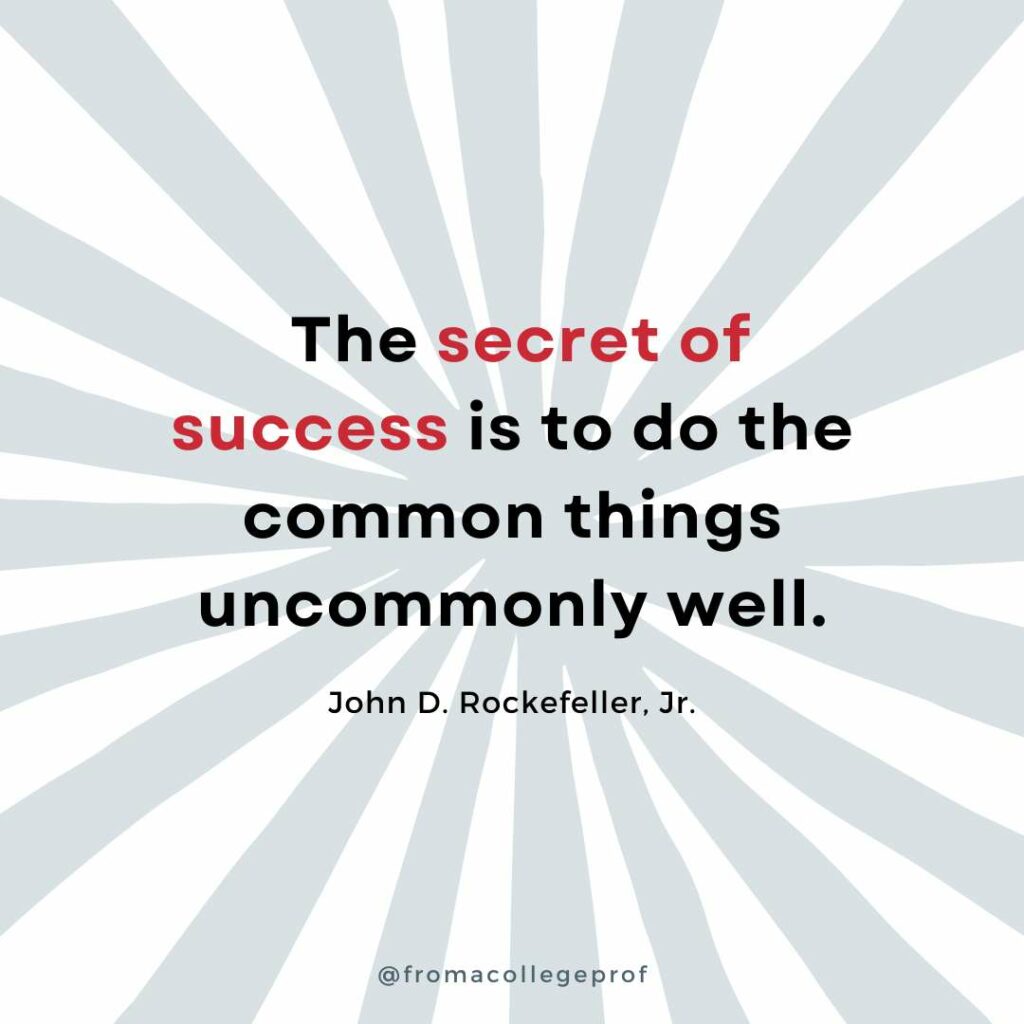
- It does not matter how slowly you go as long as you do not stop. – Confucius
- When you have confidence, you can have a lot of fun. And when you have fun, you can do amazing things. – Joe Namath
- You are the only person on earth who can use your ability. – Zig Ziglar
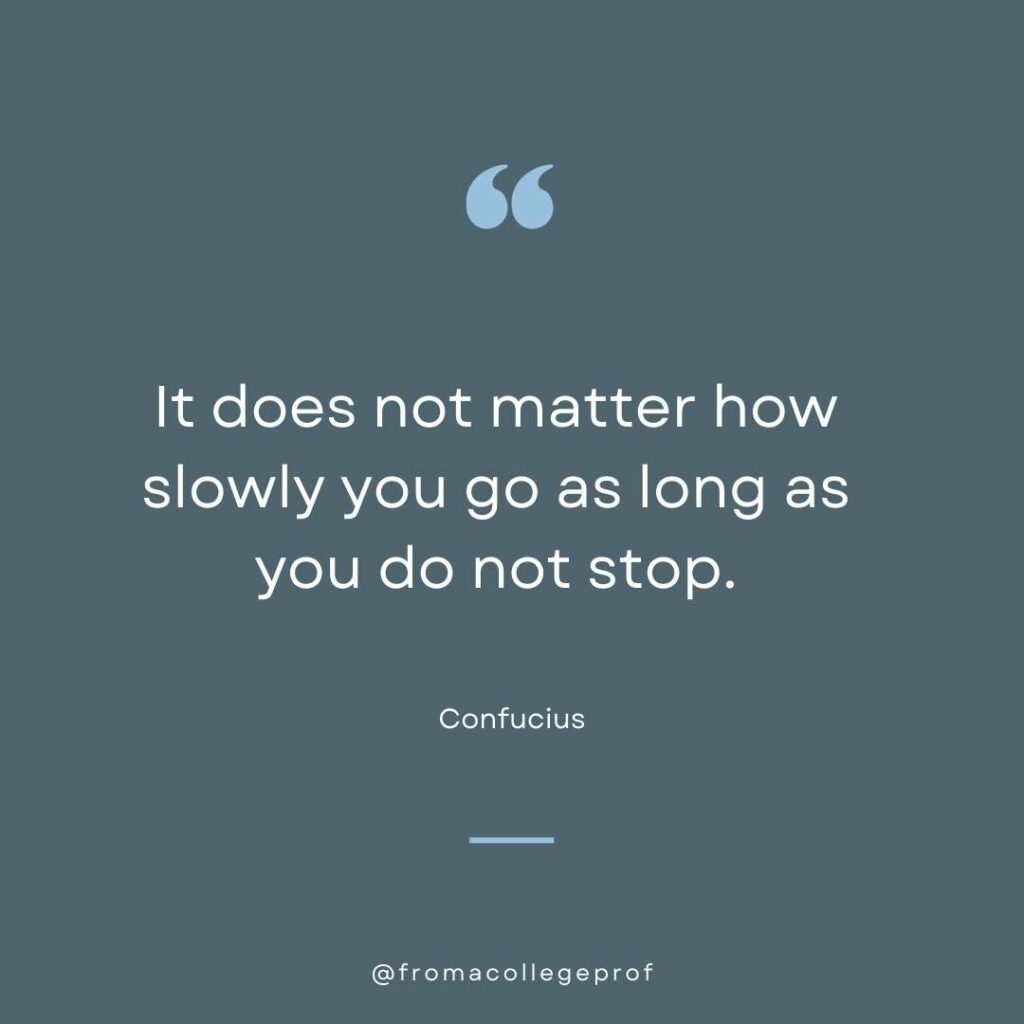
Deal With Fear About Exams
You wouldn’t be human if you didn’t feel nervous before an exam. It’s normal.
The trick is to harness that nervous energy to help you stay motivated and focused. Make a study schedule, use the study techniques we discussed above and take care of yourself.
The better prepared you are, the more confidence (and fewer nerves) you’ll have.
These quotes can help!
(Test anxiety is a different story. The Mayo Clinic offers some tips to overcome it. You should also consider talk therapy with a licensed counselor and/or find out what resources your school’s learning center offers.)
Exam Study Quotes About Fear
- Whether you think you can, or you think you can’t – you’re right. – Henry Ford
- You don’t have to be great to start, but you have to start to be great. – Zig Ziglar
- Nothing is impossible, the word itself says ‘I’m possible’! – Audrey Hepburn

- Don’t be afraid to give up the good to go for the great. – John D. Rockefeller
- Be faithful in small things because it is in them that your strength lies. – Mother Teresa
- The only limit to our realization of tomorrow will be our doubts of today. – Franklin D. Roosevelt
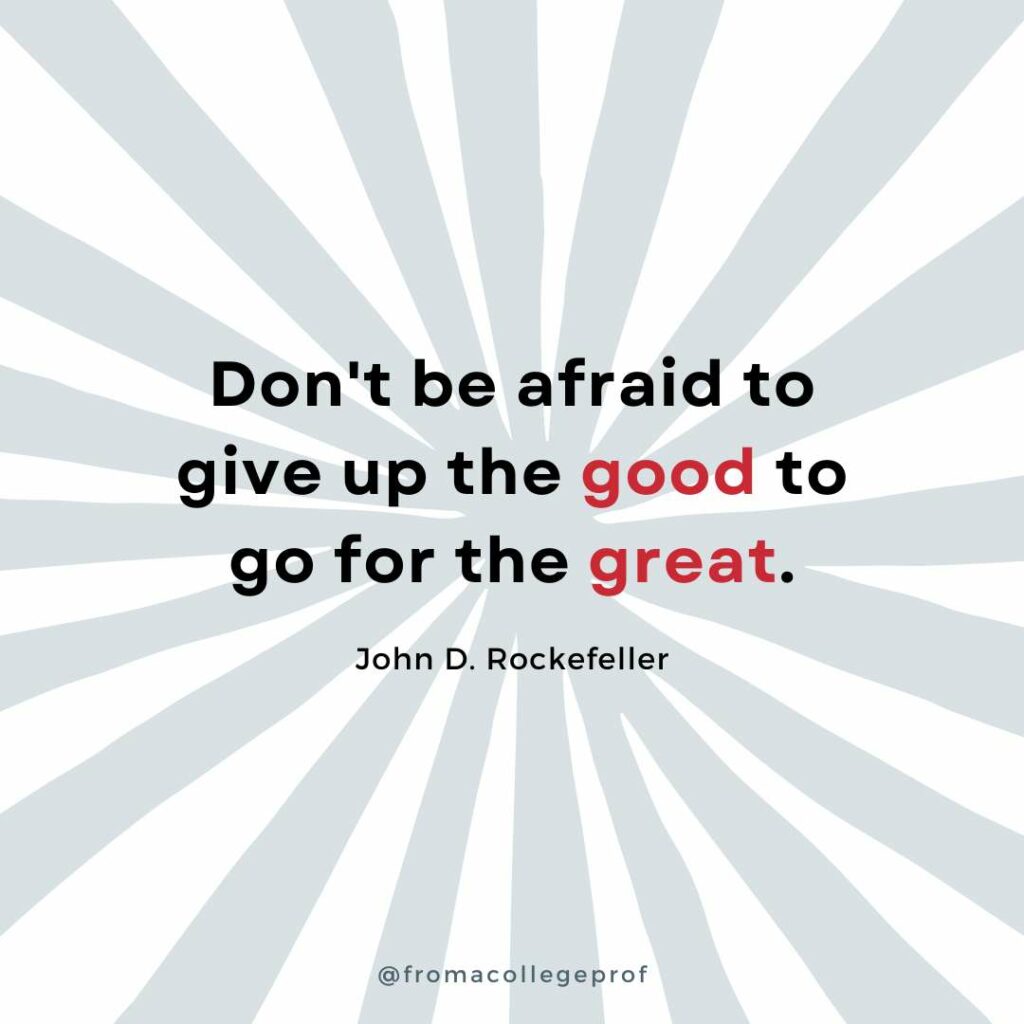
- Don’t let your fear of what could happen make nothing happen. – Doe Zantamata
- Fear is only as deep as the mind allows. – Japanese Proverb
- Don’t be pushed around by the fears in your mind. Be led by the dreams in your heart. – Roy T. Bennett
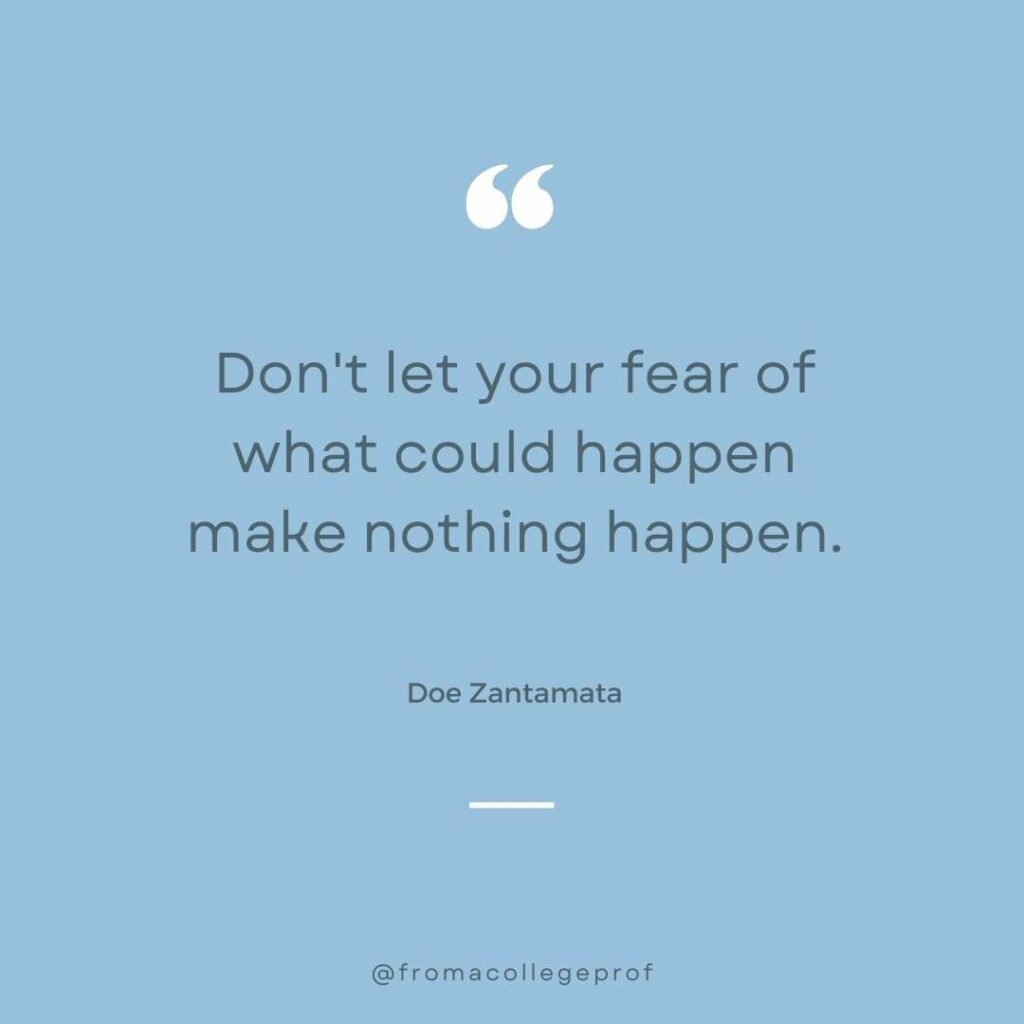
- Fear is a reaction. Courage is a decision. – Winston Churchill
- Believe you can and you’re halfway there. – Theodore Roosevelt
- Optimism is the faith that leads to achievement. Nothing can be done without hope and confidence. – Helen Keller
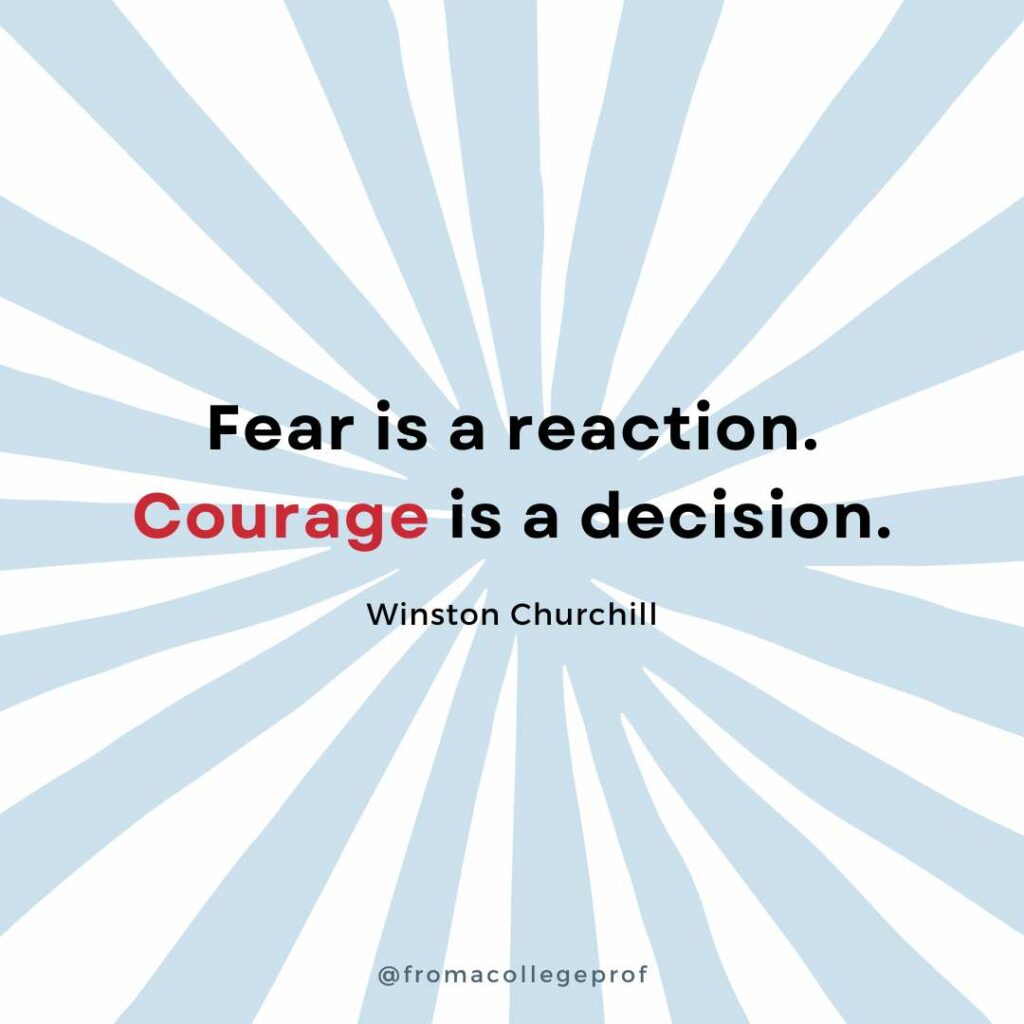
- You have to believe in yourself when no one else does. – Serena Williams
- Believe in yourself, take on your challenges, dig deep within yourself to conquer fears. Never let anyone bring you down. You got this. – Chantal Sutherland
- Attitude determines the altitude of life. – Edwin Louis Cole
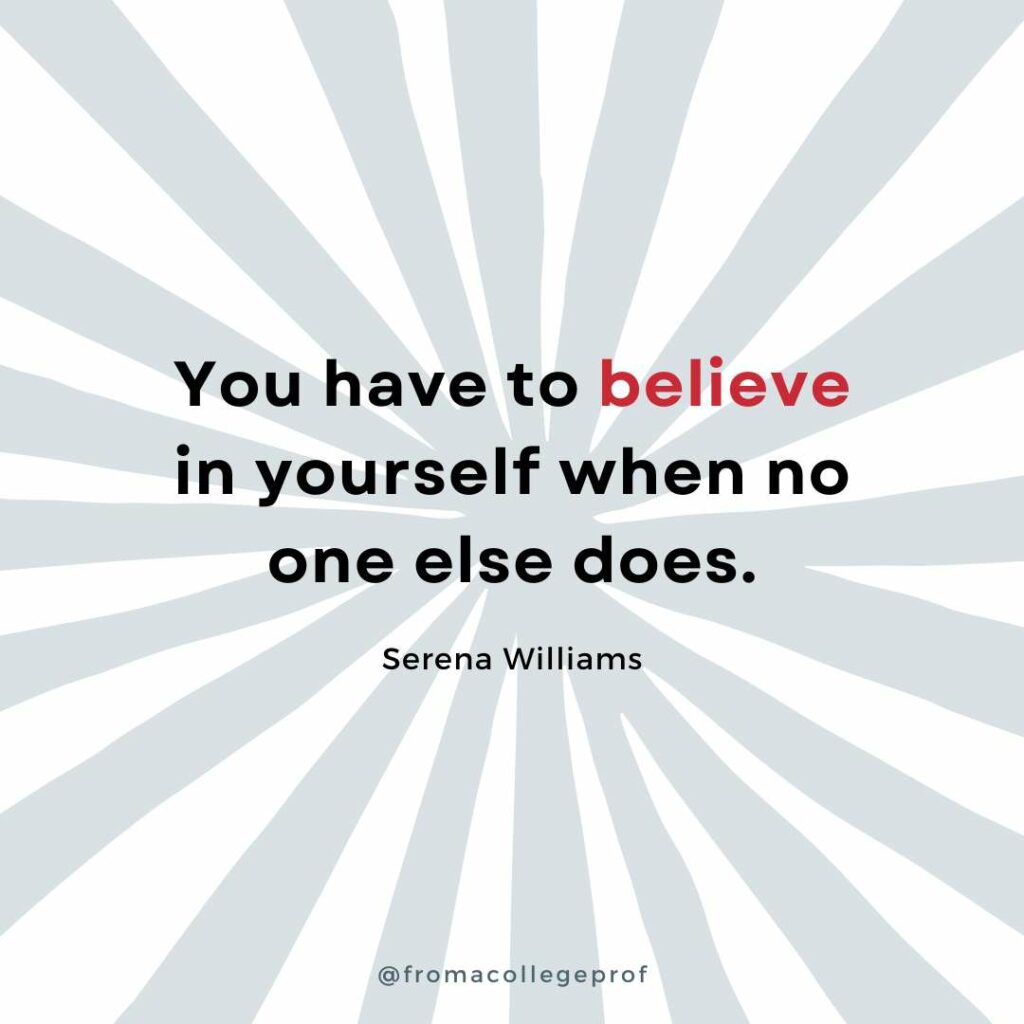
Overcome Fear of Failure
Failure is inevitable. If you can learn from it, failure can be motivating rather than debilitating.
Now here’s the hard part: learning from failure requires self-reflection and correction.
You have to be willing to reflect on your mistakes and understand what went wrong. Then you have to use that knowledge to correct and improve the next time.
If you’ve failed a recent exam or if you’re afraid of failing an exam or a class, it can be hard to push forward and stay motivated. Make sure you’re using healthy coping strategies !
Motivational Study Quotes About Overcoming Failure
Here are some motivational study quotes to help you overcome the fear of failure:
- Success is not measured by what you accomplish, but by the opposition you have encountered, and the courage with which you have maintained the struggle against overwhelming odds. – Orison Swett Marden
- There are no secrets to success. It is the result of preparation, hard work, and learning from failure. – Colin Powell
- I’ve failed over and over and over again in my life. And that is why I succeed. – Michael Jordan
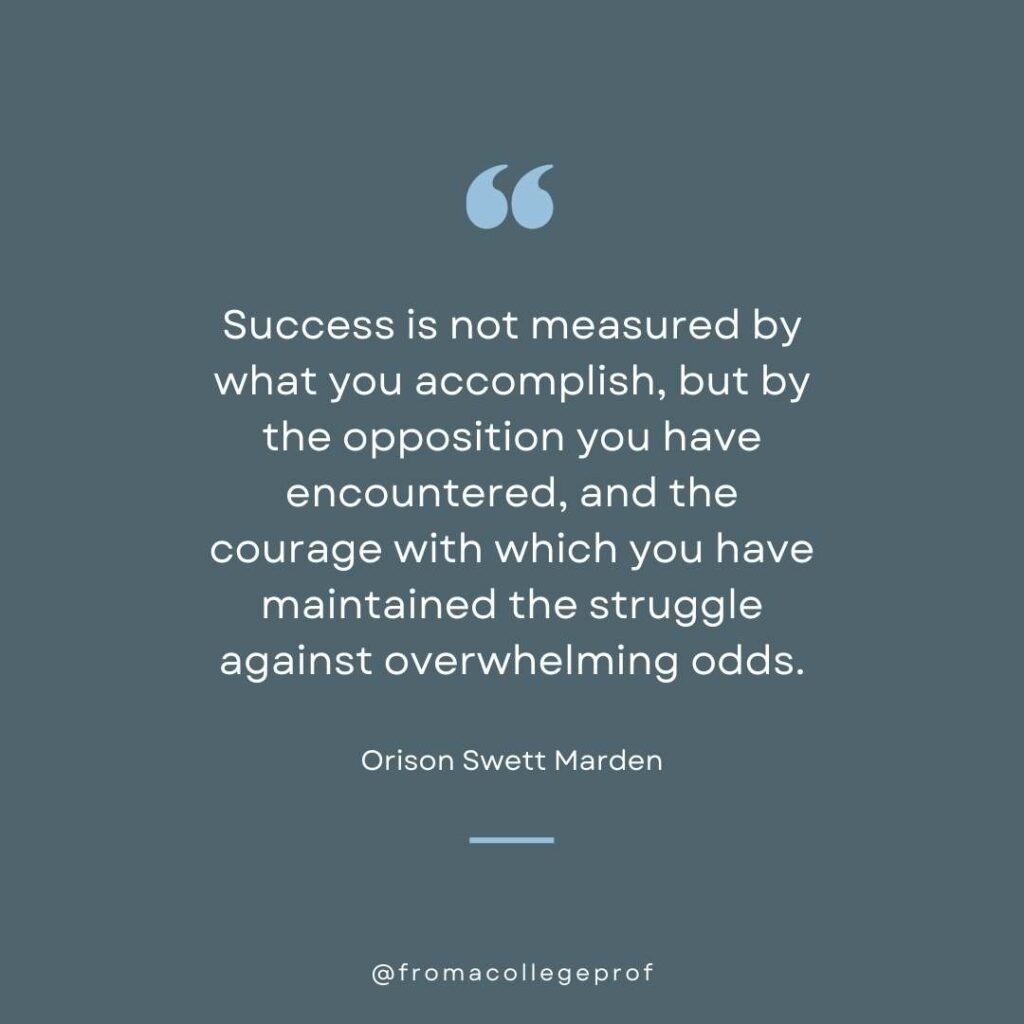
- You gain strength, courage and confidence by every experience in which you really stop to look fear in the face. You are able to say to yourself, ‘I have lived through this horror. I can take the next thing that comes along.’ You must do the thing you think you cannot do. – Eleanor Roosevelt
- I have not failed. I’ve just found 10,000 ways that won’t work. – Thomas Edison
- Failure is only the opportunity to begin again, this time more intelligently. – Henry Ford
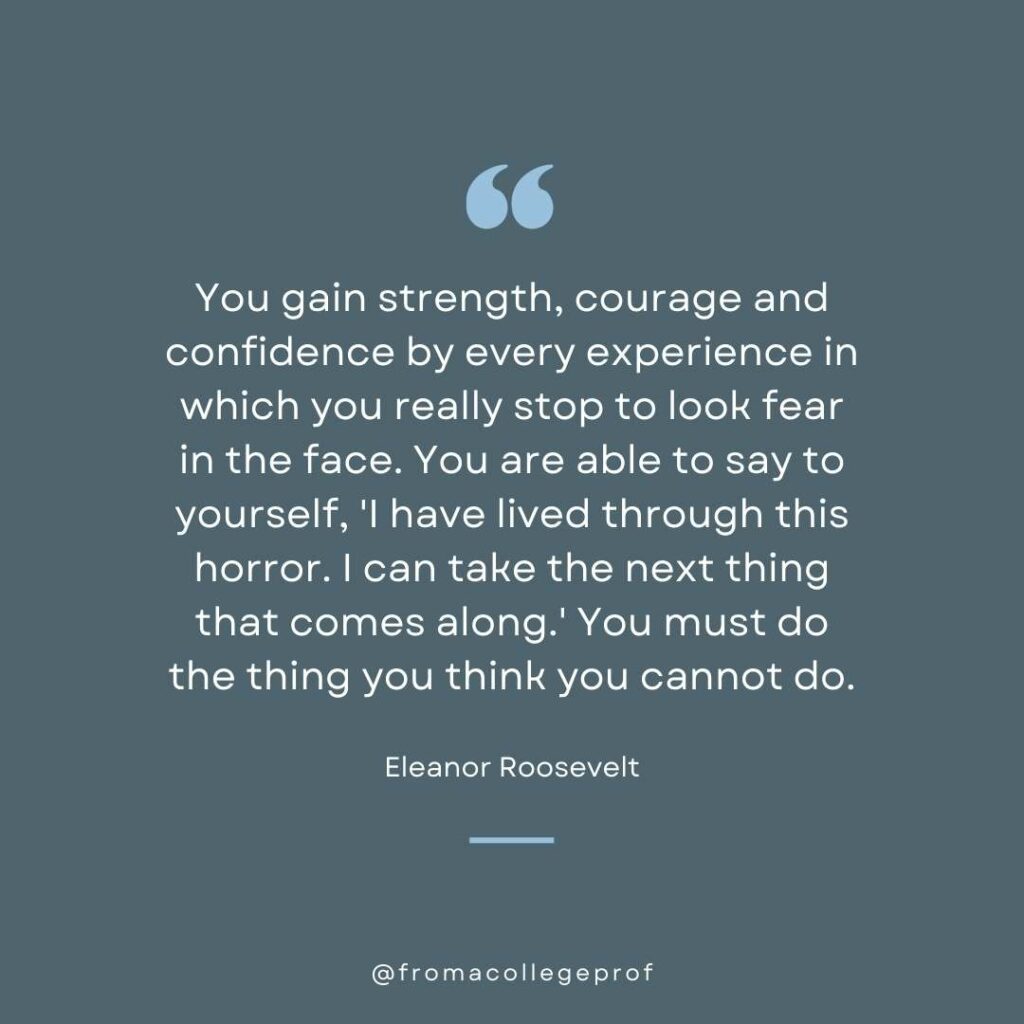
- Success is stumbling from failure to failure with no loss of enthusiasm. – Winston Churchill
- The difference between average people and achieving people is their perception of and response to failure. – John Maxwell
- Satisfaction lies in the effort, not in the attainment, full effort is full victory. – Mahatma Gandhi
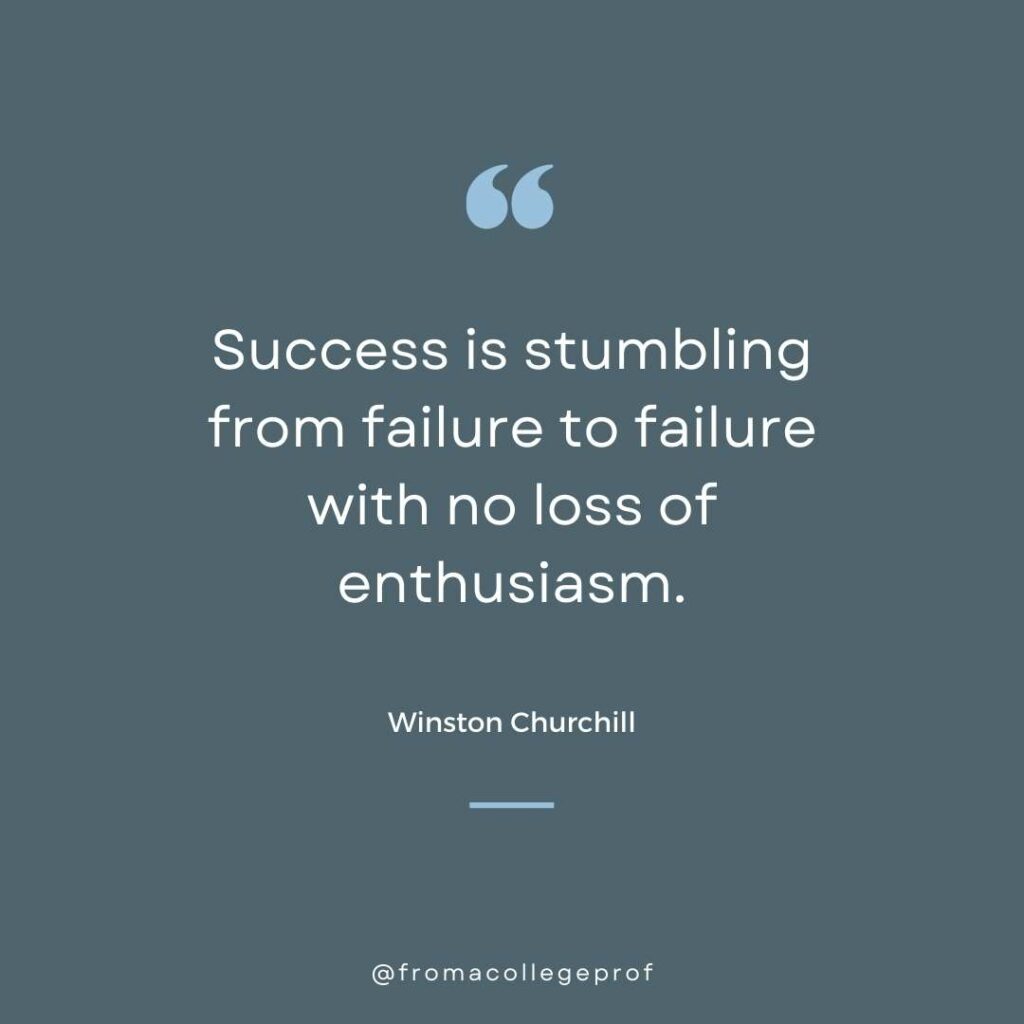
- If you’re doing your best, you won’t have any time to worry about failure. – H. Jackson Brown, Jr.
- You miss 100% of the shots you don’t take. – Wayne Gretzsky
- The greatest accomplishment is not in never falling, but in rising again after you fall. – Oliver Goldsmith
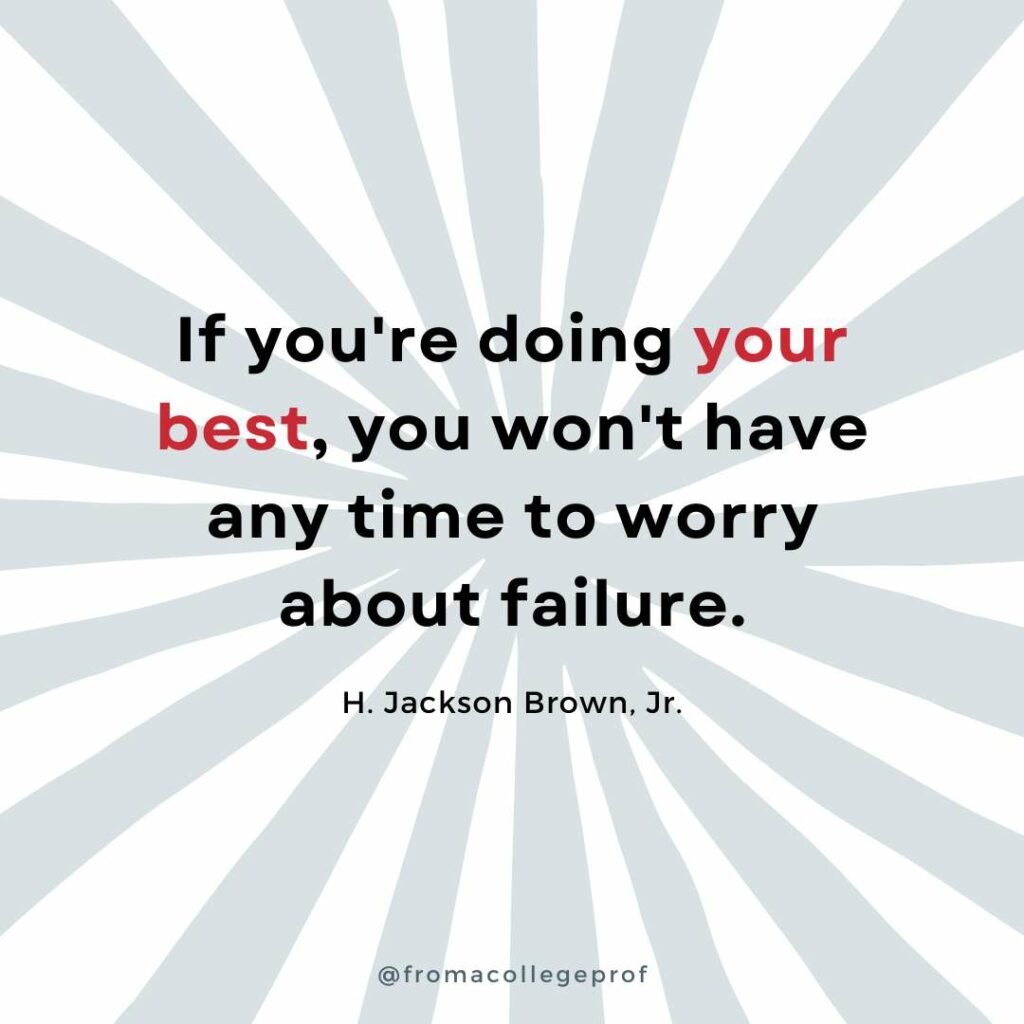
- Confidence comes not from always being right but from not fearing to be wrong. – Peter T. McIntyre
- My dad encouraged us to fail growing up. He would ask us what we failed at that week. If we didn’t have something, he would be disappointed. It changed my mindset at an early age that failure is not the outcome–failure is not trying. Don’t be afraid to fail. – Sara Blakely
- Giving up is the only sure way to fail. – Gena Showalter
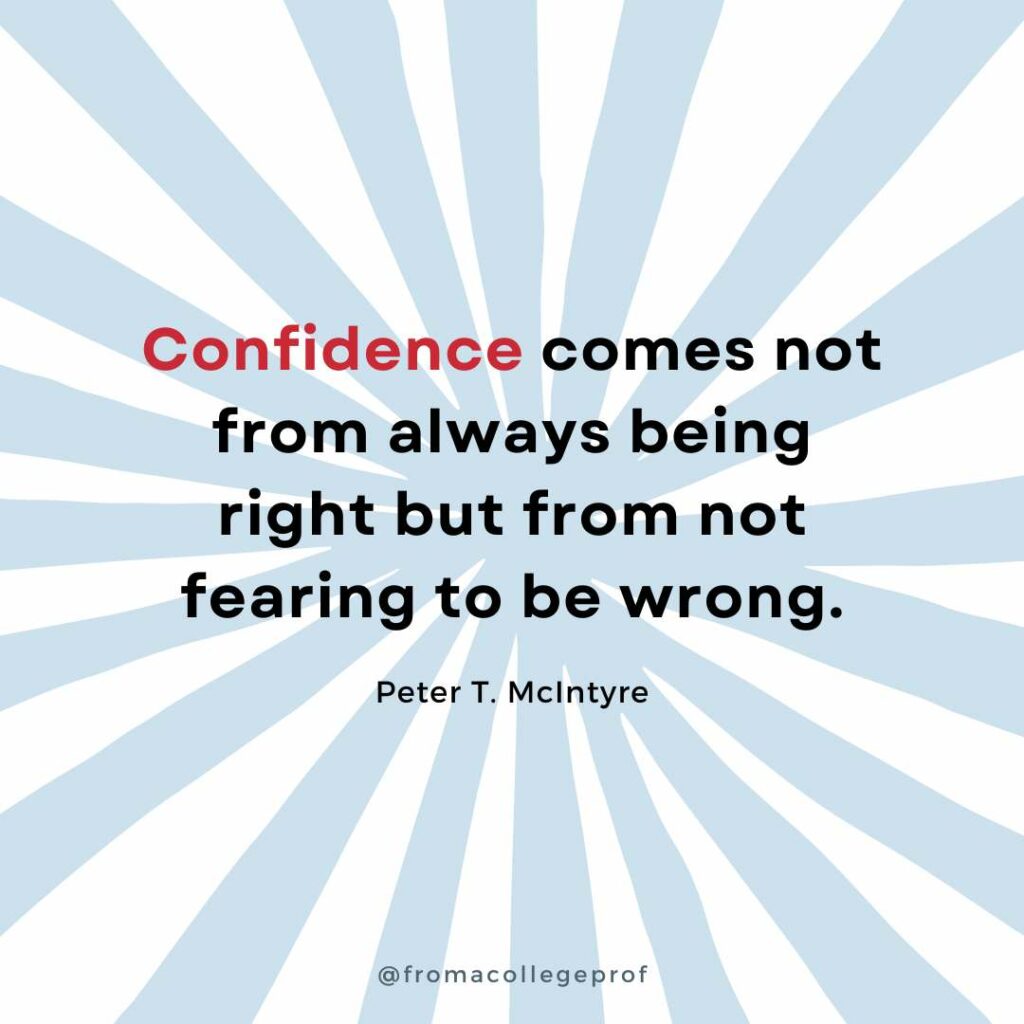
Final Thoughts
When it comes to studying for exams, motivation is key.
By surrounding yourself with inspirational quotes for exam success, you can stay focused on your academic goals.
The quotes that resonate with you can encourage and motivate you to be disciplined and consistent. Keep them front and center.
Remember to take care of yourself! You’re far more important than good grades.
Keep pushing forward and celebrate the small wins along the way. With the right mindset and strategies, you can achieve academic success and reach your full potential.
75. An investment in knowledge pays the best interest. – Benjamin Franklin
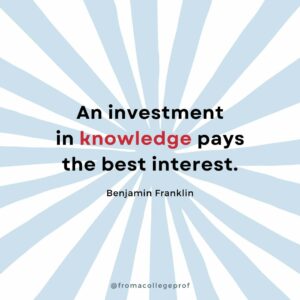
Good luck on your exams. We’re cheering you on!

After years of teaching high school English, Kristie now educates college students on communication and life. She has two teenage sons, two dogs and a fairly serious obsession with sports. She also listens when the mountains call.
Leave a Reply Cancel reply
Your email address will not be published. Required fields are marked *
Save my name, email, and website in this browser for the next time I comment.
Trending Post : 52 Best Things to do in Ireland

50+ Inspirational Quotes for College Students
College can be a fantastic experience where you can meet lifelong friends, make life-lasting experiences, and get a degree that will help set you up for a great job. However, there are times for everyone in college or living in the dorms when you can feel down, be stressed, or just not feel happy. During these moments, one thing that can help a lot as well reading daily affirmations or quotes to help ground yourself. Below are my favorite 52 Inspirational Quotes for College Students.
Remember you can do this whether it’s a great day or a bad day; they will always cheer you up. I also recommend you try to surround yourself with friends, talk to a therapist if you are able to, and start exercising daily to help you feel better both mentally and physically.
Ads are how we pay our bills and keep our blog free for you to enjoy. We also use affiliate links; if you make a purchase through them, we may receive a small commission at no cost to you.

As Albert Einstein said, “Education is not the learning of many facts, but the training of the mind to think.” So, let’s jump into the 2022-23 college school year with a list of inspirational and motivational quotes.
The first step to staying focused, happy, and having a successful college career is to choose to make it happen! As Winston Churchill said, “Attitude is a little thing that makes a BIG difference.” “Success is not final, failure is not fatal, it is the courage to continue that counts.
Here are my 52 affirmations and quotes to use during college life to turn to in tough times to get essay writing help or to manifest great things and even a good grade. As Michael Jordan said, “You have to expect things of yourself before you can do them.”
52 Inspirational Quotes For College Students

1. “The more that you read, the more things you will know. The more that you learn, the more places you’ll go.” – Dr. Seuss
2. “A little progress each day adds up to big results.” – Satya Nani
3. “Self-discipline is the magic power that makes you virtually unstoppable.” – Dan Kennedy
4. “The way to get started is to quit talking and begin doing.” – Walt Disney
5. “So long as your desire to explore is greater than your desire to not screw up, you’re on the right track.” – Ed Helms
6. “It never gets easier. You just get better.” – Jordan Hoechlin
7. “If you are not willing to risk the usual, you will have to settle for the ordinary.” – Jim Rohn
8. “No, sky is not the limit. It is only the beginning.” — Donovan Livingston
9. “You will find the key to success under the alarm clock.” – Benjamin Franklin
10. “Whatever you are, be a good one.” – Abraham Lincoln
11. “Your time is limited, so don’t waste it living someone else’s life.” – Steve Jobs
12. “Just remember, you can’t climb the ladder of success with your hands in your pockets.” – Arnold Schwarzenegger
13. “Striving for success without hard work is like trying to harvest when you haven’t planted.” – David Bly
14. “Be so good they can’t ignore you.” – Steve Martin
15. “College is fun as long as you don’t die.” -Tsugumi Ohba
16. “I’m going to college. I don’t care if it ruins my career. I’d rather be smart than a movie star.” -Natalie Portman
17. “Success is the sum of small efforts repeated day-in and day-out.” – Robert Collier
18. “Perseverance is the hard work you do after you get tired of doing the hard work you already did.” – Newt Gingrich
19. “Education is the best provision for life’s journey.” -Aristotle
20. “Training is everything. The peach was once a bitter almond, cauliflower is nothing but cabbage without a college education.” -Mark Twain

21. “Somewhere, something incredible is waiting to be known.” – Carl Sagan
22. “I pay no attention whatsoever to anybody’s praise or blame. I simply follow my own feelings.” – Wolfgang Amadeus Mozart
23. “The optimist is a pessimist with a plan.” – Bangambiki Habyarimana
24. “There is nothing noble in being superior to your fellow man; true nobility is being superior to your former self.” – Ernest Hemingway
25. “Start where you are. Use what you have. Do what you can.” – Arthur Ashe
26. “Opportunities don’t happen. You create them.” – Chris Grosser
27. “A man who has never gone to school may steal from a freight car; but if he has a university education, he may steal the whole railroad.” – Theodore Roosevelt
28. “Your life is your story, and the adventure ahead of you is the journey to fulfill your own purpose and potential.” – Kerry Washington
29. “Everything in moderation, including moderation.” – Oscar Wilde
30. “To thine own self be true, and it must follow, as the night the day, thou canst not then be false to any man.” – William Shakespeare
31. “Be yourself and people will like you.” – Diary of a Wimpy Kid
32. “The best way to pay for a lovely moment is to enjoy it.” – Richard Bach
33. “Many people will walk in and out of your life, but only true friends will leave footsteps in your heart.” – Eleanor Roosevelt
34. “Life moves pretty fast. If you don’t stop and look around once in a while, you could miss it.” – Ferris Bueller
35. “Be the person your dog thinks you are.” – J.W. Stephens
36. “I love deadlines. I love the whooshing noise they make as they go by.” – Douglas Adams
37. “You miss 100% of the shots you don’t take.” – Wayne Gretzky
38. “Whatever you do, always give 100%. Unless you’re donating blood.” – Bill Murray
39. “I find that the harder I work, the more luck I seem to have.” – Thomas Jefferson
40. “I’ve missed more than 9000 shots in my career. I’ve lost almost 300 games. 26 times, I’ve been trusted to take the game-winning shot and missed. I’ve failed over and over and over again in my life. And that is why I succeed.” – Michael Jordan
41. “The best revenge is massive success.” – Frank Sinatra
42. “I think it’s possible for ordinary people to choose to be extraordinary.” – Elon Musk
43. “While one may encounter many defeats, one must not be defeated.” – Maya Angelou

44. ”My mother said to me, ‘If you are a soldier, you will become a general. If you are a monk, you will become the Pope.’ Instead, I was a painter and became Picasso.” – Pablo Picasso
45. “Make yourself proud.” – John Green
46. “Education is the most powerful weapon which you can use to change the world.” — Nelson Mandela
47. “The beautiful thing about learning is nobody can take it away from you.” – B. B. King
48. “Our greatest weakness lies in giving up. The most certain way to succeed is always to try just one more time.” – Thomas A. Edison
49. “It’s not about perfect. It’s about effort.” – Jillian Michaels
50. “Whether you think you can or think you can’t, you are right.” – Henry Ford
51. “You are never too old to set another goal or to dream a new dream.” – C.S. Lewis
52. “Courage doesn’t always roar. Sometimes courage is the quiet voice at the end of the day saying ‘I will try again tomorrow’.” – Mary Anne Radmacher
The most important thing is to put some of these quotes into real-world application. So, choose a few of your favorites and print them out or keep them on your phone or somewhere you can see them often. You can even tape them to your mirror.
Keep your own best interest at heart; because the only way to build a happy and motivated life is if you put the steps into motion. This is the result of preparation! Put the energy into staying motivated by saying just one of these quotes each day!
As Dan Kennedy said, “Self-discipline is the magic power that makes you virtually unstoppable.”
And before we end this article, one more quick quote from William Butler Yeats: “Education is not the filling of a pail, but the lighting of a fire.”
Related Articles from the College Life Series
- Freshman Dorm College Checklist : 31 Things You Actually Need
- 11 Best Men’s Shoes for College
Follow 52 Perfect Days on Facebook | Twitter | Pinterest | Instagram
If you liked it, please share it. Thank you!
- Pinterest 7
I am Roland Meisler. I am 21 years old and currently attending the University of South Dakota. I am currently writing about college experiences and I have also been writing about travel since I was 14. I love to travel to different places around the world. One of my life goals is visiting all seven continents. These are my stories....
Leave a Reply Cancel reply
Your email address will not be published. Required fields are marked *

107 Motivational Quotes for College Students to Inspire You
- Pinterest 3
Table of Contents
The best inspirational quotes for college students
Today, I want to share with you some of my favorite inspirational quotes for college students.
Are you feeling a bit overwhelmed with your studies lately? Don’t worry, you’re not alone. We’ve all been there, buried under a mountain of exams, essays, and deadlines.
But guess what? I’ve got something that might just lift your spirits and give you that extra push you need to keep going.
Today, I want to share with you some of my favorite inspirational quotes for college students. These quotes have helped me stay motivated and focused during those tough times, and I’m sure they’ll do the same for you.
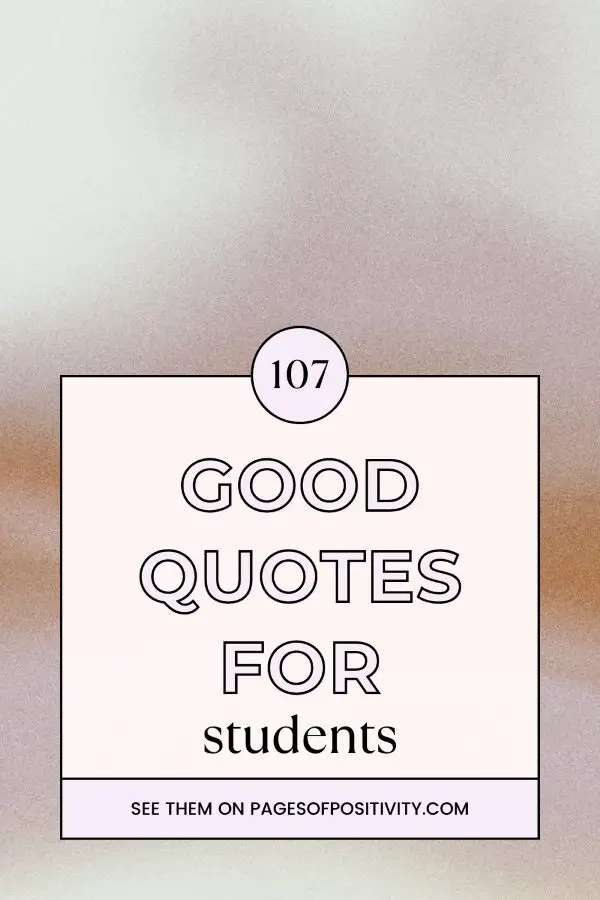
This post may contain affiliate links. That is, if you click on a link and buy something I recommend, I will receive a small compensation at no additional cost to you.
My favorite motivational quotes for college students
- “Ninety-nine percent of the failures come from people who have the habit of making excuses.” – George Washington Carver
- “Self-belief and hard work will always earn you success.” – Virat Kohli
- “You don’t drown by falling in the water; you drown by staying there.” – Ed Cole
- “The more you give away, the happier you become.”
- “The best and most beautiful things in the world cannot be seen or even touched; they must be felt with the heart.” – Helen Keller
- “Today, a reader. Tomorrow, a leader.” —Anonymous
- “The beautiful thing about learning is that nobody can take it away from you.” – B.B. King
- “Doubt kills more dreams than failure ever will.” – Karim Seddiki
- “Anyone who stops learning is old, whether at twenty or eighty. Anyone who keeps learning stays young.” – Henry Ford
- “Nothing great ever achieved without enthusiasm.” – Ralph Waldo Emerson
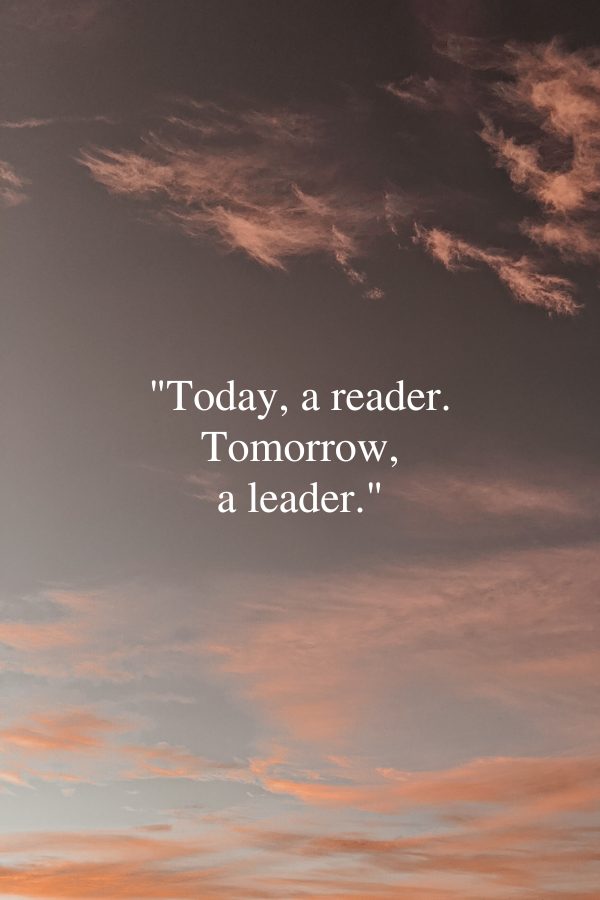
- “There is no substitute for hard work.” – Thomas Alva Edison
- “Live as if you were to die tomorrow. Learn as if you were to live forever.” – Mahatma Gandhi
- “Your positive action combined with positive thinking results in success.” – Shiv Khera
- “It takes courage to grow up and become who you really are.” – E.E. Cummings
- “The way to get started is to quit talking and begin doing.” – Walt Disney
- “I think it’s possible for ordinary people to choose to be extraordinary.” — Elon Musk
- “Teachers can open the door, but you must enter it yourself.” — Chinese proverb
- “Motivation is what gets you started. Habit is what keeps you going.” —Jim Ryun
- “Procrastination is the thief of time.” – Edward Young
- “Every accomplishment starts with the decision to try.” – Gail Devers
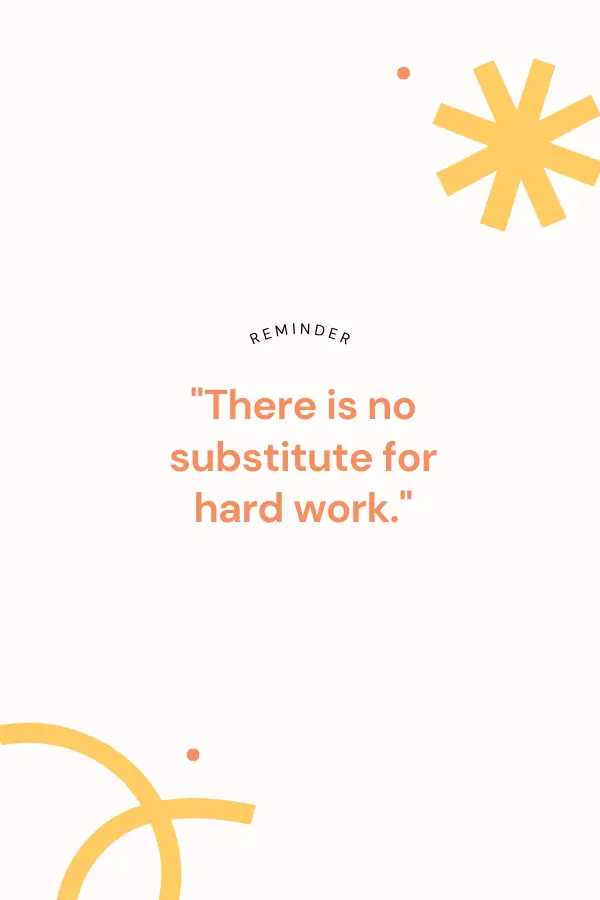
- “There are no shortcuts to any place worth going.” —Beverly Stills
- “Tell me and I forget. Teach me, and I remember. Involve me, and I learn.” – Benjamin Franklin
- “How wonderful it is that nobody needs to wait a single moment before starting to improve the world.” – Anne Frank
- “Wake up with determination and go to bed with satisfaction.”
- “Look at the sky. We are not alone. The whole universe is friendly to us and conspires only to those who dream and work.”
- “To be an overachiever, you have to be an over-believer.” – Dabo Swinney
- “Self-discipline is self-caring.” – M. Scott Peck
- “I think it’s possible for ordinary people to choose to be extraordinary.” —Elon Musk
- “That’s the thing about books. They let you travel without moving your feet.” – Jhumpa Lahiri
- “Self-compassion is simply giving the same kindness to ourselves that we would give to others.” – Christopher Germer
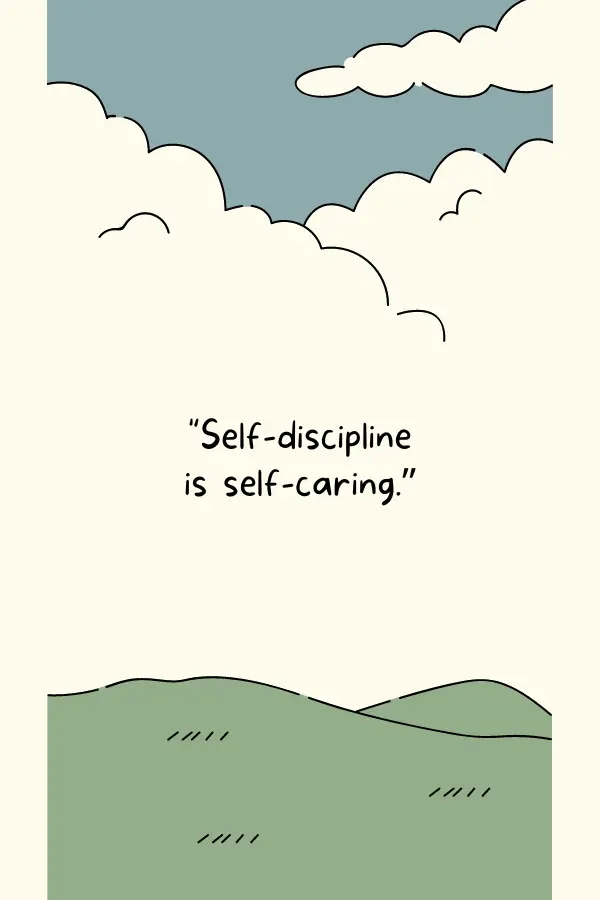
- “Success is the sum of all efforts, repeated day-in & day out.” – R. Collier
- “Only I can change my life. No one can do it for me.” – Carol Burnett
- “There are plenty of difficult obstacles in your path. Don’t allow yourself to become one of them.” – Ralph Marston
- “I can’t tell you how many times I’ve been given a no. Only to find that a better, brighter, bigger yes was right around the corner.” – Arlan Hamilton
- “Procrastination is opportunity’s assassin.” – Victor Kiam
- “The biggest risk is not taking any risk… In a world that’s changing really quickly, the only strategy that is guaranteed to fail is not taking risks.” – Mark Zuckerberg
- “If opportunity doesn’t knock, build a door.” – Milton Berle
- “We need to accept that we won’t always make the right decisions, that we’ll screw up royally sometimes – understanding that failure is not the opposite of success, it’s part of success.” – Ariana Huffington
- “Wisdom…. comes not from age, but from education and learning.” – Anton Chekhov
- “You are braver than you believe, stronger than you seem, and smarter than you think.” — A.A Milne
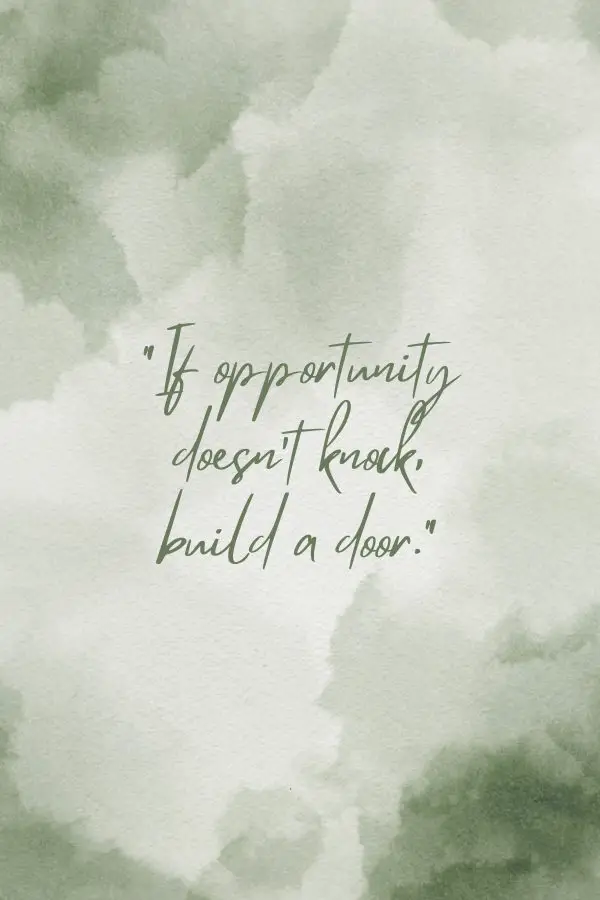
- “The man who does not read books has no advantage over the one who cannot read them.” —Mark Twain
- “You don’t have to be great to start, but you have to start to be great.” – Zig Ziglar
- “Failure is another stepping stone to greatness.” – Oprah Winfrey
- “Just one small positive thought in the morning can change your whole day.” – Dalai Lama
- “You want to have a future where you’re expecting things to be better, not one where you’re expecting things to be worse” – Elon Musk
- “Go into the world and do well. But more importantly, go into the world and do good.” – Minor Myers Jur
- “In the end, it’s not the years in your life that count. It’s the life in your years.” – Abraham Lincoln
- “Every day is a second chance.”
- “Opportunity does not happen; you need to create them.”
- “You have to be odd to be No.1.” —Dr. Seuss
- “The mind is not a vessel to be filled but a fire to be ignited.” – Plutarch
- “The reading of all good books is like conversation with the finest (people) of the past centuries.” – Descartes
- “Education is something we have to keep pursuing day after day.” – Premier Brian Gallant
- “Make each day your masterpiece.” – John Wooden
- “Always remember that you are absolutely unique. Just like everyone else.” – Margaret Mead
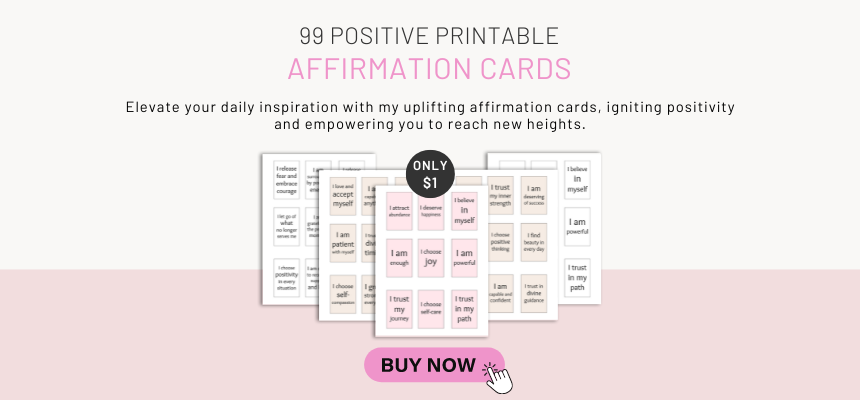
- “Education is the passport to the future, for tomorrow belongs to those who prepare for it today.” – Malcolm X
- “Your time is limited, so don’t waste it living someone else’s life. Don’t be trapped by dogma, which is living with the results of other people’s thinking. ” – Steve Jobs
- “End is not the end if fact E.N.D. Means “Efforts Never Dies. – Dr. A.P.J. Abdul Kalam
- “He who asks a question is a fool for five minutes; he who does not ask a question remains a fool forever.” — Chinese Proverb
- “Reading is essential for those who seek to rise above the ordinary.” – Jim Rohn
- “None of us is as smart as all of us.” —Ken Blanchard
- “If you think education is expensive, try ignorance.” — Andy McIntyre
- “Optimism is a happiness magnet. If you stay positive, good things and good people will be drawn to you.” – Mary Lou Retton
- “The best revenge is massive success.” – Frank Sinatra
- “You must be the change you wish to see in the world.” – Mahatma Gandhi
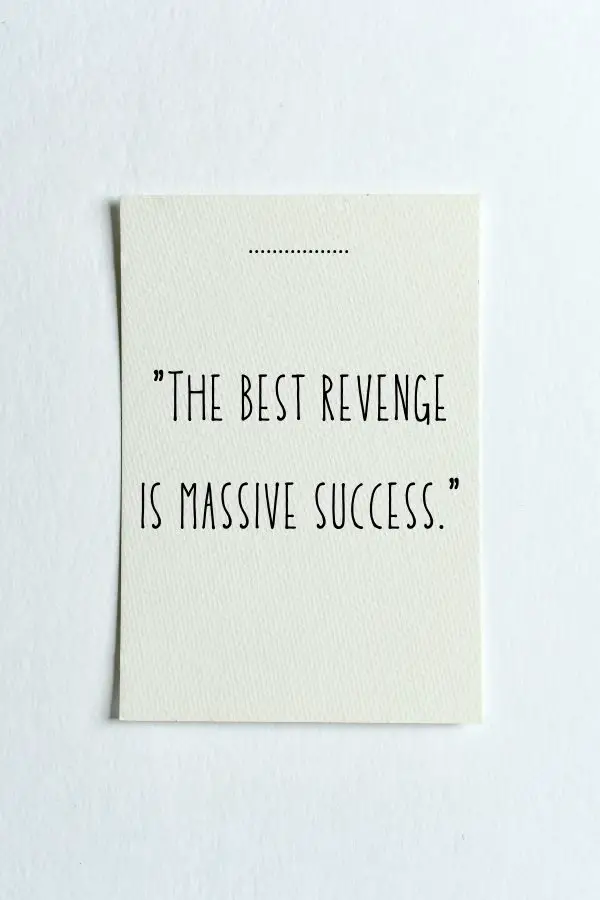
- “I am indeed a king because I know how to rule myself.” – Pietro Aretino
- “Genius is 10% inspiration, 90% perspiration.” —Thomas Edison
- “Fall seven times, stand up eight.”– Japanese Proverb
- “Just believe in yourself. Even if you don’t pretend that you do and, at some point, you will.” – Venus Williams
- “Perseverance is not a long race; it is many short races one after the other.” – Walter Elliot
- “Many of life’s failures are people who did not realize how close they were to success when they gave up.” – Thomas Edison
- “I think I can. I know I can.” – Jennifer Wittwer
- “I never dreamed about success. I worked for it.” – Estée Lauder
- “Education is the most powerful weapon you can use to change the world.” – Nelson Mandela
- “You can’t have a better tomorrow if you’re still thinking about yesterday.” – Charles F. Kettering

- “Procrastination makes easy things hard and hard things harder.” — Mason Cooley
- “A person who never made a mistake never tried anything new.” – Albert Einstein
- “Be patient with yourself. Self-growth is tender; it’s holy ground. There’s no greater investment.” – Stephen Covey
- “Don’t let what you cannot do interfere with what you can do.” — John Wooden
- “Failure will never overtake me if my determination to succeed is strong enough.” – Og Mandino
- “A little progress each day adds up to big results.” – Satya Nani
- “Learning is never done without errors and defeat.” – Vladimir Lenin
- “Don’t wait for the opportunity. Create it.” – George Bernard Shaw
- “I have not failed. I’ve just found 10,000 ways that won’t work.” – Thomas Edison
- “A man’s mind, stretched by new ideas, may never return to its original dimensions.” — Oliver Wendell Holmes Jr.
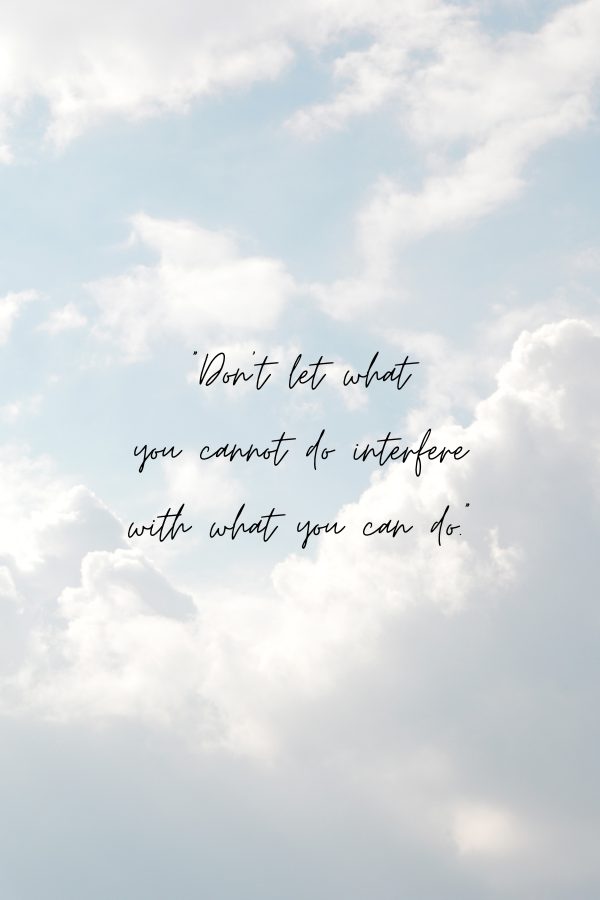
- “You cannot change your future, but you can change your habits, and surely your habits will change your future.”– A.P.J. Abdul Kalam
- “The best way to predict your future is to create it.” – Abraham Lincoln
- “Skill is only developed by hours and hours of work.” – Usain Bolt
- “An ounce of patience is worth more than tons of preaching.” – Mahatma Gandhi
- “The future belongs to those who believe in the beauty of their dreams.” —Eleanor Roosevelt
- “In a world where you can be anything, be kind.” — Jennifer Dukes Lee
- “If you get tired, learn to rest not to quit.” – Banksy
- “I find that the harder I work, the more luck I seem to have.” —Thomas Jefferson
- “He who opens a school door, closes a prison.” — Victor Hugo
- “When you reach the end of your rope, tie a knot in it and hang on.” – Franklin D. Roosevelt
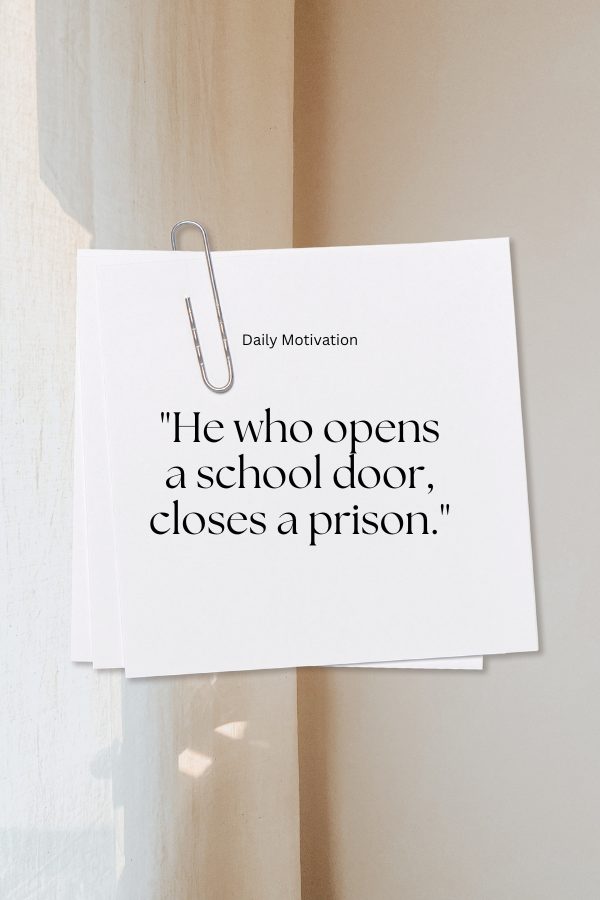
- “Optimism is the faith that leads to achievement. Nothing can be done without hope and confidence.” – Helen Keller
- “The more that you read, the more things you will know, the more that you learn, the more places you’ll go.” — Dr. Seuss
- “I believe every human has a finite number of heartbeats. I don’t intend to waste any of mine.” – Neil Armstrong
- “Learn from yesterday, live for today, hope for tomorrow. The important thing is not to stop questioning.” – Albert Einstien
- “The expert in anything was once a beginner.” — Helen Hayes
- “Never let the fear of striking out stop you from playing the game.” —Babe Ruth
- “Learn from yesterday. Live for today. Hope for tomorrow.” – Albert Einstein
- “Instruction ends in the schoolroom, but education ends only with life.” – Frederick W. Robertson
- “Today a reader, tomorrow a leader.” – Margaret Fuller
- “Start where you are. Use what you have. Do what you can.” — Arthur Ashe
- “I’ve failed over and over and over again in my life. And that is why I succeed.” – Michael Jordan
- “Everything’s always ending. But everything’s always beginning, too.” – Patrick Ness

Why should I read these motivational quotes for college students?
With the internet overflowing with all sorts of feel-good messages, it’s easy to feel a bit skeptical. But hear me out—these quotes aren’t just your average pep talk.
They’re like little sparks of inspiration that have the power to ignite something magical inside you.
Think about it this way: We all have those moments when we’re knee-deep in deadlines, drowning in textbooks, and feeling like we’re running on empty. It happens to the best of us.
But that’s where these quotes come in handy. They’re like tiny reminders that you’re not alone and that you’ve got what it takes to conquer whatever challenges come your way.
And here’s the thing: they’re not just empty words on a screen. Each of these quotes has a story behind it—a nugget of wisdom that’s been passed down through the ages.
They’ve stood the test of time because they speak to something deep within us: our resilience, our determination, and our unwavering belief in ourselves.
So, if you’re feeling a bit stuck, a bit lost, or just in need of a little pick-me-up, give these quotes a chance. Who knows, they might just be the push you need to keep going when the going gets tough. Trust me, you won’t regret it.
What are your favorite inspirational quotes for college students?

I consider myself an expert when it comes to positive affirmations, journaling, and inspirational quotes. My blog is all about spreading good vibes and helping you feel awesome! I’ve got loads of cool stuff for you to explore, like uplifting affirmations that can boost your confidence, fun journal prompts to spark your creativity, and inspiring quotes to motivate you every day. Let’s embark on this amazing journey together as we discover more about ourselves, uncover our hidden strengths, and create a life that’s full of happiness and success.
You might also like these related posts

Leave a Comment Cancel reply
Save my name, email, and website in this browser for the next time I comment.
60+ College Life Quotes to Get You Through the School Year
- "College is the reward for surviving high school." — Judd Apatow

There's an old adage that says college is supposed to be the best time of your life. And in many ways it is — from living with your besties to college parties and cool classes, your four years on campus are full of amazing times. But college can also be one of the hardest times — living away from home for the first time, juggling friends, exams and papers, internships and jobs, and trying to stretch your food budget as far as you can. No matter if you need a good laugh, reassurance that all your hard work will pay off, or maybe something to make you crack a smile, the right quotes can motivate you to slay your way through college.
Historical quotes from political leaders can reaffirm the importance of education, while quotes from anonymous authors make jokes about the things we all experience on campus. Get ready for a new outlook on the semester once you check out this inspiring list of quotes to help get you through college life.
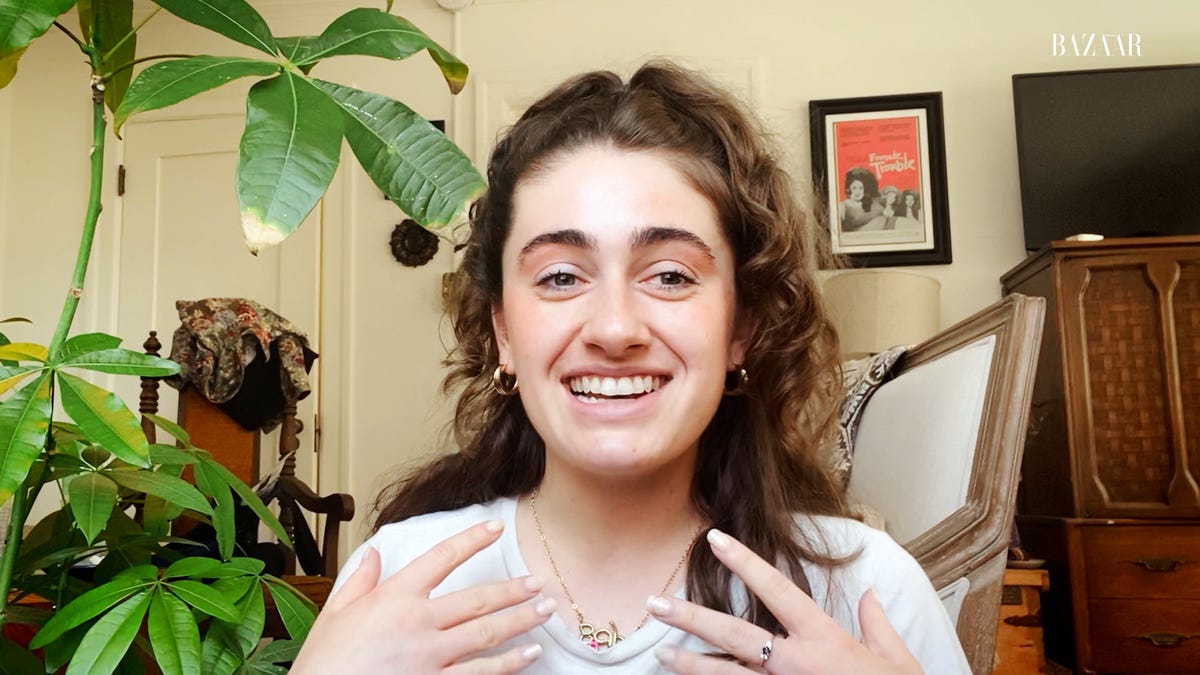
Motivational Quotes

- "To those of you who received honors, awards and distinctions, I say well done. And to the C students, I say you too may one day be president of the United States." – George W. Bush
- "Determination is doing what needs to be done even when you don’t feel like doing it." – unknown
- "The more that you read, the more things you will know. The more that you learn, the more places you'll go." — Dr. Seuss
- "The best way to predict your future is to create it." – Abraham Lincoln
- "Skill is only developed by hours and hours of work." — Usain Bolt
- "It's not about perfect. It's about effort." — Jillian Michaels
- "Perseverance is the hard work you do after you get tired of doing the hard work you already did." – Newt Gingrich
- "Successful people are not gifted; they just work hard, then succeed on purpose." — G.K. Nielson
- "Great things are done by a series of small things brought together." — Vincent Van Gogh
- "Do something now; your future self will thank you for later." – Unknown
- "Every year, many, many stupid people graduate from college. And if they can do it, so can you." — John Green
- "Striving for success without hard work is like trying to harvest when you haven't planted." — David Bly
- "There is no elevator to success. You have to take the stairs." — Zig Ziglar
- "Education is the passport to the future, for tomorrow belongs to those who prepare for it today." — Malcolm X
- "Accept failure as part of the process." — Unknown
- "If you hear a voice within you say 'you cannot paint,' then by all means paint, and that voice will be silenced." — Vincent Van Gogh
- "Every expert was once a beginner." — Helen Hayes
- "You can’t use up creativity. The more you use, the more you have." — Maya Angelou
- "Be so good they can't ignore you." — Steve Martin
- "Failure is simply the opportunity to begin again. This time more intelligently." — Henry Ford
- "Opportunities don’t happen. You create them." — Chris Grosser
- "You get in life what you have the courage to ask for." — Oprah Winfrey
- "Every person you meet knows something you don’t; learn from them." —H Jackson Brown Jr.
- "To accomplish great things, we must not only act but also dream, not only plan but also believe." — Anatole Franc
- "A little progress each day adds up to big results." – Satya Nani
Funny Quotes

- "You will find the key to success under the alarm clock." – Benjamin Franklin
- "You will never have more energy or enthusiasm, hair, or brain cells than you have today." – Tom & Ray Magliozzi
- "Whatever you do, always give 100%. Unless you’re donating blood." – Bill Murray
- "Life is an improvisation. You have no idea what’s going to happen next and you are mostly just making things up as you go along." – Stephen Colbert
- "I love deadlines. I love the whooshing noise they make as they go by." – Douglas Adams
- "I pulled an all-dayer today. It was rough." — Unknown
- "Cumulative final exams are like fights in relationships. Why must we continue to bring up the past? What's done is done." — Unknown
- "Don't judge a book by its cover. My math book has a picture of someone enjoying themselves on it, but I am not enjoying myself at all." — Unknown
- "Choose a major you love and you'll never work a day in your life because that field probably isn't hiring." — Unknown
- "When I die I want the people I did group projects with to lower me into my grave so they can let me down one last time." — Unknown
- "I've got 99 problems and 97 of them are due by the end of the week. The other two were due last week." — Unknown
- "The way to get started is to quit talking and begin doing." — Walt Disney
- "Definition of a College professor: someone who talks in other people’s sleep." — W.H. Auden
- "Focus on doing the right things instead of a bunch of things." — Mike Krieger
- "So long as your desire to explore is greater than your desire to not screw up, you're on the right track." — Ed Helms
Heartwarming Quotes

- "Be yourself and people will like you." — Jeff Kinney, Diary of a Wimpy Kid
- "Make yourself proud." – John Green
- "No, sky is not the limit. It is only the beginning." — Donovan Livingston
- "If you don't go after what you want, you'll never have it. If you don't ask, the answer is always no. If you don't step forward, you're always in the same place." — Nora Roberts
- "Life moves pretty fast. If you don’t stop and look around once in a while, you could miss it." – Ferris Bueller, Ferris Bueller's Day Off
- "Education is the most powerful weapon which you can use to change the world." — Nelson Mandela
- "College has given me the confidence I need to fail." — Jarod Klintz, This Book Has No Title
- "Education is the best provision for life's journey." — Aristotle
- "A college degree is not a sign of a finished product but an indication a person is prepared for life." — Reverend Edward A. Malloy, Monk's Reflections
- "Training is everything. The peach was once a bitter almond, cauliflower is nothing but cabbage without a college education." — Mark Twain , Pudd'nhead Wilson
- "Take it all one day at a time and enjoy the journey." — Kristi Barlett
- "Educating yourself does not mean you were stupid in the first place, it means that you are intelligent enough to know that there is plenty left to learn." — Melanie Joy
- "The things taught in schools and colleges are not an education, but the means to an education." — Ralph Waldo Emerson
- "Never bend your head. Always hold it high. Look the world right in the eye." — Helen Keller
- "College is like a fountain of knowledge and the students are there to drink." — Chuck Palahniuk
- "It takes courage to grow up and become who you really are." — E.E. Cummings
- "An investment in knowledge always pays the best interest." — Benjamin Franklin
- "A mind is a fire to be kindled, not a vessel to be filled." — Plutarch
- "College inspired me to think differently. It's like no other time in your life." — Lara Oleynik
- "Whatever you are, be a good one." — Abraham Lincoln.
- "And will you succeed? Yes you will indeed! (98 and 3/4 percent guaranteed)." — Dr. Seuss
Sam is an assistant news editor at Cosmo, covering all things pop culture, entertainment, and celebrity news. She previously covered those same topics along with health, lifestyle, and beauty at Seventeen. When she isn't draping her cheeks in blush, you can probably find her live-tweeting awards shows or making SwiftToks.
Carolyn Twersky is an associate editor for Seventeen covering celebrities, entertainment, politics, trends, and health. On her off time, she's probably watching Ru Paul's Drag Race, traversing NYC for the best donuts, or, most likely, enjoying time in her favorite place in the world: her bed.

Jasmine Washington is an Assistant Editor at Seventeen, where she covers celebrity news, beauty, lifestyle, and more. For the past decade, she has worked for media outlets, including BET, MadameNoire, VH1, and many others, where she used her voice to tell stories across various verticals. Follow her on Instagram.
Back to College!

These Items Make Your Freshman Year SO Much Better

The Best Dorm Bedding for Your Cozy College Life

15 Cool Dorm Room Decor Ideas

Hype Back To School Outfits That'll Win Day One
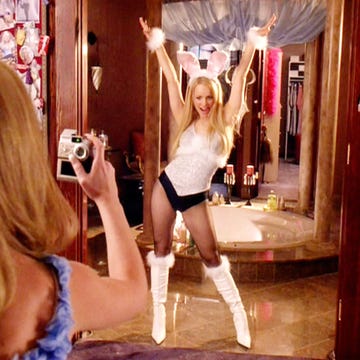
25 Unique and Fun College Party Themes

What Type of College Is Best for You?

How to Choose a High-Paying Major

Creative Ways to Make Money in College

Here's How to Save Money in College

What to Consider Before You Transfer Colleges

Every Good Kisser Knows These 20 Secrets

25 Motivational Quotes to Inspire Your Scholarship Journey
by Gabrielle McCormick | Nov 1, 2018 | Inspiration and Motivation , Paying for College , Scholarship Applications | 0 comments

The scholarship search and application process can be draining due to the emotional highs and lows. Here’s a little motivation and inspiration to encourage you to start or continue your journey.
- When you are completely over the scholarship search process:
“People often say that motivation doesn’t last. Well, neither does bathing – that’s why we recommend it daily.” — Zig Ziglar
- When you’ve just gotten a scholarship rejection letter or email:
“Winning is great, sure, but if you are really going to do something in life, the secret is learning how to lose. Nobody goes undefeated all the time. If you can pick up after a crushing defeat, and go on to win again, you are going to be a champion someday.” — Wilma Rudolph
- When you have a breakdown because you’re stressed: [clickToTweet tweet=”“Even if you’re on the right track, you’ll get run over if you just sit there.” — Will Rogers #OwnYourDegree” quote=”“Even if you’re on the right track, you’ll get run over if you just sit there.” — Will Rogers “]
- When you don’t know what to write in your scholarship essay:
“Convince yourself that you are working in clay, not marble, on paper not eternal bronze: Let that first sentence be as stupid as it wishes.” — Jacques Barzun
- When you’ve earned your first scholarship:
“Quantity and persistence will get you the outcomes you need.” — James Altucher
- When you’ve earned another scholarship:
“Take your victories, whatever they may be, cherish them, use them, but don’t settle for them.” — Mia Hamm
- When you’re questioning your scholarship application:
“If you’ve really done the work. I mean really, really, really done the work…submit it. If not, do what you need to do. Point. Blank. Period.” — Gabrielle McCormick
- When you’re feeling a little jealous of a friend that has more scholarships than you:
“Stress is caused by being ‘here’ but wanting to be ‘there’.” — Eckhart Tolle
- When you’re wondering if you’re good enough to earn scholarships:
“Start out perfect and don’t change a thing. Always accentuate your best features by pointing at them. And conceal your flaws by sucker punching anyone who has the audacity to mention them.” — Miss Piggy
- When you feel overwhelmed by everything that has to be done:
“Don’t wait until everything is just right. It will never be perfect. There will always be challenges, obstacles, and less than perfect conditions. So what? Get started now. With each step you take, you will grow stronger and stronger, more and more skilled, more and more self-confident, and more and more successful.” — Mark Victor Hansen
- When you’ve procrastinated and are down to the last minute to get your application finished: [clickToTweet tweet=”“Regretting wasted time is more wasted time.” — Author Unknown #OwnYourDegree” quote=”“Regretting wasted time is more wasted time.” — Author Unknown”]
- When you don’t know how to end your scholarship essay:
“You know the minute you stop thinking about it, it’ll happen.” — Sarah Dessen
- When you wonder if scholarships are really worth it:
“I’ve learned that fear limits you and your vision. It serves as blinders to what may be just a few steps down the road for you. The journey is valuable, but believing in your talents, your abilities, and your self-worth can empower you to walk down an even brighter path. Transforming fear into freedom – how great is that?” — Soledad O’Brien
- When you’ve had enough and want to give up:
“Effort only fully releases its reward after a person refuses to quit.” — Napoleon Hill
- When you’ve forgotten to submit a scholarship application:
“It’s how you deal with failure that determines how you achieve success.” — David Feherty
- When you’ve finished a scholarship application:
“Suggestions? Put it aside for a few days, or longer, do other things, try not to think about it. Then sit down and read it (printouts are best I find, but that’s just me) as if you’ve never seen it before. Start at the beginning. Scribble on the manuscript as you go if you see anything you want to change. And often, when you get to the end you’ll be both enthusiastic about it and know what the next few words are. And you do it all one word at a time.” — Neil Gaiman
- When you find a scholarship you’ve missed the deadline for:
“Happiness can be found, even in the darkest of times, if one only remembers to turn on the light.” Harry Potter and the Prisoner of Azkaban — Quote by Albus Dumbledore
- When you’ve decided to submit a scholarship application that doesn’t consist of an essay:
“As you move outside of your comfort zone, what was once the unknown and frightening becomes your new normal.” — Robin S. Sharma
- When you realize that you can actually win scholarships: [clickToTweet tweet=”“Control your own destiny or someone else will.” — Jack Welch #OwnYourDegree” quote=”“Control your own destiny or someone else will.” — Jack Welch”]
- When you think about the reasons why you need scholarships:
“Going after scholarships is living a few years of your life like most students won’t, so that you can live the rest of your life like most students can’t…with no or very few student loans.” — Gabrielle McCormick
- When you’re up late and still have scholarship stuff to do:
“If you fall behind, run faster. Never give up, never surrender, and rise up against the odds.” — Jesse Jackson
- When you’re up early trying to get scholarship things finished:
“It is well to be up before daybreak, for such habits contribute to health, wealth, and wisdom.” — Aristotle
- When you don’t feel like you have enough time to fit scholarships into your schedule:
“You can do anything, but not everything.” — David Allen
- When you question your writing ability:
“Our doubts are traitors, and make us lose the good we oft might win, by fearing to attempt.” ― William Shakespeare
- When you’re waiting to hear back from a scholarship committee:
“It’s really okay to charge up your battery because if you don’t you will run out of energy and power.” – Dyea Smith
And a bonus quote that pretty much sums up scholarships…
When you feel like you’re doing the best you can when it comes to scholarship:
“Never ever give up on what you really want to do. The person with big dreams is more powerful than one with all the facts.” — Albert Einstein
There you have it folks. I hope these quotes either kick-start your scholarship process or help to keep you going!
[info-box type=”success”] Real Talk: I know that it can be hard, frustrating, and stressful. But now is not the time to quit. You have to keep going. [/info-box]
P.S. If you’re struggling, need support, or just want to make sure you’re doing things right – make sure you join me over in our FREE Facebook Group or send me an email ?
How can we help?
Stay connected .
Free Webinar
COVID-19 and Scholarships
The scholarship process is being influened by COVID-19.
Make sure your family is prepared and protected. Register today.
Scholarship Topics
Access additional information resources and tools, speak with a scholarship coach schedule a session, join our private community facebook group, need tech take advantage of your si dell discount.

Click Here to Speak with a Dedicated Dell Account Manager!
Popular Blog Posts
Financial Aid
20 Important Questions for Financial Aid
Scholarship Planning
How Many Scholarships Should You Be Applying For?
Scholarship Scams
How to Spot and Avoid the Most Common Scholarship Scams
Winning Essay Tips
Why the Scholarship Committee Hated Your Essay
Increase Your Chances
JOIN SCHOLARSHIP EDGE
Step-by-Step Help from a Scholarship Winner
Winning tools, templates, and examples, get help when you're stuck from a scholarship coach.

Enjoying this blog post?
Then you'll love our newsletter! Subscribe to Scholarship Informer Weekly for exclusive content and updates.
You're Subscribed!
100 Best College Quotes To Motivate Students
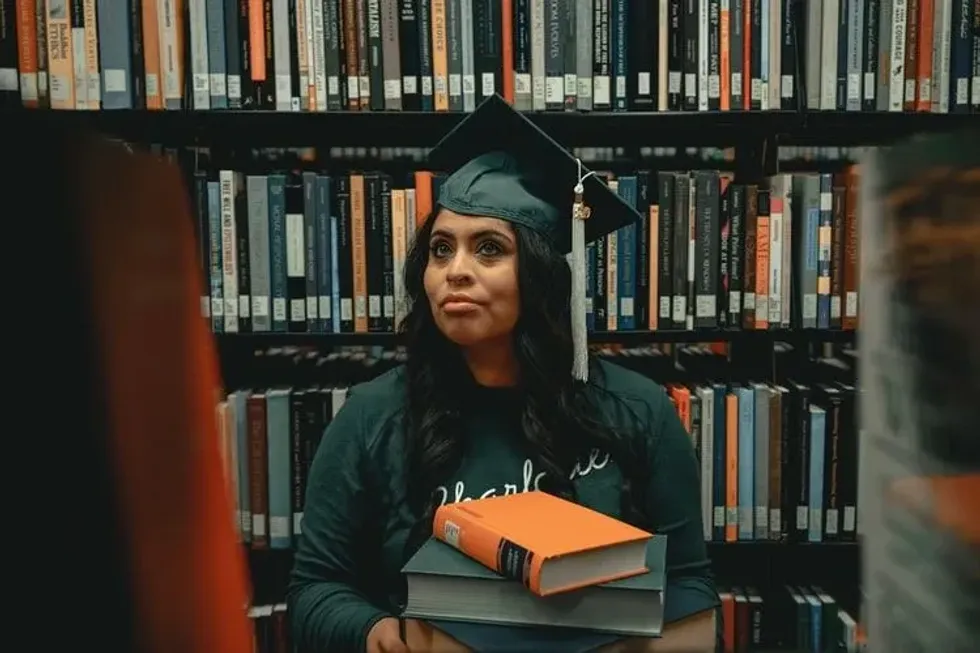
Why College quotes?
What parents should know, what to discuss with children, the best college quotes, funny college quotes about going to college, beautiful quotes about college, inspirational quotes for every college student, stunning college quotes, cool quotes about college, college life quotations, college quotes about friendship.
College is one of the best times in any individual's life. It is extremely important in shaping a child's future.
By the time students are done with college, they become young adults ready to take on the world with curious zeal. This is why the time spent in college has to be cherished.
Every moment is precious. Along with gaining knowledge, one gets ready to earn their own money and lead a good life. Motivational quotes can help ease stress and ease any uncertainties on the journey from high school to freshman year in college.
These quotes about college life can give an insight into what’s expected and how to handle life in college. In this article we take a look at a few encouraging, motivational and heart-warming college quotes about education, friendship and college life.
- College education is one part of the college experience. It is the best time for children to explore and discover their passions and interests.
- College is also a great time for children to step out of their comfort zones and live an independent life. They are now growing up and finding their own place in the world.
- Is it important for children to know that they aren't alone in this new chapter of their life. Being surrounded by family and friends helps them gain the required courage to step out of their comfort zones.
- Talking about your college experiences is a great way of starting a conversation about some sensitive topics like safety and responsibility.
- It is important to discuss their passions and interest with equal zeal.
- This crucial rite of passage is a fun and educational journey. When children spend every moment in gratitude, they can learn important life lessons along the way.
1. “Invest in yourself, you can afford it, trust me.” - Rashon Carraway.
2. “No, sky is not the limit. It is only the beginning.” - Donovan Livingston.
3. “The educated differ from the uneducated as much as the living differ from the dead.” – Aristotle.
4. “An investment in knowledge pays the best interest.” – Benjamin Franklin.
5. “Invest in yourself or no one else will.” - Unknown*.
6. “Formal education will make you a living; self-education will make you a fortune.” - Jim Rohn.
7. “An investment in education is an investment in our future.” - David Wasinger.
8. “To accomplish great things, we must not only act, but also dream, not only plan, but also believe.” - Anatole France.
9. “The beautiful thing about learning is that no one can take it from you.” - B.B. King.
10. “Success is the sum of small efforts repeated day-in and day-out.” – Robert Collier.
11. “There is no secret to success. It is the result of preparation, hard work, and learning from failure.” - General Colin Powell.
12. “There is no elevator to success. You have to take the stairs.” - Zig Ziglar.
13. “Success is no accident. It is hard work, perseverance, learning, studying, sacrifice and most of all, love of what you are doing or learning to do.” – Pele.
14. “A college degree is not a sign that one is a finished product but an indication a person is prepared for life.” – Edward A Malloy.
15. “The direction in which education starts a man will determine his future life.” - Plato.
16. “College is the reward for surviving high school.” - Judd Apatow.
17. “By the end of high school, I was not, of course, an educated man, but I knew how to try to become one.” – Clifton Fadiman.
18. “The road to success is always under construction.” - Lily Tomlin.
19. "The road to success is dotted with many tempting parking spaces." - Will Rogers.
20. “Every year, many, many stupid people graduate from college. And if they can do it, so can you.” - John Green, ‘Who's The Slow Learner? Adventures In Independence’.
21. “Work hard, nap hard.” – Demi Lovato.
22. “Opportunity is missed by most people because it is dressed in overalls and looks like work.” -Thomas A. Edison.
23. “Education is learning what you didn't even know you didn't know.” - Daniel J. Boorstin.
24. “Shoot for the moon. Even if you miss, you’ll land among the stars.” - Les Brown.
25. “You’re going to fall down, but the world doesn’t care how many times you fall down, as long as it’s one fewer than the number of times you get back up.” - Aaron Sorkin.
26. “When you get to the end of the rope, tie a knot and hang on.” – Franklin D. Roosevelt.
27. “The whole purpose of education is to turn mirrors into windows.” – Sydney J. Harris.
28. “Struggling to decide what to do after graduation is… a sort of rite of passage to the next phase of your life.” - Gloria Davidson.
29. “The roots of education are bitter, but the fruit is sweet.” – Aristotle.
30. “Your families are extremely proud of you… This would be a most opportune time to ask for money.” - Gary Bolding.
31. “It’s not that I’m so smart, it’s just that I stay with problems longer.” – Albert Einstein.
32. “Definition of a college professor: someone who talks in other people's sleep.” – W.H. Auden.
33. “College is a refuge from hasty judgment.” – Robert Frost.
34. “Educating yourself does not mean you were stupid in the first place, it means that you are intelligent enough to know that there is plenty left to learn.” - Melanie Joy.
35. “Intelligence without ambition is a bird without wings.” - Salvador Dali.
36. “Definiteness of purpose is the starting point of all achievement.” – W. Clement Stone.
37. “What we love in our books are the depths of many marvelous moments seen all at once.” - Kurt Vonnegut.
38. “With the realization of one’s own potential and self-confidence in one’s ability, one can build a better world.” – Dalai Lama.
39. “When you want to succeed as bad as you want to breathe, then you’ll be successful.” – Eric Thomas.
40. “You can’t have a better tomorrow if you’re still thinking about yesterday.” - Charles F. Kettering.
41. “It isn’t where you came from. It’s where you’re going that counts.” - Ella Fitzgerald.
42. “Success consists of going from failure to failure without loss of enthusiasm.” – Winston Churchill.
43. “Education is the passport to the future for tomorrow belongs to the people who prepare for it today." – Malcolm X.
44. “Education is the key to unlocking the world, a passport to freedom.” - Oprah Winfrey.
45. “Successful people are not gifted; they just work hard, then succeed on purpose.” - G.K. Nielson.
46. “The future belongs to those who believe in the beauty of their dreams.” – Franklin D. Roosevelt.
47. “The path to success is to take massive, determined action.” – Tony Robbins.
48. “Our greatest weakness lies in giving up. The most certain way to succeed is always to try just one more time.” – Thomas A. Edison.
49. “Focus on doing the right things instead of a bunch of things.” – Mike Krieger.
50. "And will you succeed? Yes, you will indeed! (98 and 3/4 percent guaranteed)." - Dr. Seuss.
51. “Education is not the filling of a pail, but the lighting of a fire.” – William Butler Yeats.
52. “Develop a passion for learning… you will never cease to grow.” – Anthony J. D’Angelo.
53. “A successful man is one who can lay a firm foundation with the bricks others have thrown at him.” – David Brinkley.
54. "College has given me the confidence I need to fail." - Jarod Kintz, ‘This Book Has No Title.’
55. “Self-discipline is the magic power that makes you virtually unstoppable.” - Dan Kennedy.
56. “College inspired me to think differently.” - Lara Oleynik.
57. “Change your thoughts and you change your world.” – Norman Vincent Peale.
58. "The fireworks begin today. Each diploma is a lighted match, each one of you is a fuse.” - Ed Koch.
59. “Whatever you are, be a good one.” – Abraham Lincoln.
60. “Teachers open the door, but you must enter by yourself.” – Chinese proverb.
61. “Education is the most powerful weapon which you can use to change the world.” – Nelson Mandela.
62. “Sometimes courage is the quiet voice at the end of the day saying ‘I will try again tomorrow.’” – Mary Anne Radmacher.
63. “Be bold, be courageous, be your best.” – Gabrielle Giffords.
64. “Start where you are. Use what you have. Do what you can.” - Arthur Ashe.
65. “Confidence is preparation. Everything else is beyond your control.” – Richard Kline
66. “Logic will get you from A to B. Imagination will take you everywhere.” - Albert Einstein.
67. “Take it all one day at a time and enjoy the journey.” - Kristi Barlett.
68. “Go confidently in the direction of your dreams. Live the life you have imagined.” – Henry David Thoreau.
69. “College is like a fountain of knowledge and the students are there to drink.” - Chuck Palahniuk.
70. “The successful warrior is the average man, with laser-like focus.” - Bruce Lee.
71. “Be so good they can't ignore you.” - Steve Martin.
72. “Discipline is just choosing between what you want now and what you want most.” - Abraham Lincoln.
73. “All progress takes place outside of your comfort zone.” – Michael John Bobak.
74. “Believe… Know that there is something inside you that is greater than any obstacle.” – Christian D. Larson.
75. “Skill is only developed by hours and hours of work.” – Usain Bolt.
76. “There are no shortcuts to any place worth going.” – Beverly Sills.
77. “Tough times don’t last. Tough people do.” – Robert H. Schuller.
78. “Your time is limited, so don’t waste it living someone else’s life.” – Steve Jobs.
79. “The true success is the person who invented himself.” – Al Goldstein.
80. “Excellence is not a skill. It is an attitude.” – Ralph Marston.
81. “Procrastination is the thief of time.” – Edward Young.
82. “Striving for success without hard work is like trying to harvest where you haven’t planted.” – David Bly.
83. “It is not the mountain we conquer, but ourselves.” – Edmund Hillary.
84. “College is the best time of your life. When else are your parents going to spend several thousand dollars a year just for you to go to a strange town and get drunk every night?” - David Wood
85. “The aim of a college education is to teach you to know a good man when you see one.” – William James.
86. "Some friends are not Really friends, they are FAMILY." - Unknown*.
87. "Here’s to the nights that turned into morning, with the friends that turned into family." - Unknown*.
88. "I have learned that friendship isn't about who you've known the longest, it's about who came and never left your side." - Yolanda Hadid
89. "Friends come and go like the waves of an ocean, but the real ones stick like Octopus on your face." - Unknown*.
90. "As we go on after college, we remember all the times we had together, and as our lives change, come whatever, we will still be friends forever." - Unknown*.
91. "My college friends are the most beloved friends that I have in my life and they’re the reason College was amazing!" - Unknown*.
92. "Keep it cool and simple and you will find the right friends in your college life to last a lifetime." - Unknown*.
93. "If you do not have friends ready to do anything with you, you missed out on College life." - Unknown*.
94. College is a place where you are going to make friends no matter how hard you try not to make one. - Unknown*.
95. "My college life is not complete without a bunch of crazy and hyper friends that made life exciting." - Unknown*.
96. "All kinds of first times in life are sometimes experience with college friends." - Unknown*.
97. "Can you imagine college with friends? it’s similar to plain bread." - Unknown*.
98. "College friends are really for keeps; they were the ones who are always there during your good and bad times." - Unknown*.
99. "Sometimes, you meet your true friends in College." - Unknown*.
100. "To pass a course in college, you only need; Books, Notes, and hardworking friends." - Unknown*.
You Might Also Like -
50+ Best 8th Grade Graduation Quotes
64 Lifelong Learning Quotes To Never Stop Learning
40 Best End Of Summer Quotes To Perfectly Sum Up The Season
*Do you know where this quote originated? Please email us to let us know at [email protected]
We Want Your Photos!
More for you, 32 thought-provoking please quotes, 32+ uplifting mission quotes to lift your spirits.
https://www.tuko.co.ke/355649-touching-college-memories-quotes.html
https://kidadl.com/quotes/lifelong-learning-quotes-to-never-stop-learning#:~:text=It is not that youquotes for everyone to enjoy
https://lovelifestatus.com/college-friends-quotes/
https://www.cosmopolitan.com/college/a33261416/best-college-quotes/
Bachelor of Arts and Law specializing in Political Science and Intellectual Property Rights
Anusuya Mukherjee Bachelor of Arts and Law specializing in Political Science and Intellectual Property Rights
With a wealth of international experience spanning Europe, Africa, North America, and the Middle East, Anusuya brings a unique perspective to her work as a Content Assistant and Content Updating Coordinator. She holds a law degree from India and has practiced law in India and Kuwait. Anusuya is a fan of rap music and enjoys a good cup of coffee in her free time. Currently, she is working on her novel, "Mr. Ivory Merchant".
1) Kidadl is independent and to make our service free to you the reader we are supported by advertising. We hope you love our recommendations for products and services! What we suggest is selected independently by the Kidadl team. If you purchase using the Buy Now button we may earn a small commission. This does not influence our choices. Prices are correct and items are available at the time the article was published but we cannot guarantee that on the time of reading. Please note that Kidadl is a participant in the Amazon Services LLC Associates Program, an affiliate advertising program designed to provide a means for sites to earn advertising fees by advertising and linking to Amazon. We also link to other websites, but are not responsible for their content.
2) At Kidadl, we strive to recommend the very best activities and events. We will always aim to give you accurate information at the date of publication - however, information does change, so it’s important you do your own research, double-check and make the decision that is right for your family. We recognise that not all activities and ideas are appropriate for all children and families or in all circumstances. Our recommended activities are based on age but these are a guide. We recommend that these ideas are used as inspiration, that ideas are undertaken with appropriate adult supervision, and that each adult uses their own discretion and knowledge of their children to consider the safety and suitability. Kidadl cannot accept liability for the execution of these ideas, and parental supervision is advised at all times, as safety is paramount. Anyone using the information provided by Kidadl does so at their own risk and we can not accept liability if things go wrong.
3) Because we are an educational resource, we have quotes and facts about a range of historical and modern figures. We do not endorse the actions of or rhetoric of all the people included in these collections, but we think they are important for growing minds to learn about under the guidance of parents or guardians.
google form TBD

- Entertainment & News
- Career & Money
- Health & Wellness
- Love Quotes
- Expert Advice
- Radical Acceptance
- search articles
- find an expert
- sign up for newsletter
Quotes , Self
100 Inspirational Quotes For College Students & Recent Grads
A little inspiration will help you through some of the darkest nights and help you see the light..
By Emily Francos — Written on Jun 06, 2019
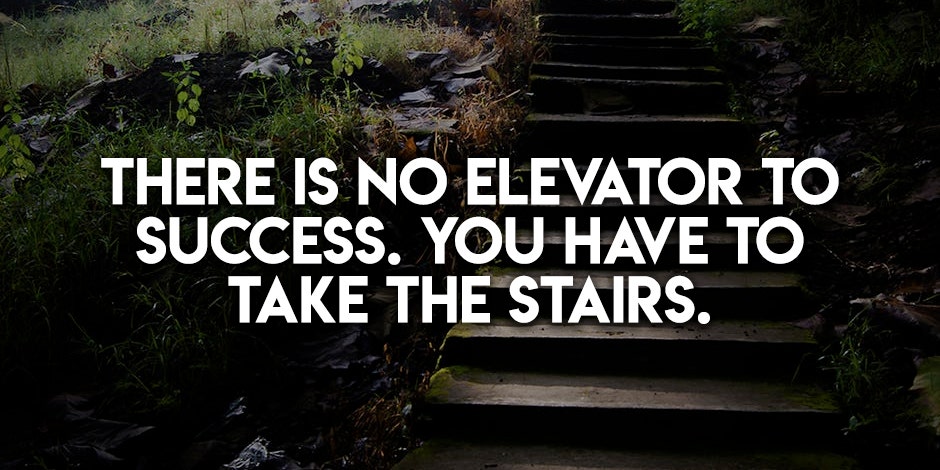
Have you hit a point in college or early on in your professional career after graduation where you have lost all motivation and hope for the future? Have you started questioning yourself? Do you feel like you are stuck in a dark tunnel and cannot see the light?
If your answer to all three of these questions is yes, then you are in the right place for some inspiration.
RELATED: 25 Memes That Perfectly Explain College Life (And The 'Adulting' That Comes Afterwards)
Whether you're college bound, a college student taking your finals or a recent graduate ready for adulthood, you may be feeling like your path in life is foggy. You cannot see very far ahead and you never know when your path will take a sharp turn. Some days you may feel as if you are dragging yourself up a steep mountain, while on other days, you may feel like you are running downhill while you are trying to keep up.
You may even be feeling as if you are being left in the dust while the world keeps turning and even feel scared of your future. What you are feeling is normal.
Sometimes it takes a little longer for everything to fall into place, so don’t get discouraged if something doesn’t go your way right away. It may take longer to find your place. Isn’t it true that the best things in life take time? Stay patient because it will be worth it.
Stay positive in the midst of your failures because your failures make you who you better. Learn from your mistakes so that you are prepared the next time something similar happens.
Don’t let anyone tell you that you are not good enough to do anything. Even though others may doubt you and your capabilities, prove them wrong.
Follow your passion. Don’t let anyone influence what you pursue as a career. Do what you want to do because you are the one who has to go to work every day. Might as well love what you do.
RELATED: Who Is Robert F. Smith? New Details On Billionaire Paying Off Morehouse College Class of 2019's Student Loans
So, here are 100 inspirational quotes for college students and graduates to keep you motivated in the early days of your career, whether it be in college, looking for your first job, or full-on-adulting.
You will find everything you dream for and more with these college quotes. It just takes time.
1. Don’t let anyone block your path to achieving your goals.
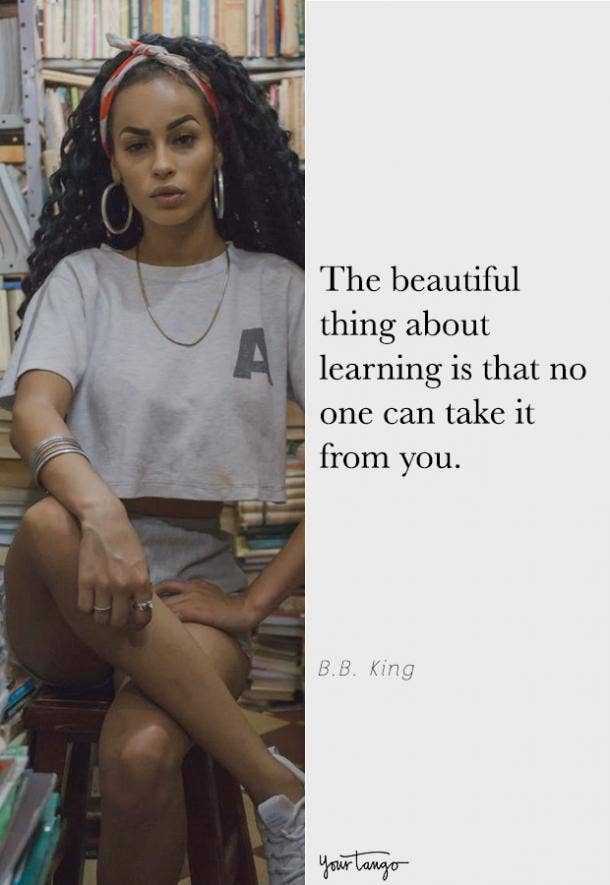
“The beautiful thing about learning is that no one can take it from you.” —B.B. King
2. It’s important to keep trying.
“Our greatest weakness lies in giving up. The most certain way to succeed is always to try just one more time.” —Thomas A. Edison
3. Keep your spirits up. It will keep you going.
“Success consists of going from failure to failure without loss of enthusiasm.” —Winston Churchill
4. There are no magic tricks to achieving your greatest dreams.
“There is no secret to success. It is the result of preparation, hard work, and learning from failure.” —General Colin Powell
5. Prove the people who question you are wrong.
“If you hear a voice within you say ‘you cannot paint,’ then by all means paint, and the voice will be silenced.” —Vincent Van Gogh
6. Some days feel like you are climbing a skyscraper.
“There is no elevator to success. You have to take the stairs.” —Zig Ziglar
7. Your greatest fan is yourself.
“Believe in yourself and all that you are. Know that there is something inside you that is greater than any obstacle.” —Christian D. Larson
8. Sometimes your first plan doesn’t work. That just means you will find a better way.
“The most successful people are those who are good at plan B.” —James Yorke
9. Keep improving yourself.
“The road to success is always under construction.” —Lily Tomlin
10. Your education will take you to places you never thought were possible.
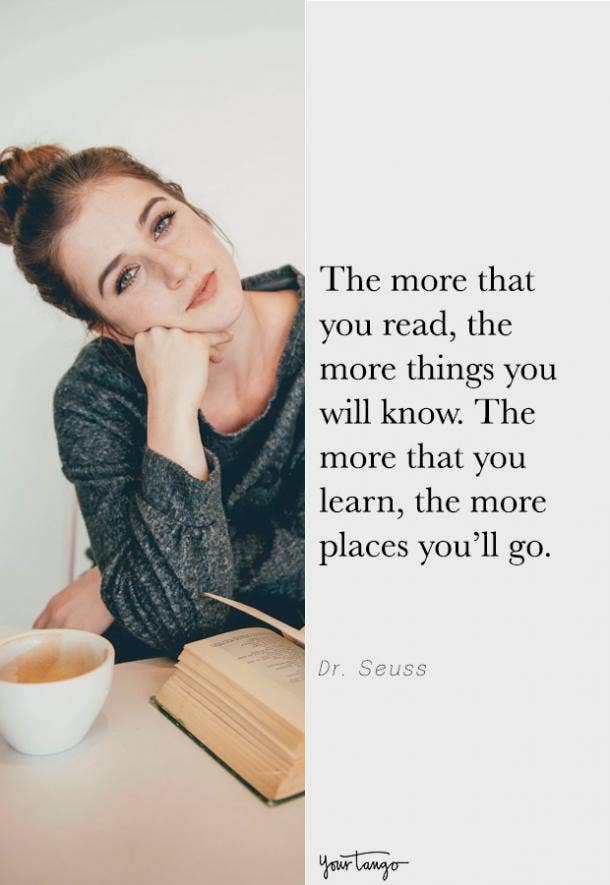
“The more that you read, the more things you will know. The more that you learn, the more places you’ll go.” —Dr. Seuss
RELATED: What You Need To Know About Getting Your Dream Job Right Out Of College
11. Be determined in everything you do.
“You’ve got to get up every morning with determination if you’re going to go to bed with satisfaction.” —George Lorimer
12. Always give 100%.
“The price of success is hard work, dedication to the job at hand, and the determination that whether we win or lose, we have applied the best of ourselves to the task at hand.” —Vince Lombardi
13. Enjoy what you do so that everything else is worth it.
“Success is no accident. It is hard work, perseverance, learning, studying, sacrifice and most of all, love of what you are doing.” —Pele
14. Always try.
“Don’t let what you cannot do interfere with what you can do.” —John Wooden
15. Enjoy every moment.
“College is the best time of your life. When else are your parents going to spend several thousand dollars a year just for you to go to a strange town and get drunk every night?” —David Wood
16. Hard work comes in all shapes and sizes.
“Opportunity is missed by most people because it is dressed in overalls and looks like work.” —Thomas A. Edison
17. Knowledge can change the world.
“Education is the most powerful weapon, which you can use to change the world.” —Nelson Mandela
18. Self-satisfaction makes all your hard work worth it.
“Study hard, no matter if it seems impossible, no matter if it takes time, no matter if you have to be up all night, just remember that the feeling of success is the best thing in the entire world.” —khangal_wehearit
19. You will achieve bigger and better things in the future.
“There are far, far better things ahead than any we leave behind.” —C.S. Lewis
20. Work hard now so that you can rest later.

“Education is the passport to the future, for tomorrow belongs to those who prepare for it today.” —Malcolm X
21. Stay aware of all of your options.
“When one door closes, another opens; but we often look so long and so regretfully upon the closed door that we do not see the one which has opened for us.” —Alexander Graham Bell
22. You may fail, but is it really failing?
“Shoot for the moon. Even if you miss you’ll land among the stars.” —Les Brown
23. Because of teachers, students become the best they can be.
“It is the supreme art of the teacher to awaken joy in creative expression and knowledge.” —Albert Einstein
24. The first step is deciding to do something.
“Every accomplishment starts with the decision to try.” —Gail Devers
25. Spark interest.
“Education is not to reform students or amuse them or to make them expert technicians. It is to unsettle their minds, widen their horizons, inflame their intellects, teach them to think straight, if possible.” —Robert M. Hutchins
26. Sometimes it’s best to just observe.
“You never really learn much from hearing yourself speak.” —George Clooney
27. You learn from your failures.
“I’ve failed over and over and over and over again in my life. And that is why I succeed.” —Michael Jordan
28. There is no easy way to success.
“It will not happen cutting corners, taking shortcuts or looking for the easy way! There’s only hard work, late nights, early mornings, practice, repetition, study and discipline.” —nimo_wehearit
29. Outwardly express confidence even if you don’t feel it.
“Just believe in yourself. Even if you don’t pretend that you do and, at some point, you will.” —Venus Williams
30. Your best is all that can be asked for.
“Do the best you can until you know better. Then when you know better, do better.” —Maya Angelou
31. Only you can hold yourself back.

“Doubt kills more dreams than failure ever will.” —Karim Seddiki
32. Stress is not fashionable.
“Stress does not go with my outfit.” —#bossbabe
33. Sometimes you succeed where you least expect it.
“It took me fifteen years to discover I had no talent for writing, but I couldn’t give it up because by then I was too famous.” —Robert Benchley
34. You won’t get anywhere if you don’t go out and try.
“It had long since come to my attention that people of accomplishment rarely sat back and let things happen to them. They went out and happened to things.” —Leonardo da Vinci
35. Sometimes it’s hard to believe you can do some things.
“It always seems impossible until it’s done.” —Nelson Mandela
36. Sometimes you will achieve greater things by staying small instead of shooting big and losing yourself in the process.
“Great things are done by a series of small things brought together.” —Vincent van Gogh
37. Believe in yourself and you will believe in your future.
“The future belongs to those who believe in the beauty of their dreams.” —Eleanor Roosevelt
38. Persist. Persist. Persist.
“You are capable of more than you know. Choose a goal that seems right for you and strive to be the best, however hard the path. Aim high. Behave honorably. Prepare to be alone at times, and to endure failure. Persist! The world needs all you can give.” —E.O. Wilson
39. Do the hard work now so that you can reap the benefits later.
“An investment in knowledge pays the best interest.” —Benjamin Franklin
40. The best job in the world is something you love doing.

“Follow your passion. It will lead you to your purpose.” —Oprah
41. Let your passions drive what you do with your life.
“Turning your passion into your job is easier than finding a job that matches your passion.” —Seth Godin
42. Always be the best you can be so that others will shoot to do the same.
“You get the best out of others when you give the best of yourself.” —Harvey S. Firestone
43. What is perfection?
“Strive for progress, not perfection.” —Unknown
44. Stay positive.
“Instead of looking at the hundred reasons to quit, look at the thousand reasons not to give up.” —Kushanowizoom

45. Courage is the drive to do what you want.
“All our dreams can come true if we have the courage to pursue them.” —Walt Disney
46. Believe you can achieve your goals.
“To accomplish great things, we must not only act, but also dream, not only plan, but also believe.” — Anatole France
47. Teachers give students the tools to succeed.
“If you have to put someone on a pedestal, put teachers. They are society’s heroes.” —Guy Kawasaki
48. You can always be better, even if you have mastered something.
“Do not make your goal to be the best. Best is a label. It’s something someone else decides for you. ‘Better’ is more personal.” —Baryshnikov
49. Everything in life is complicated.
“If people do not believe that mathematics is simple, it’s only because they do not realize how complicated life is.” —John Von Neumann
50. When you become too comfortable, you aren’t pushing yourself.

“Your biggest risk isn’t failing, it’s getting too comfortable.” —Drew Houston
RELATED: 20 Quotes About Strength To Help You Get Over A Job Rejection
51. Always be kind to others and others will be kind to you.
“Kindness is the language which the deaf can hear and the blind can see.” —Mark Twain
52. Every little thing does not warrant panic.
“Rule no.1 is: Don’t sweat the small stuff. Rule no. 2 is: It’s all small stuff.” —Robert Eliot
53. You can do anything.
“I can do all things through Christ who strengthens me.” —Philippians 4:13
54. Bring your own habits to the table.
“Quality is not an act, it is a habit.” —Aristotle
55. It may be scary to take the road less traveled, but it will lead you to the best rewards.
“Follow your fear.” —Tina Fey
56. You are strong when you can succeed in the midst of destruction.
“A successful man is one who can lay a firm foundation with the bricks others have thrown at him.” —David Brinkley
57. Not doing something will keep your life unfulfilled.
“If you don’t go after what you want, you’ll never have it. If you don’t ask, the answer is always no. If you don’t step forward, you’re always in the same place.” —Nora Roberts
58. Your attitude makes you excellent.
“Excellence is not a skill. It is an attitude.” —Ralph Marston
59. It’s rewarding to help others.
“Go into the world and do well. But more importantly, go into the world and do good.” —Minor Myers Jur
60. Listen to your heart.

“In life you make the small decisions with your head and the big decisions with your heart.” —Omid Kordgstani
61. Don’t let worry stop you from doing something.
“Worry gives a small thing a big shadow.” —Swedish Proverb
62. Failure is less painful when you enjoy what you do.
“I learned many great lessons from my father, not the least of which was that you can fail at what you don’t want, so you might as well take a chance on doing what you love.” —Jim Carrey
63. Your success is from being happy.
“Success is not the key to happiness. Happiness is the key to success. If you love what you are doing, you will be successful.” —Albert Schweitzer
64. Always give 110%.
“The difference between ordinary and extraordinary is that little extra.” —Jimmy Johnson
65. You will never stumble onto success, you will work for it.
“Productivity is never an accident. It is always the result of a commitment to excellence, intelligent planning, and focused effort,” —Paul J. Meyer
66. What may be hard now will make you stronger in the long run.
“Hardships often prepare ordinary people for an extraordinary destiny.” —C.S. Lewis
67. Make your dreams a reality.
“A dream you dream alone is only a dream. A dream you dream together is reality.” —Yoko Ono
68. Be willing to help others achieve your dreams.
“If you don’t build your dreams, someone will hire you to help build theirs.” —Tony Gaskin
69. Dreams are more interesting than reality.
“Reality is wrong. Dreams are for real.” —Tupac Shakur
70. Make your dreams happen.

When your dreams becoming reality, they’re no longer your dreams.” —Hugh Jackman
RELATED: 12 Lessons From An Emotional Dad On His Little Girl's Graduation Day
71. Being busy doesn’t mean you are accomplishing anything.
“Focus on being productive instead of busy.” —@examgradebooster
72. Sometimes what is important will not reveal itself until you are ready.
“When the student is ready, the master appears.” —Buddhist Proverb
73. Your imagination is where everything begins.
“Imagination… is the elixir of life, the seed of greatness.” —Melowpark College
74. Little accomplishments every day makes your life have purpose.
“Success is the sum of small efforts, repeated day in and day out.” —Robert Collier
75. Don’t get stuck in the past.
“There are far better things ahead than any we leave behind.” —C.S. Lewis
76. Believing in something makes it tangible.
“You have to believe it before you see it.” —Unknown
77. Being a good person is better than only being a successful person.
“Try not to become a man of success. Rather become a man of value.” —Albert Einstein
78. Embrace the rules as a guide to your future.
“Instead of freaking out about these constraints, embrace them. Let them guide you.” —37 Signals
79. Are you confused yet?
“The problem is not the problem. The problem is your attitude about the problem. Do you understand?” —Captain Jack Sparrow
80. Start small and soon you will be doing big things.
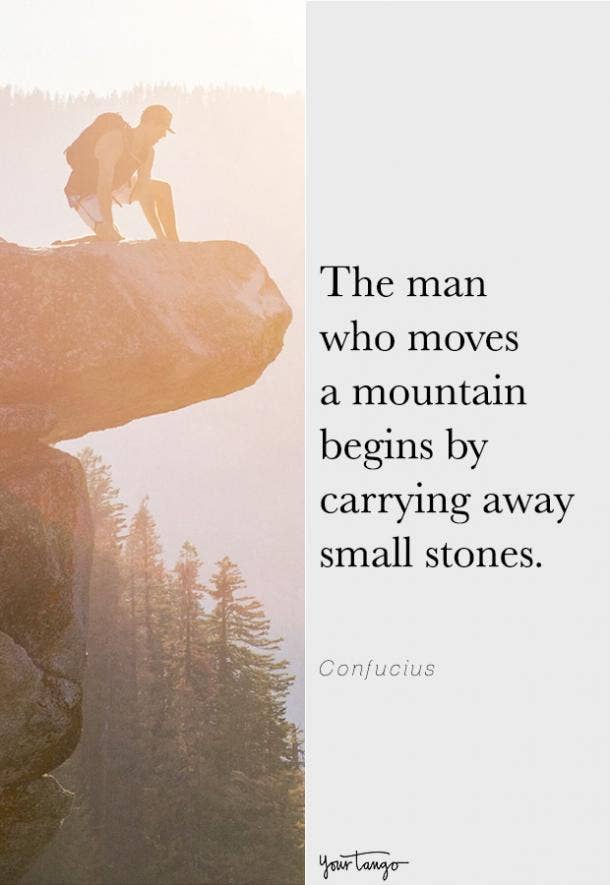
“The man who moves a mountain begins by carrying away small stones.” —Confucius
81. Nothing is a better motivator than failure.
“It’s the pain and failure that teaches you the best lesson in life and motivates you to rebuild yourself and stand again with a robust faith.” —Priti Chaubey
82. It is important to remember who supports you.
“Whenever you start to doubt yourself. Remember those who believe in you.” —PictureQuotes.com
83. The sky’s the limit.
“Don’t limit yourself. Many people limit themselves to what they think they can do. You can go as far as your mind lets you. What you believe, remember, you can achieve.” —Mary Kay Ash
84. There is always a way to make things better.
“Happiness can be found even in the darkest of times if one only remembers to turn on the light.” —Albus Dumbledore
85. Believing in yourself is the biggest factor in success.
Working hard is important, but there is something that matters even more: Believing in yourself.” —Harry Potter
86. You never stop learning.
“Life itself is your teacher, and you are in a state of constant learning.” —Bruce Lee
87. Sometimes you underestimate yourself.
“Promise me you’ll always remember: You’re braver than you believe, & stronger than you seem, & smarter than you think.” —A.A, Milne
88. Keep moving towards your greatest dreams.
“Go confidently in the direction of your dreams. Live the life you have imagined.” —Henry David Thoreau
89. Always be supportive of yourself and to those around you.
“I follow three rules: Do the right thing, do the best you can, and always show people you care.” —Lou Holtz
90. Knowing who you are is more important when you look at your past and when you move towards the future.
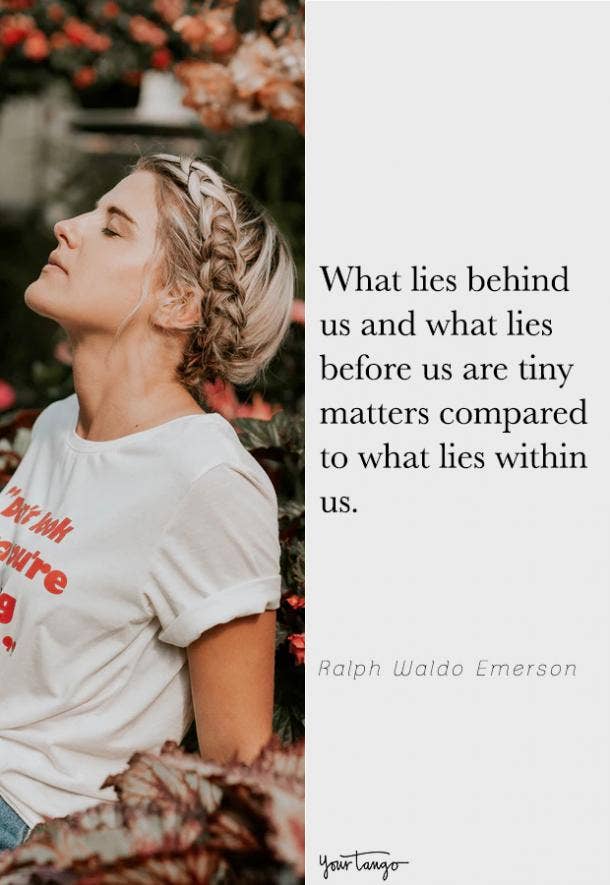
“What lies behind us and what lies before us are tiny matters compared to what lies within us.” —Ralph Waldo Emerson
91. Don’t let others tell you how to live your life.
“Your time is limited, so don’t waste it living someone else’s life.” —Steve Jobs
92. If you believe you can do it then you can.
“Believe deep down in your heart that you’re destined to do great things.” —Joe Paterno
93. Self-confidence opens the door to success.
“Optimism is the faith that leads to achievement. Nothing can be done without hope and confidence.” —Helen Keller
94. Sometimes people get upset that others are so positive, but your positivity keeps you going.
“A positive attitude may not solve all your problems, but it will annoy enough people to make it worth the effort.” —Herm Albright
95. Defy the odds.
“The greatest pleasure in life is doing what people say you cannot do.” —Walter Bagehot
96. If you believe you can do it, then nothing will stop you from succeeding.
“Everything begins inside your mind. With the right mindset you will succeed.” —Gymquotes.com
97. Don’t do anything that will put your future at risk.
“During exams, students look up for inspiration, down in desperation, and left and right for information.” —searchquotes.com
98. When you put in the work, you make yourself who you want to be.
“It’s not about perfect. It’s about effort. And when you bring that effort every single day, that’s where transformation happens. That’s how change occurs.” —dahnyoga.com
99. You can create your own destiny.
“If opportunity doesn’t knock, build a door.” —Milton Berle
100. You control where you go in the future.

“You have brains in your head. You have feet in your shoes. You can steer yourself any direction you choose.” —Dr. Seuss
RELATED: People With These 8 Personality Traits Have The Best, Most Fulfilling Careers
Love is life’s greatest gift, which is why people have a passion for love quotes - and we’ve got you covered. When it comes to saying “I love you” , the truth about marriage, or even finding the perfect love quote for your guy , we have all the cute (or !) quotes you need.
Emily Francos is a writer who covers astrology, pop culture and relationship topics.

Ready, Set, Apply! Beating the Admissions Game

What Do Universities Look For? 15 Quotes from Admissions Directors and Deans
Ever wonder admissions officers and directors think when they read applications here are 15 quotes directly from admissions officers on what makes a student stand out..

"Most admissions officers will tell you that the personal statement is their absolute favorite part of the application. It's really a chance for us to get to know who you are, and it's really your major opportunity to speak up for yourself . . . [It is] your chance to say, 'Hello, this is me, and here's what matters to me and here's what I'd like to tell you about myself." Marcia Landesman, Associate Director of Undergraduate Admissions, Yale University
"I like reading a personal story that is tied to real life. I like it when I can hear a student's voice. Storytellers are always good." Kim Bryant, Assistant Director of Admissions, University of Michigan
Our admissions officers are looking for something that is authentic and imperfect, and somebody who is thinking differently." Amy Gutmann, President of the University of Pennsylvania
"More than anything, I want to encourage students to write from the heart. Use the words that come naturally to you--avoid the thesaurus. Some of the worst college essays I’ve read were actually written quite well in terms of grammar, sentence structure, and organization, but the student’s unique voice had been lost through editing feedback from a well-intentioned adult. There is no voice more charming to an admissions reviewer than the natural writing voice of a high school senior." Azure Brown, former Senior Admissions Evaluator for the University of California
"[T]ry to convey your voice and style in your words. This is the one spot on your application where your personality gets to shine, so don't treat this like a formal school assignment." Jeannine Lalonde, Associate Dean of Admissions, University of Virginia
"It’s true that your voice is what we are looking for. When you write your college essay, use your authentic voice. If you’re a serious person, write your essay with a serious voice. If you’re a funny person, be funny. If you’re not a funny person, your college essay might not be the best place to try on that funny writer voice for the first time." Ken Anselment, Dean of Admissions and Financial Aid, Lawrence University
"The tone does not have to be formal, and the language does not have to be particularly sophisticated. In fact, sometimes those can get in the way of the reader getting a sense of you. You should approach it as if it were a conversation you were having with an adult who is particularly interested in what you have to say. Not as casual as if you were speaking with a friend or classmate, but not as formal as if it were a paper you were writing for an assignment. If you read your essay out loud, and it sounds like something you’d say to an adult sitting across from you listening to you with interest, you’ll be on the right track." Christopher Guttentag, Dean of Undergraduate Admissions, Duke University
“The best essays are the ones where we don’t just want to admit the student, we want to take them out for coffee once they’re here. We’re not admitting academic machines—we’re admitting classmates and roommates and kids who will make thoughtful contributions to our community.” Macy Lenox, Associate Dean of Admissions, University of Virginia
"The essay is more of an opportunity for the applicant to share their character, unique passions and interests, and meaningful experiences." Liz Cheron, Associate Director for Admissions, Northeastern University
"I'm interested in who you are, and why I should accept you as an admissions counselor. What makes you interesting is a really important aspect of your essay Matthew Boyce, Senior Associate Director of Undergraduate Admissions, George Mason University
"Who are you? It's about being reflective about your life, about your experiences, about what you're doing. I always tell students it's not the 'what' you're doing, but the 'how and why' you are doing them because I can clearly see 'what' you're doing, but 'how and why,' I can't see that, I can't jump into your mind. So when I put down your application, I want to feel like I just stepped out of your life." Eddie Picket, Assistant Director of Admissions, Tufts University
"The biggest mistake is simply to rehash your resume. It's lazy and not creative. There's ample amount of real estate on any application for you to talk about your resume-like experiences in other sections. The essay is your forum to tell an admissions officer and committee a story." Shawn Abbott, Assistant Vice President and Dean of Admissions, New York University
“I've always enjoyed essays that enable me to learn about the applicant's personality. Whether that's an essay about a love (or hatred) of cheese, a desire to learn multiple languages, or to study environmental engineering — I like learning how a student thinks.” Christina DeCesare, former Associate Director of Admissions, New York University
"We always said when I was an admissions officer, we want it to be so personal to the student that you couldn't put anyone else's name on that essay and have it still be true about that other student." Grace Kim, former admissions officer, Stanford University
"The essay is a unique opportunity to share your story and what is meaningful or important to you. Write about a topic that helps the university understand you as a unique individual. Write about how you would contribute to the campus community." Michael Davis, Associate Director of Admissions, University of North Carolina, Chapel Hill
Thanks for reading Ready, Set, Apply! Beating the Admissions Game! Subscribe for free to receive new posts and support my work.
Ready for more?
Applying To College Quotes
We've searched our database for all the quotes and captions related to Applying To College . Here they are! All 100 of them:

Tips for Online Students , Tips for Students
Best College Quotes on the Planet. Be Inspired.
Updated: July 25, 2022
Published: June 13, 2019
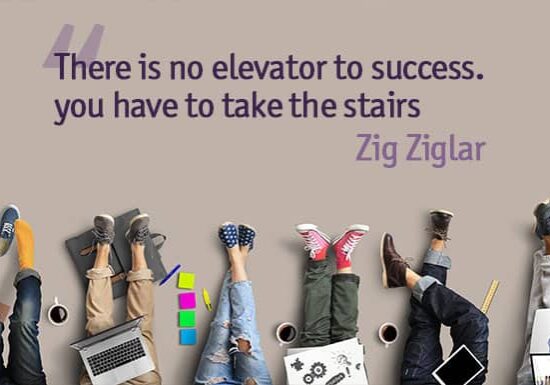
College will change your life but it may also challenge you in surprising ways. Here are some college quotes to help keep you motivated to persevere.
Looking for college quotes to boost your morale? Well, you’ve come to the right place!
As a pivotal experience in any student’s life, college provides so much more than academic knowledge. Beyond learning within classroom walls or online , college sets you up for the future by helping to develop many skills ranging from critical thinking, presentation, communication, business, problem-solving and more. Moreover, college helps to develop your personal sense of self .
While the years you spend earning your degree will no doubt be life-changing, they will also bring with them some challenges. However, it’s the perseverance to get through such challenges that will reap all the rewards in the future. For a prospective or current student, here are some college quotes to help keep you motivated and inspired on your journey!

Source: Unsplash
The importance of education.
Why is education important? Firstly, most employers prefer to hire those with undergraduate or graduate degrees. Not only will your salary be higher with a degree, but the completion of one’s education serves as a signal to your employer that you can stick with a task and have developed analytical and communication skills that will benefit the company.
Of course, being inside a physical school is not the only place to earn your education. In fact, standard education varies around the world and sometimes, online education can benefit students more so than their home country’s system. Regardless if you earn your degree at an online university like University of the People , study abroad at an international institution, take a gap year, or enroll in a traditional campus, the importance of education does not go unnoticed by you or those around you.
“An investment in knowledge always pays the best interest.” – Benjamin Franklin
“The function of education is to teach one to think intensively and to think critically. Intelligence plus character––that is the goal of true education.” – Dr. Martin Luther King Jr.
“A college education should equip one to entertain three things: a friend, an idea and oneself.” – Thomas Ehrlich
“When we make college more affordable, we make the American dream more achievable.” – William J. Clinton
“Do not be afraid to ask for help. Nobody gets through college on their own.” – Michelle Obama
On Hard Work, Failure and Success
Nothing worthwhile comes easy. While everyone defines success differently, there’s generally just one way to get to it and that’s through hard work and, yes, even failure. When attempting to accomplish any task, you cannot be afraid to fail for it is through failure that you can learn the most about yourself and the process.
For example, when studying for an exam, you may try your hardest but come out with a grade that is less than what you hoped for. While you may consider that to be a “failure,” you can no doubt take a lesson away and try a different study method the next time or ask for help if you don’t understand something. It takes trial and error to make it through most college courses, so don’t allow for anything to stop you from trying and editing your process!
“There is no secret to success. It is the result of preparation, hard work, and learning from failure.” – General Colin Powell
“College has given me the confidence I need to fail.” – Jarod Kintz
“Success is the sum of small efforts, repeated day-in and day-out.” – Robert Collier
Tips to Stay Motivated
Here are some ways to stay motivated through your college career.
- Take study breaks — here’s how
- Give yourself rewards for accomplishments
- Schedule your time so you can balance a social life, work and school
- Enroll in classes you’re generally interested in
- Take extracurricular activities

On Time Management
One of the quickest lessons you’ll learn while studying in any institution, online or on-campus, is that time management is absolutely pivotal in college for success and mental health. While you may be used to having your schedule made for you from high school, college places more of the onus on the student to set their schedule and manage your time.
“Don’t be fooled by the calendar. There are only as many days in the year as you make use of. One man gets only a week’s value out of a year while another man gets a full year’s value out of a week.” – Charles Richards
“The key is in not spending time, but in investing it.” – Stephen R. Covey
“Make use of time, let not advantage slip.” – William Shakespeare
Tips to Manage Time
There are many ways to manage your time and they will be subjective, but to help alleviate stress, here are a few ways maximize productivity and opportunity:
- Go to sleep early
- Use a planner to schedule blocks for study, work, and fun
- Wake up early and try to avoid using your phone during the first part of your morning
- Organize a to-do list in order or priority and deadlines. If there are tasks that will be quick and easy to complete, get those out the way first to streamline momentum
- Don’t deny yourself time to relax and recharge
Never Give Up
Depending on your degree, you could be in school for many years. While it’s easy to start to feel fatigued by the coursework, tests and exams, it will be your perseverance that helps you achieve your dreams! There’s a reason you began the process in the first place, so remind yourself of that and keep on going until you get there.
“You’ve got to get up every morning with determination if you’re going to go to bed with satisfaction.” – George Lorimer
“Excellence is not a skill. It is an attitude.” – Ralph Marston
“Great things are not done by impulse, but by a series of small things brought together.” – Vincent van Gogh
“If you don’t go after what you want, you’ll never have it. If you don’t ask, the answer is always no. If you don’t step forward, you’re always in the same place.” – Nora Roberts
“You are never too old to set another goal or to dream a new dream. – C.S. Lewis
The Bottom Line
The truth of the matter is that college will both challenge and change you. It will open up opportunities within the workforce and widen your network of friends. However, you will have to take control of your time and push yourself beyond your limits to be able to earn your degree and achieve your dreams. But with a positive attitude and some useful resources, you can no doubt get past any challenge that may come your way!
Related Articles
What are your chances of acceptance?
Calculate for all schools, your chance of acceptance.
Your chancing factors
Extracurriculars.
21 Stellar Common App Essay Examples to Inspire Your College Essay
What’s covered:, what makes a good common app essay, is your common app essay strong enough.
When you begin writing your Common App essay, having an example to look at can help you understand how to effectively write your college essay so that it stands apart from others.
These Common App essay examples demonstrate a strong writing ability and answer the prompt in a way that shows admissions officers something unique about the student. Once you’ve read some examples and are ready to get started, read our step-by-step guide for how to write a strong Common App essay.
Please note: Looking at examples of real essays students have submitted to colleges can be very beneficial to get inspiration for your essays. You should never copy or plagiarize from these examples when writing your own essays. Colleges can tell when an essay isn’t genuine and will not view students favorably if they plagiarized.
Read our Common App essay breakdown to get a comprehensive overview of this year’s supplemental prompts.
It’s Personal
The point of the Common App essay is to humanize yourself to a college admissions committee. The ultimate goal is to get them to choose you over someone else! You will have a better chance of achieving this goal if the admissions committee feels personally connected to you or invested in your story. When writing your Common App essay, you should explore your feelings, worldview, values, desires, and anything else that makes you uniquely you.
It’s Not Cliché
It is pretty easy to resort to clichés in college essays. This should be actively avoided! CollegeVine has identified the immigrant’s journey, sports injuries, and overcoming a challenging course as cliché topics . If you write about one of these topics, you have to work harder to stand out, so working with a more nuanced topic is often safer and easier.
It’s Well-Done
Colleges want good writers. They want students who can articulate their thoughts clearly and concisely (and creatively!). You should be writing and rewriting your essays, perfecting them as you go. Of course, make sure that your grammar and spelling are impeccable, but also put in time crafting your tone and finding your voice. This will also make your essay more personal and will make your reader feel more connected to you!
It’s Cohesive
Compelling Common App essays tell a cohesive story. Cohesion is primarily achieved through effective introductions and conclusions , which often contribute to the establishment of a clear theme or topic. Make sure that it is clear what you are getting at, but also don’t explicitly state what you are getting at—a successful essay speaks for itself.
Common App Essay Examples
Here are the current Common App prompts. Click the links to jump to the examples for a specific prompt, or keep reading to review the examples for all the prompts.
Prompt #1 : Some students have a background, identity, interest, or talent that is so meaningful they believe their application would be incomplete without it. If this sounds like you, then please share your story.
Prompt #2 : The lessons we take from obstacles we encounter can be fundamental to later success. Recount a time when you faced a challenge, setback, or failure. How did it affect you, and what did you learn from the experience?
Prompt #3 : Reflect on a time when you questioned or challenged a belief or idea. What prompted your thinking? What was the outcome?
Prompt #4 : Reflect on something that someone has done for you that has made you happy or thankful in a surprising way. How has this gratitude affected or motivated you? (NOTE: We only have an example for the old prompt #4 about solving a problem, not this current one)
Prompt #5 : Discuss an accomplishment, event, or realization that sparked a period of personal growth and a new understanding of yourself or others.
Prompt #6 : Describe a topic, idea, or concept you find so engaging that it makes you lose all track of time. Why does it captivate you? What or who do you turn to when you want to learn more?
Prompt #7 : Share an essay on any topic of your choice. It can be one you’ve already written, one that responds to a different prompt, or one of your own design.
Note: Names have been changed to protect the identity of the author and subjects.
Prompt #1: Some students have a background, identity, interest, or talent that is so meaningful they believe their application would be incomplete without it. If this sounds like you, then please share your story.
Prompt #1, example #1.
The room was silent except for the thoughts racing through my head. I led a spade from my hand and my opponent paused for a second, then played a heart. The numbers ran through my mind as I tried to consider every combination, calculating my next move. Finally, I played the ace of spades from the dummy and the rest of my clubs, securing the contract and 620 points when my partner ruffed at trick five. Next board.
It was the final of the 2015 United States Bridge Federation Under-26 Women’s Championship. The winning team would be selected to represent the United States in the world championship and my team was still in the running.
Contract bridge is a strategic and stochastic card game. Players from around the world gather at local clubs, regional events, and, in this case, national tournaments.
Going into the tournament, my team was excited; all the hours we had put into the game, from the lengthy midnight Skype sessions spent discussing boards to the coffee shop meetings spent memorizing conventions together, were about to pay off.
Halfway through, our spirits were still high, as we were only down by fourteen international match points which, out of the final total of about four hundred points, was virtually nothing and it was very feasible to catch up. Our excitement was short-lived, however, as sixty boards later, we found that we had lost the match and would not be chosen as the national team.
Initially, we were devastated. We had come so close and it seemed as if all the hours we had devoted to training had been utterly wasted. Yet as our team spent some time together reflecting upon the results, we gradually realized that the true value that we had gained wasn’t only the prospect of winning the national title, but also the time we had spent together exploring our shared passion. I chatted with the winning team and even befriended a few of them who offered us encouragement and advice.
Throughout my bridge career, although I’ve gained a respectable amount of masterpoints and awards, I’ve realized that the real reward comes from the extraordinary people I have met. I don’t need to travel cross-country to learn; every time I sit down at a table whether it be during a simple club game, a regional tournament or a national event, I find I’m always learning.
I nod at the pair that’s always yelling at each other. They teach me the importance of sportsmanship and forgiveness.
I greet the legally blind man who can defeat most of the seeing players. He reminds me not to make excuses.
I chat with the friendly, elderly couple who, at ages ninety and ninety-two, have just gotten married two weeks ago. They teach me that it’s never too late to start anything.
I talk to the boy who’s attending Harvard and the girl who forewent college to start her own company. They show me that there is more than one path to success.
I congratulate the little kid running to his dad, excited to have won his very first masterpoints. He reminds me of the thrill of every first time and to never stop trying new things.
Just as much as I have benefitted from these life lessons, I aspire to give back to my bridge community as much as it has given me. I aspire to teach people how to play this complicated yet equally as exciting game. I aspire to never stop improving myself, both at and away from the bridge table.
Bridge has given me my roots and dared me to dream. What started as merely a hobby has become a community, a passion, a part of my identity. I aspire to live selflessly and help others reach their goals. I seek to take risks, embrace all results, even failure, and live unfettered from my own doubt.
This student draws readers in with a strong introduction. The essay starts ambiguous—“I led with a spade”—then intrigues readers by gradually revealing more information and details. This makes the reader want to keep reading (which is super important!) As the writer continues, there is a rather abrupt tone shift from suspenseful to explanatory with statements like “It was the final of the 2015 United States Bridge Federation Under-26 Women’s Championship” and “Contract bridge is a strategic and stochastic card game.” If you plan to start with an imagery-heavy, emotional, suspenseful, or dramatic introduction, you will need to transition to the content of your essay in a way that does not feel abrupt.
You will often hear that essays need to “show, not tell.” This essay actually does both. First, the student tells readers the importance of bridge, saying “we gradually realized that the true value that we had gained wasn’t only the prospect of winning the national title, but also the time we had spent together exploring our shared passion” and “I’ve realized that the real reward comes from the extraordinary people I have met.” Then, the student shows the lessons they have learned from bridge through a series of parallel sentences: “I nod… sportsmanship and forgiveness” “I greet… not to make excuses” “I chat… it’s never too late to start anything” and so on. This latter strategy is much more effective than the former and is watered down because the student has already told us what we are supposed to get out of these sentences. Remember that your readers are intelligent and can draw their own conclusions. Avoid summarizing the moral of your story for them!
Overall, this essay is interesting and answers the prompt. We learn the importance of bridge to this student. The student has a solid grasp of language, a high-level vocabulary, and a valuable message, though they would be better off if they avoided summarizing their point and created more seamless transitions.
Prompt #1, Example #2
Growing up, I always wanted to eat, play, visit, watch, and be it all: sloppy joes and spaetzle, Beanie Babies and Steiff, Cape Cod and the Baltic Sea, football and fussball, American and German.
My American parents relocated our young family to Berlin when I was three years old. My exposure to America was limited to holidays spent stateside and awfully dubbed Disney Channel broadcasts. As the few memories I had of living in the US faded, my affinity for Germany grew. I began to identify as “Germerican,” an ideal marriage of the two cultures. As a child, I viewed my biculturalism as a blessing. I possessed a native fluency in “Denglisch” and my family’s Halloween parties were legendary at a time when the holiday was just starting to gain popularity outside of the American Sector.
Insidiously, the magic I once felt in loving two homes was replaced by a deep-rooted sense of rootlessness. I stopped feeling American when, while discussing World War II with my grandmother, I said “the US won.” She corrected me, insisting I use “we” when referring to the US’s actions. Before then, I hadn’t realized how directly people associated themselves with their countries. I stopped feeling German during the World Cup when my friends labeled me a “bandwagon fan” for rooting for Germany. Until that moment, my cheers had felt sincere. I wasn’t part of the “we” who won World Wars or World Cups. Caught in a twilight of foreign and familiar, I felt emotionally and psychologically disconnected from the two cultures most familiar to me.
After moving from Berlin to New York at age fifteen, my feelings of cultural homelessness thrived in my new environment. Looking and sounding American furthered my feelings of dislocation. Border patrol agents, teachers, classmates, neighbors, and relatives all “welcomed me home” to a land they could not understand was foreign to me. Americans confused me as I relied on Urban Dictionary to understand my peers, the Pledge of Allegiance seemed nationalistic, and the only thing familiar about Fahrenheit was the German after whom it was named. Too German for America and too American for Germany, I felt alienated from both. I wanted desperately to be a member of one, if not both, cultures.
During my first weeks in Scarsdale, I spent my free time googling “Berlin Family Seeks Teen” and “New Americans in Scarsdale.” The latter search proved most fruitful: I discovered Horizons, a nonprofit that empowers resettled refugees, or “New Americans,” to thrive. I started volunteering with Horizon’s children’s programs, playing with and tutoring young refugees.
It was there that I met Emily, a twelve-year-old Iraqi girl who lived next to Horizons. In between games and snacks, Emily would ask me questions about American life, touching on everything from Halloween to President Obama. Gradually, my confidence in my American identity grew as I recognized my ability to answer most of her questions. American culture was no longer completely foreign to me. I found myself especially qualified to work with young refugees; my experience growing up in a country other than that of my parents’ was similar enough to that of the refugee children Horizons served that I could empathize with them and offer advice. Together, we worked through conflicting allegiances, homesickness, and stretched belonging.
Forging a special, personal bond with young refugees proved a cathartic outlet for my insecurities as it taught me to value my past. My transculturalism allowed me to help young refugees integrate into American life, and, in doing so, I was able to adjust myself. Now, I have an appreciation of myself that I never felt before. “Home” isn’t the digits in a passport or ZIP code but a sense of contentedness. By helping a young refugee find comfort, happiness, and home in America, I was finally able to find those same things for myself.
Due to their endearing (and creative) use of language—with early phrases like “sloppy joes and spaetzle” as well as “Germerican” and “Denglisch”—readers are inclined to like this writer from the get-go. Though the essay shifts from this lighthearted introduction to more serious subject matter around the third paragraph, the shift is not abrupt or jarring. This is because the student invites readers to feel the transition with them through their inclusion of various anecdotes that inspired their “feelings of cultural homelessness.” And our journey does not end there—we go back to America with the student and see how their former struggles become strengths.
Ultimately, this essay is successful due to its satisfying ending. Because readers experience the student’s struggles with them, we also feel the resolution. The conclusion of this essay is a prime example of the “Same, but Different” technique described in our article on How to End Your College Essay . As the student describes how, in the end, their complicated cultural identity still exists but transitions to a source of strength, readers are left feeling happy for the student. This means that they have formed a connection with the student, which is the ultimate goal!
Prompt #1, Example #3
“1…2…3…4 pirouettes ! New record!” My friends cheered as I landed my turns. Pleased with my progress, I gazed down at my worn-out pointe shoes. The sweltering blisters, numbing ice-baths, and draining late-night practices did not seem so bad after all. Next goal: five turns.
For as long as I can remember, ballet, in all its finesse and glamor, had kept me driven day to day. As a child, the lithe ballerinas, donning ethereal costumes as they floated across the stage, were my motivation. While others admired Messi and Adele, I idolized Carlos Acosta, principal dancer of the Royal Ballet.
As I devoted more time and energy towards my craft, I became obsessed with improving my technique. I would stretch for hours after class, forcing my leg one inch higher in an effort to mirror the Dance Magazine cover girls . I injured my feet and ruined pair after pair of pointe shoes, turning on wood, cement, and even grass to improve my balance as I spun. At competitions, the dancers with the 180-degree leg extensions, endless turns, and soaring leaps—the ones who received “Bravos!” from the roaring audience—further pushed me to refine my skills and perfect my form. I believed that, with enough determination, I would one day attain their level of perfection. Reaching the quadruple- pirouette milestone only intensified my desire to accomplish even more.
My efforts seemed to have come to fruition two summers ago when I was accepted to dance with Moscow’s Bolshoi Ballet at their renowned New York City summer intensive. I walked into my first session eager to learn from distinguished ballet masters and worldly dancers, already anticipating my improvement. Yet, as I danced alongside the accomplished ballerinas, I felt out of place. Despite their clean technique and professional training, they did not aim for glorious leg extensions or prodigious leaps. When they performed their turn combinations, most of them only executed two turns as I attempted four.
“Dancers, double- pirouettes only.”
Taken aback and confused, I wondered why our teacher expected so little from us. The other ballerinas seemed content, gracing the studio with their simple movements.
As I grew closer with my Moscow roommates, I gradually learned that their training emphasized the history of the art form instead of stylistic tricks. Rather than show off their physical ability, their performances aimed to convey a story, one that embodied the rich culture of ballet and captured both the legacy of the dancers before them and their own artistry. As I observed my friends more intently in repertoire class, I felt the pain of the grief-stricken white swan from Swan Lake , the sass of the flirtatious Kitri from Don Quijote, and I gradually saw what I had overlooked before. My definition of talent had been molded by crowd-pleasing elements—whirring pirouettes , gravity-defying leaps, and mind-blowing leg extensions. This mindset slowly stripped me from the roots of my passion and my personal connection with ballet.
With the Bolshoi, I learned to step back and explore the meaning behind each step and the people behind the scenes. Ballet carries history in its movements, from the societal values of the era to each choreographer’s unique flair. As I uncovered the messages behind each pirouette, kick, and jump, my appreciation for ballet grew beyond my obsession with raw athleticism and developed into a love for the art form’s emotive abilities in bridging the dancers with the audience. My journey as an artist has allowed me to see how technical execution is only the means to a greater understanding between dancer and spectator, between storyteller and listener. The elegance and complexity of ballet does not revolve around astonishing stunts but rather the evocative strength and artistry manifested in the dancer, in me. It is the combination of sentiments, history, tradition, and passion that has allowed ballet and its lessons of human connection to become my lifestyle both on and off stage.
The primary strength of this essay is the honesty and authenticity of the student’s writing. It is purposefully reflective. Intentional language creates a clear character arc that begins with an eager young ballerina and ends with the student reflecting on their past.
Readers are easily able to picture the passion and intensity of the young dancer through the writer’s engagement with words like “obsessed,” “forcing,” and “ruined” in the second paragraph. Then, we see how intensity becomes pride as they “wondered why our teacher expected so little from us.” And ultimately, we see the writer humbled as they are exposed to the deeper meaning behind what they have worked so hard for. This arc is outstanding, and the student’s musings about ballet in the concl usion position them as vulnerable and reflective (and thus, appealing to admissions officers!)
The main weakness of this essay (though this is a stellar essay) is its formulaic beginning. While dialogue can be an effective tool for starting your essay, this student’s introduction feels a bit stilted as the dialogue does not match the overall reflective tone of the essay. Perhaps, in place of “Next goal: five turns,” the student could have posed a question or foreshadowed the growth they ultimately describe.
Prompt #1, Example #4
My paintbrush dragged a flurry of acrylic, the rich colors attaching to each groove in my canvas’s texture. The feeling was euphoric.
From a young age, painting has been my solace. Between the stress of my packed high school days filled with classes and extracurriculars, the glide of my paintbrush was my emotional outlet.
I opened a fresh canvas and began. The amalgamation of assorted colors in my palette melded harmoniously: dark and light, cool and warm, brilliant and dull. They conjoined, forming shades and surfaces sharp, smooth, and ridged. The textures of my paint strokes — powdery, glossy, jagged — gave my painting a tone, as if it had a voice of its own, sometimes shrieking, sometimes whispering.
Rough indigo blue. The repetitive upward pulls of my brush formed layers on my canvas. Staring into the deep blue, I felt transported to the bottom of the pool I swim in daily. I looked upward to see a layer of dense water between myself and the person I aspire to be, an ideal blurred by filmy ripples. Rough blue encapsulates my amorphous, conflicting identity, catalyzed by words spewed by my peers about my “oily hair” and “smelly food”. They caused my ever present disdain toward cultural assemblies; the lehenga I wore felt burdensome. My identity quivers like the indigo storm I painted — a duel between my self-deprecating, validation-seeking self, and the proud self I desire to be. My haphazard paint strokes released my internal turbulence.
Smooth orange-hued green. I laid the color in melodious strokes, forming my figure. The warmer green transitions from the rough blue — while they share elements, they also diverge. My firm brushstrokes felt like the way I felt on my first day as a media intern at KBOO, my local volunteer-driven radio station, committed to the voices of the marginalized. As a naturally introverted speaker, I was forced out of my comfort zone when tasked with documenting a KBOO art exhibition for social media, speaking with hosts to share their diverse, underrepresented backgrounds and inspirations. A rhythmic green strength soon shoved me past internal blue turbulence. My communication skills which were built by two years of Speech and Debate unleashed — I recognized that making a social change through media required amplifying unique voices and perspectives, both my own and others. The powerful green strokes that fill my canvas entrench my growth.
Bright, voluminous coral, hinted with magenta and yellow. I dabbed the color over my figure, giving my painting dimension. The paint, speckled, added depth on every inch it coated. As I moved the color in random but purposeful movements, the vitality ushered into my painting brought a smile across my face. It reminded me of the encounters I had with my cubicle-mate in my sophomore year academic autism research internship, seemingly insignificant moments in my lifelong journey that, in retrospect, wove unique threads into my tapestry. The kindness she brought into work inspired my compassion, while her stories of struggling with ADHD in the workplace bolstered my empathy towards different experiences. Our conversations added blobs of a nonuniform bright color in my painting, binding a new perspective in me.
I added in my final strokes, each contributing an element to my piece. As I scanned my canvas, I observed these elements. Detail added nuance into smaller pictures; they embodied complexities within color, texture, and hue, each individually delivering a narrative. But together, they formed a piece of art— art that could be interpreted as a whole or broken apart but still delivering as a means of communication.
I find beauty in media because of this. I can adapt a complex narrative to be deliverable, each component telling a story. Appreciating these nuances — the light, dark, smooth, and rough — has cultivated my growth mindset. My life-long painting never finishes. It is ever-expanding, absorbing the novel textures and colors I encounter daily.
This essay is distinct from others due to its melodic, lyrical form. This is primarily achieved because the student’s form follows the movements of the paintbrush that they use to scaffold their essay. As readers, we simply flow through the essay, occasionally picking up bits of information about its creator. Without even realizing it, by the end of the essay, admissions officers will know that this student is a swimmer, was in Speech and Debate, is Indian, and has had multiple internships.
A major strength of this essay is the command of language that the student demonstrates. This essay was not simply written, it was crafted. Universities are, of course, interested in the talents, goals, and interests of applicants, but an essay being well-written can be equally important. Writing skills are important because your reader will not learn about your talents, goals, and interests if they aren’t engaged in your essay, but they are also important because admissions officers know that being able to articulate your thoughts is important for success in all future careers.
While this essay is well-written, there are a few moments where it falls out of the flow and feels more like a student advertising their successes. For example, the phrases “media intern at KBOO” and “autism research internship” work better on a resume than they do in this essay. Admissions officers have a copy of your resume and can check your internship experiences after reading your essay! If you are going to use a unique writing style or narrative form, lean into it; don’t try to hybridize it with the standard college essay form. Your boldness will be attractive to admissions officers.

Readers are easily able to picture the passion and intensity of the young dancer through the writer’s engagement with words like “obsessed,” “forcing,” and “ruined” in the second paragraph. Then, we see how intensity becomes pride as they “wondered why our teacher expected so little from us.” And ultimately, we see the writer humbled as they are exposed to the deeper meaning behind what they have worked so hard for. This arc is outstanding, and the student’s musings about ballet in the conclusion position them as vulnerable and reflective (and thus, appealing to admissions officers!)
Prompt #2: The lessons we take from obstacles we encounter can be fundamental to later success. Recount a time when you faced a challenge, setback, or failure. How did it affect you, and what did you learn from the experience?
Prompt #2, example #1.
“You ruined my life!” After months of quiet anger, my brother finally confronted me. To my shame, I had been appallingly ignorant of his pain.
Despite being twins, Max and I are profoundly different. Having intellectual interests from a young age that, well, interested very few of my peers, I often felt out of step in comparison with my highly-social brother. Everything appeared to come effortlessly for Max and, while we share an extremely tight bond, his frequent time away with friends left me feeling more and more alone as we grew older.
When my parents learned about The Green Academy, we hoped it would be an opportunity for me to find not only an academically challenging environment, but also – perhaps more importantly – a community. This meant transferring the family from Drumfield to Kingston. And while there was concern about Max, we all believed that given his sociable nature, moving would be far less impactful on him than staying put might be on me.
As it turned out, Green Academy was everything I’d hoped for. I was ecstatic to discover a group of students with whom I shared interests and could truly engage. Preoccupied with new friends and a rigorous course load, I failed to notice that the tables had turned. Max, lost in the fray and grappling with how to make connections in his enormous new high school, had become withdrawn and lonely. It took me until Christmas time – and a massive argument – to recognize how difficult the transition had been for my brother, let alone that he blamed me for it.
Through my own journey of searching for academic peers, in addition to coming out as gay when I was 12, I had developed deep empathy for those who had trouble fitting in. It was a pain I knew well and could easily relate to. Yet after Max’s outburst, my first response was to protest that our parents – not I – had chosen to move us here. In my heart, though, I knew that regardless of who had made the decision, we ended up in Kingston for my benefit. I was ashamed that, while I saw myself as genuinely compassionate, I had been oblivious to the heartache of the person closest to me. I could no longer ignore it – and I didn’t want to.
We stayed up half the night talking, and the conversation took an unexpected turn. Max opened up and shared that it wasn’t just about the move. He told me how challenging school had always been for him, due to his dyslexia, and that the ever-present comparison to me had only deepened his pain.
We had been in parallel battles the whole time and, yet, I only saw that Max was in distress once he experienced problems with which I directly identified. I’d long thought Max had it so easy – all because he had friends. The truth was, he didn’t need to experience my personal brand of sorrow in order for me to relate – he had felt plenty of his own.
My failure to recognize Max’s suffering brought home for me the profound universality and diversity of personal struggle; everyone has insecurities, everyone has woes, and everyone – most certainly – has pain. I am acutely grateful for the conversations he and I shared around all of this, because I believe our relationship has been fundamentally strengthened by a deeper understanding of one another. Further, this experience has reinforced the value of constantly striving for deeper sensitivity to the hidden struggles of those around me. I won’t make the mistake again of assuming that the surface of someone’s life reflects their underlying story.
Here is a prime example that you don’t have to have fabulous imagery or flowery prose to write a successful Common App essay. You just have to be clear and say something that matters. This essay is simple and beautiful. It almost feels like having a conversation with a friend and learning that they are an even better person than you already thought they were.
Through this narrative, readers learn a lot about the writer—where they’re from, what their family life is like, what their challenges were as a kid, and even their sexuality. We also learn a lot about their values—notably, the value they place on awareness, improvement, and consideration of others. Though they never explicitly state it (which is great because it is still crystal clear!), this student’s ending of “I won’t make the mistake again of assuming that the surface of someone’s life reflects their underlying story” shows that they are constantly striving for improvement and finding lessons anywhere they can get them in life.
The only part of this essay that could use a bit of work is the introduction. A short introduction can be effective, but this short first paragraph feels thrown in at the last minute and like it is missing its second half. If you are keeping your introduction short, make it matter.
Prompt #2, Example #2
Was I no longer the beloved daughter of nature, whisperer of trees? Knee-high rubber boots, camouflage, bug spray—I wore the garb and perfume of a proud wild woman, yet there I was, hunched over the pathetic pile of stubborn sticks, utterly stumped, on the verge of tears. As a child, I had considered myself a kind of rustic princess, a cradler of spiders and centipedes, who was serenaded by mourning doves and chickadees, who could glide through tick-infested meadows and emerge Lyme-free. I knew the cracks of the earth like the scars on my own rough palms. Yet here I was, ten years later, incapable of performing the most fundamental outdoor task: I could not, for the life of me, start a fire.
Furiously I rubbed the twigs together—rubbed and rubbed until shreds of skin flaked from my fingers. No smoke. The twigs were too young, too sticky-green; I tossed them away with a shower of curses, and began tearing through the underbrush in search of a more flammable collection. My efforts were fruitless. Livid, I bit a rejected twig, determined to prove that the forest had spurned me, offering only young, wet bones that would never burn. But the wood cracked like carrots between my teeth—old, brittle, and bitter. Roaring and nursing my aching palms, I retreated to the tent, where I sulked and awaited the jeers of my family.
Rattling their empty worm cans and reeking of fat fish, my brother and cousins swaggered into the campsite. Immediately, they noticed the minor stick massacre by the fire pit and called to me, their deep voices already sharp with contempt.
“Where’s the fire, Princess Clara?” they taunted. “Having some trouble?” They prodded me with the ends of the chewed branches and, with a few effortless scrapes of wood on rock, sparked a red and roaring flame. My face burned long after I left the fire pit. The camp stank of salmon and shame.
In the tent, I pondered my failure. Was I so dainty? Was I that incapable? I thought of my hands, how calloused and capable they had been, how tender and smooth they had become. It had been years since I’d kneaded mud between my fingers; instead of scaling a white pine, I’d practiced scales on my piano, my hands softening into those of a musician—fleshy and sensitive. And I’d gotten glasses, having grown horrifically nearsighted; long nights of dim lighting and thick books had done this. I couldn’t remember the last time I had lain down on a hill, barefaced, and seen the stars without having to squint. Crawling along the edge of the tent, a spider confirmed my transformation—he disgusted me, and I felt an overwhelming urge to squash him.
Yet, I realized I hadn’t really changed—I had only shifted perspective. I still eagerly explored new worlds, but through poems and prose rather than pastures and puddles. I’d grown to prefer the boom of a bass over that of a bullfrog, learned to coax a different kind of fire from wood, having developed a burn for writing rhymes and scrawling hypotheses.
That night, I stayed up late with my journal and wrote about the spider I had decided not to kill. I had tolerated him just barely, only shrieking when he jumped—it helped to watch him decorate the corners of the tent with his delicate webs, knowing that he couldn’t start fires, either. When the night grew cold and the embers died, my words still smoked—my hands burned from all that scrawling—and even when I fell asleep, the ideas kept sparking—I was on fire, always on fire.
This Common App essay is well-written. The student is showing the admissions officers their ability to articulate their points beautifully and creatively. It starts with vivid images like that of the “rustic princess, a cradler of spiders and centipedes, who was serenaded by mourning doves and chickadees, who could glide through tick-infested meadows and emerge Lyme-free.” And because the prose is flowery, the writer can get away with metaphors like “I knew the cracks of the earth like the scars on my own rough palms” that might sound cheesy without the clear command of the English language that the writer quickly establishes.
In addition to being well-written, this essay is thematically cohesive. It begins with the simple introduction “Fire!” and ends with the following image: “When the night grew cold and the embers died, my words still smoked—my hands burned from all that scrawling—and even when I fell asleep, the ideas kept sparking—I was on fire, always on fire.” This full-circle approach leaves readers satisfied and impressed.
While dialogue often comes off as cliche or trite, this student effectively incorporates their family members saying “Where’s the fire, Princess Clara?” This is achieved through the apt use of the verb “taunted” to characterize the questioning and through the question’s thematic connection to the earlier image of the student as a rustic princess. Similarly, rhetorical questions can feel randomly placed in essays, but this student’s inclusion of the questions “Was I so dainty?” and “Was I that incapable?” feels perfectly justified after they establish that they were pondering their failure.
Quite simply, this essay shows how quality writing can make a simple story outstandingly compelling.
Prompt #2, Example #3
The muffled voices behind thin walls heralded trouble.
They were fighting about money.
It wasn’t the first time this had happened and it wasn’t going to be the last. It was one of those countless nights I had to spend curled up under the blanket while pretending to be asleep. My father had been unemployed for five years now, and my mother, a local kindergarten teacher, was struggling to support the family alone. Our situation was bleak: Savings had run out and my parents could no longer hide our lack of money from me. To make matters worse, I was a few weeks away from starting high school, which would inevitably lead to college, yet another financial stressor for my family.
The argument didn’t sound like it would end soon.
“Why did you spend money on that?” my mother said, with an elongated sigh.
“I had to,” my father said, decidedly.
Every fight over the years had left me in despair and the idea of going through another fight daunted me. I had looked forward to my teen years all my life, an age that allows, for the first time, more responsibility. Indeed, after this fateful night, after my fourteenth birthday, I felt a mounting responsibility to help my family, and started brainstorming.
Always being fascinated by computers, I spent my childhood burying myself under computer cabinets, experimenting with computer parts. Naturally, I wondered if my skills in this area might be marketable.
The next morning, my friend, Naba, mentioned that her computer wasn’t working. A tuk-tuk ride later, and I was at her doorstep, and her mother was leading me to her room. I was off to work: I began examining her computer, like a surgeon carefully manages his scalpels and tools. A proper diagnosis was not far from reach, as I realized a broken pin in her computer’s SATA slot. After an hour of work, and a short trip to the hardware store, I successfully fixed the computer. To my pleasant surprise, Naba’s mother drew out two fresh 500 Rupee notes. One covered the cost of the parts I bought and the other was a token of appreciation. Bidding her goodbye, I went straight back home and put one of the 500 Rupee notes inside my family’s “savings-jar.”
Later that day, I devised a plan. I told my friends to spread the word that I was available to fix computers. At first, I got only one or two calls per week. I would pick up the computer from my client’s home, fix it quickly, and return it, thus earning myself a commission. While I couldn’t market my services at a competitive price, because I wasn’t able to buy the parts wholesale, I compensated by providing convenience. All my clients had to do was call me once and the rest was taken care of. Thus, my business had the best customer service in town.
At the beginning of my junior year, after two years of expanding my business through various avenues, I started buying computer parts from hardware suppliers in bulk at a cheaper rate. My business grew exponentially after that.
Before long, I was my town’s go-to tech person. In this journey throughout high school, I started realizing that I had to create my own opportunities and not just curl up under a blanket, seeking only comfort, as I used to. Interacting with people from all walks of life became my forte and a sense of work ethic developed in me. My business required me to be an all-rounder– have the technical skills, be an easily approachable person, and manage cash flow. Slowly becoming better at this, I even managed to sway admins of a local institution to outsource their computer hardware purchases and repairs through me. As my business upsized throughout the years, I went from being helpless to autonomous – the teenager I always aspired to be.
This essay truly feels like a story—almost making you forget you are reading a college essay. The student’s voice is strong throughout the entire essay and they are able to give us insight into their thoughts, feelings, and motivations at every step of the story. Letting the reader into personal challenges like financial struggles can be daunting in a college essay, but the way this student used that setback to establish an emotional ethos to their narrative was well done.
Because the essay is essentially just telling a story, there’s a very natural flow that makes it enjoyable and easy to read. The student establishes the conflict at the beginning, then describes their solution and how they implemented it, and finally concludes with the lessons they took away from this experience. Transitions at the beginning of paragraphs effortlessly show the passage of time and how the student has progressed through the story.
Another reason this essay is so successful is because of the abundance of details. The reader truly feels like they are hiding in the room with the student as their parents yell because of the inclusion of quotes from the argument. We understand the precision and care they have for fixing computers because of the allusion to a surgeon with their scalpel. Not only does this imagery make the story more enticing, it also helps the reader gain a deeper appreciation for the type of person this student is and the adversity they have overcome.
If there were one thing this essay could do to improve, it would be to include a resolution to the conflict from the beginning. The student tells us how this business helped them grow as a person, but we don’t ever get to find out if they were able to lessen the financial burden on their parents or if they continued to struggle despite the student working hard. It doesn’t have to be a happy ending, but it would be nice to return to the conflict and acknowledge the effect they had on it, especially since this prompt is all about facing challenges.
Prompt #3: Reflect on a time when you questioned or challenged a belief or idea. What prompted your thinking? What was the outcome?
Prompt #3, example #1.
When I was younger, I was adamant that no two foods on my plate touch. As a result, I often used a second plate to prevent such an atrocity. In many ways, I learned to separate different things this way from my older brothers, Nate and Rob. Growing up, I idolized both of them. Nate was a performer, and I insisted on arriving early to his shows to secure front row seats, refusing to budge during intermission for fear of missing anything. Rob was a three-sport athlete, and I attended his games religiously, waving worn-out foam cougar paws and cheering until my voice was hoarse. My brothers were my role models. However, while each was talented, neither was interested in the other’s passion. To me, they represented two contrasting ideals of what I could become: artist or athlete. I believed I had to choose.
And for a long time, I chose athlete. I played soccer, basketball, and lacrosse and viewed myself exclusively as an athlete, believing the arts were not for me. I conveniently overlooked that since the age of five, I had been composing stories for my family for Christmas, gifts that were as much for me as them, as I loved writing. So when in tenth grade, I had the option of taking a creative writing class, I was faced with a question: could I be an athlete and a writer? After much debate, I enrolled in the class, feeling both apprehensive and excited. When I arrived on the first day of school, my teacher, Ms. Jenkins, asked us to write down our expectations for the class. After a few minutes, eraser shavings stubbornly sunbathing on my now-smudged paper, I finally wrote, “I do not expect to become a published writer from this class. I just want this to be a place where I can write freely.”
Although the purpose of the class never changed for me, on the third “submission day,” – our time to submit writing to upcoming contests and literary magazines – I faced a predicament. For the first two submission days, I had passed the time editing earlier pieces, eventually (pretty quickly) resorting to screen snake when hopelessness made the words look like hieroglyphics. I must not have been as subtle as I thought, as on the third of these days, Ms. Jenkins approached me. After shifting from excuse to excuse as to why I did not submit my writing, I finally recognized the real reason I had withheld my work: I was scared. I did not want to be different, and I did not want to challenge not only others’ perceptions of me, but also my own. I yielded to Ms. Jenkin’s pleas and sent one of my pieces to an upcoming contest.
By the time the letter came, I had already forgotten about the contest. When the flimsy white envelope arrived in the mail, I was shocked and ecstatic to learn that I had received 2nd place in a nationwide writing competition. The next morning, however, I discovered Ms. Jenkins would make an announcement to the whole school exposing me as a poet. I decided to own this identity and embrace my friends’ jokes and playful digs, and over time, they have learned to accept and respect this part of me. I have since seen more boys at my school identifying themselves as writers or artists.
I no longer see myself as an athlete and a poet independently, but rather I see these two aspects forming a single inseparable identity – me. Despite their apparent differences, these two disciplines are quite similar, as each requires creativity and devotion. I am still a poet when I am lacing up my cleats for soccer practice and still an athlete when I am building metaphors in the back of my mind – and I have realized ice cream and gummy bears taste pretty good together.
This essay is cohesive as it centers around the theme of identity and the ability for two identities to coexist simultaneously (an interesting theme!). It uses the Full Circle ending strategy as it starts with a metaphor about food touching and ends with “I have realized ice cream and gummy bears taste pretty good together.”
The main issue with this essay is that it could come off as cliché, which could be irritating for admissions officers. The story described is notably similar to High School Musical (“I decided to own this identity and embrace my friends’ jokes and playful digs, and over time, they have learned to accept and respect this part of me”) and feels slightly overstated.
At times, this essay is also confusing. In the first paragraph, it feels like the narrative is actually going to be about separating your food (and is somehow going to relate to the older brothers?). It is not entirely clear that this is a metaphor. Also, when the writer references the third submission day and then works backward to explain what a submission day is and that there are multiple throughout the semester, the timeline gets unnecessarily confusing. Reworking the way this paragraph unfolded would have been more compelling and less distracting.
Overall, this essay was interesting but could have been more polished to be more effective.
Prompt #3, Example #2
I walked into my middle school English class, and noticed a stranger behind my teacher’s desk. “Hello,” she said. “Today I will be your substitute teacher.” I groaned internally. “Let me start off by calling roll. Ally?” “Here!” exclaimed Ally. “Jack?” “Here.” “Rachel?” “Here.” “Freddie?” “Present.” And then– “…?” The awkward pause was my cue. “It’s Jasina,” I started. “You can just call me Jas. Here.” “Oh, Jasina. That’s unique.” The word “unique” made me cringe. I slumped back in my seat. The substitute continued calling roll, and class continued as if nothing had happened. Nothing had happened. Just a typical moment in a middle school, but I hated every second of it.
My name is not impossible to pronounce. It appears challenging initially, but once you hear it, “Jas-een-a”, then you can manage it. My nickname, Jas (pronounced “Jazz”), is what most people call me anyway, so I don’t have to deal with mispronunciation often. I am thankful that my parents named me Jasina (a Hebrew name), but whenever someone hears my name for the first time, they comment, and I assume they’re making assumptions about me. “Wow, Jas is a cool name.” She must be pretty cool.“I’ve never heard the name Jasina before.” She must be from somewhere exotic. “Jas, like Jazz?” She must be musical and artsy. None of these assumptions are bad, but they all add up to the same thing: She must be unique.
When I was little, these sentiments felt more like commands than assumptions. I thought I had to be the most unique child of all time, which was a daunting task, but I tried. I was the only kid in the second grade to color the sun red. I knew it was really yellow, but you could always tell which drawings were mine. During snack time, we could choose between apple juice and grape juice. I liked apple juice more, but if everyone else was choosing apple, then I had to choose grape. This was how I lived my life, and it was exhausting. I tried to continue this habit into middle school, but it backfired. When everyone became obsessed with things like skinny jeans and Justin Bieber and blue mascara (that was a weird trend), my resistance of the norm made me socially awkward. I couldn’t talk to people about anything because we had nothing in common. I was too different.
After 8th grade, I moved to Georgia, and I was dreading being the odd one out among kids who had grown up together. Then I discovered that my freshman year would be Cambridge High School’s inaugural year. Since there were students coming in from 5 different schools, there was no real sense of “normal”. I panicked. If there was no normal, then how could I be unique? That’s when I realized that I had spent so much energy going against the grain that I had no idea what my true interests were or what I really cared about.
It was time to find out. I stopped concentrating on what everyone else was doing and started to focus on myself. I joined the basketball team, I performed in the school musical, and I enrolled in Chorus, all of which were firsts for me. I took art classes, joined clubs, and did whatever I thought would make me happy. And it paid off. I was no longer socially awkward. In fact, because I was involved in so many unrelated activities, I was socially flexible. My friends and I had things in common, but there was no one who could say that I was exactly like anyone else. I had finally become my own person.
My father named me Jasina because he wanted my nickname to be “Jazz.” According to Webster, “jazz” is “music characterized by syncopated rhythms, improvisation, and deliberate distortions of pitch.” Basically, jazz is music that is off-beat and unpredictable. It cannot be strictly defined.
That sounds about right.
Right off the bat, this essay starts extremely strong. The description of attendance in a class with ample quotes, awkward pauses, and the student’s internal dialogue immediately puts us in the middle of the action and establishes a lot of sympathy for this student before we’ve learned anything else.
The strength of this essay continues into the second paragraph where the use of quotes, italics, and interjections from the student continues. All of these literary tools help the student express her voice and allow the reader to understand what this student goes through on a daily basis. Rather than just telling the reader people make assumptions about her name, she shows us what these assumptions look and sound like, and exactly how they make her feel.
The essay further shows us how the student approached her name by providing concrete examples of times she’s been intentionally unique throughout her life. Describing her drawing red suns and choosing grape juice bring her personality to life and allow her to express her deviance from the “norm” in a much more engaging and visual way than simply telling the reader she would go against the grain to be different on purpose.
One part of the essay that was a bit weaker than the others was the paragraph about her in high school. Although it was still well written and did a nice job of demonstrating how she got involved in multiple groups to find her new identity, it lacked the same level of showing employed in previous paragraphs. It would have been nice to see what “socially flexible” means either through a conversation she had with her friends or an example of a time she combined her interests from different groups in a way that was uniquely her.
The essay finishes off how it started: extremely strong. Taking a step back to fully explain the origin of her name neatly brings together everything mentioned in this essay. This ending is especially successful because she never explicitly states that her personality aligns with the definition of jazz. Instead, she relies on the points she has made throughout the essay to stick in the reader’s memory so they are able to draw the connection themselves, making for a much more satisfying ending for the reader.
Prompt #4 (OLD PROMPT; NOT THE CURRENT PROMPT): Describe a problem you’ve solved or a problem you’d like to solve. It can be an intellectual challenge, a research query, an ethical dilemma – anything that is of personal importance, no matter the scale. Explain its significance to you and what steps you took or could be taken to identify a solution.
Prompt #4, example #1.
“Advanced females ages 13 to 14 please proceed to staging with your coaches at this time.”
Skittering around the room, eyes wide and pleading, I frantically explained my situation to nearby coaches. The seconds ticked away in my head; every polite refusal increased my desperation.
Despair weighed me down. I sank to my knees as a stream of competitors, coaches, and officials flowed around me. My dojang had no coach, and the tournament rules prohibited me from competing without one.
Although I wanted to remain strong, doubts began to cloud my mind. I could not help wondering: what was the point of perfecting my skills if I would never even compete? The other members of my team, who had found coaches minutes earlier, attempted to comfort me, but I barely heard their words. They couldn’t understand my despair at being left on the outside, and I never wanted them to understand.
Since my first lesson 12 years ago, the members of my dojang have become family. I have watched them grow up, finding my own happiness in theirs. Together, we have honed our kicks, blocks, and strikes. We have pushed one another to aim higher and become better martial artists. Although my dojang had searched for a reliable coach for years, we had not found one. When we attended competitions in the past, my teammates and I had always gotten lucky and found a sympathetic coach. Now, I knew this practice was unsustainable. It would devastate me to see the other members of my dojang in my situation, unable to compete and losing hope as a result. My dojang needed a coach, and I decided it was up to me to find one.
I first approached the adults in the dojang – both instructors and members’ parents. However, these attempts only reacquainted me with polite refusals. Everyone I asked told me they couldn’t devote multiple weekends per year to competitions. I soon realized that I would have become the coach myself.
At first, the inner workings of tournaments were a mystery to me. To prepare myself for success as a coach, I spent the next year as an official and took coaching classes on the side. I learned everything from motivational strategies to technical, behind-the-scenes components of Taekwondo competitions. Though I emerged with new knowledge and confidence in my capabilities, others did not share this faith.
Parents threw me disbelieving looks when they learned that their children’s coach was only a child herself. My self-confidence was my armor, deflecting their surly glances. Every armor is penetrable, however, and as the relentless barrage of doubts pounded my resilience, it began to wear down. I grew unsure of my own abilities.
Despite the attack, I refused to give up. When I saw the shining eyes of the youngest students preparing for their first competition, I knew I couldn’t let them down. To quit would be to set them up to be barred from competing like I was. The knowledge that I could solve my dojang’s longtime problem motivated me to overcome my apprehension.
Now that my dojang flourishes at competitions, the attacks on me have weakened, but not ended. I may never win the approval of every parent; at times, I am still tormented by doubts, but I find solace in the fact that members of my dojang now only worry about competing to the best of their abilities.
Now, as I arrive at a tournament with my students, I close my eyes and remember the past. I visualize the frantic search for a coach and the chaos amongst my teammates as we competed with one another to find coaches before the staging calls for our respective divisions. I open my eyes to the exact opposite scene. Lacking a coach hurt my ability to compete, but I am proud to know that no member of my dojang will have to face that problem again.
This essay is great because it has a strong introduction and a strong conclusion. The introduction is notably suspenseful and draws readers into the story. Because we know it is a college essay, we can assume that the student is one of the competitors, but at the same time, this introduction feels intentionally ambiguous as if the writer could be a competitor, a coach, a sibling of a competitor, or anyone else in the situation.
As we continue reading the essay, we learn that the writer is, in fact, the competitor. Readers also learn a lot about the student’s values as we hear their thoughts: “I knew I couldn’t let them down. To quit would be to set them up to be barred from competing like I was.” Ultimately, the conflict and inner and outer turmoil is resolved through the “Same, but Different” ending technique as the student places themself in the same environment that we saw in the intro, but experiencing it differently due to their actions throughout the narrative. This is a very compelling strategy!
The main weakness of this essay is that it is slightly confusing at times—how the other students found coaches feels unintentionally under-explained (a simple phrase like “through pleading and attracting sympathy” in the fourth paragraph could have served the writer well) and a dojang is never defined. Additionally, the turn of the essay or “volta” could’ve packed a bigger punch. It is put quite simply with “I soon realized that I would have become the coach myself.” A more suspenseful reveal could’ve served the author well because more drama did come later.
Prompt #5: Discuss an accomplishment, event, or realization that sparked a period of personal growth and a new understanding of yourself or others.
Prompt #5, example #1.
Tears streamed down my face and my mind was paralyzed with fear. Sirens blared, but the silent panic in my own head was deafening. I was muted by shock. A few hours earlier, I had anticipated a vacation in Washington, D.C., but unexpectedly, I was rushing to the hospital behind an ambulance carrying my mother. As a fourteen-year-old from a single mother household, without a driver’s license, and seven hours from home, I was distraught over the prospect of losing the only parent I had. My fear turned into action as I made some of the bravest decisions of my life.
Three blood transfusions later, my mother’s condition was stable, but we were still states away from home, so I coordinated with my mother’s doctors in North Carolina to schedule the emergency operation that would save her life. Throughout her surgery, I anxiously awaited any word from her surgeon, but each time I asked, I was told that there had been another complication or delay. Relying on my faith and positive attitude, I remained optimistic that my mother would survive and that I could embrace new responsibilities.
My mother had been a source of strength for me, and now I would be strong for her through her long recovery ahead. As I started high school, everyone thought the crisis was over, but it had really just started to impact my life. My mother was often fatigued, so I assumed more responsibility, juggling family duties, school, athletics, and work. I made countless trips to the neighborhood pharmacy, cooked dinner, biked to the grocery store, supported my concerned sister, and provided the loving care my mother needed to recover. I didn’t know I was capable of such maturity and resourcefulness until it was called upon. Each day was a stage in my gradual transformation from dependence to relative independence.
Throughout my mother’s health crisis, I matured by learning to put others’ needs before my own. As I worried about my mother’s health, I took nothing for granted, cherished what I had, and used my daily activities as motivation to move forward. I now take ownership over small decisions such as scheduling daily appointments and managing my time but also over major decisions involving my future, including the college admissions process. Although I have become more independent, my mother and I are inseparably close, and the realization that I almost lost her affects me daily. Each morning, I wake up ten minutes early simply to eat breakfast with my mother and spend time with her before our busy days begin. I am aware of how quickly life can change. My mother remains a guiding force in my life, but the feeling of empowerment I discovered within myself is the ultimate form of my independence. Though I thought the summer before my freshman year would be a transition from middle school to high school, it was a transformation from childhood to adulthood.
This essay feels real and tells readers a lot about the writer. To start at the beginning, the intro is 10/10. It has drama, it has emotions, and it has the reader wanting more.
And, when you keep going, you get to learn a lot about a very resilient and mature student. Through sentences like “I made countless trips to the neighborhood pharmacy, cooked dinner, biked to the grocery store, supported my concerned sister, and provided the loving care my mother needed to recover” and “Relying on my faith and positive attitude, I remained optimistic that my mother would survive and that I could embrace new responsibilities,” the reader shows us that they are aware of their resilience and maturity, but are not arrogant about it. It is simply a fact that they have proven!
Sometimes writing about adversity can feel exploitative or oddly braggy. This student backs up everything they say with anecdotes that prove and show their strength and resilience, rather than just claiming their strengths. When I read this essay, I want to cheer for its writer! And I want to be able to continue cheering for them (perhaps, if I were an admissions officer, that would make me want them at my school!).
Prompt #5, Example #2
Armed with a red pen, I slowly walked across the room to a small, isolated table with pink stools. Swinging her legs, my young student beamed and giggled at me, slamming her pencil bag on the table and bending over to pick up one of her toys. Natalie always brought some new toy with her to lessons—toys which I would sternly take away from her and place under the table until she finished her work. At the tutoring center where I work, a strict emphasis on discipline leaves no room for paper crowns or rubber chickens.
Today, she had with her a large stuffed eagle from a museum. As she pulled out her papers, I slid the eagle to the other side of the table. She looked eagerly around, attempting to chat with other students as I impatiently called her attention to her papers. “I should name my eagle,” she chimed, waving her pencil in the air. I cringed—there was no wondering why Natalie always had to sit by herself. She was the antithesis of my academic values, and undoubtedly the greatest adversary of my teaching style.
As the lesson progressed, Natalie became more fitful; she refused to release her feathered friend, and kept addressing the bird for help with difficult problems. We both grew increasingly more frustrated. Determined to tame this wryly, wiggling student, I stood my ground, set on converting this disobedient child to my calm, measured ways of study.
As time slowly crept by, I noticed that despite Natalie’s cheerful tone and bright smile, the stuffed eagle was troublesomely quiet and stern-faced. Much like myself. Both the eagle and I were getting nowhere in this lesson—so we hatched a quick plan. Lifting the eagle up in the air, I started reading in my best impersonation of an eagle, squawking my way through a spelling packet. The result provided a sense of instant gratification I never knew I needed. She sang out every letter, clapped her hands at every page, and followed along with the eagle, stopping at every few letters to declare that “E is for eagle” and pet her teacher fondly on the beak.
Despite my ostensibly dissatisfied attitude toward my students, I did not join the tutoring center simply to earn money. I had always aspired to help others achieve their fullest potential. As a young adult, I felt that it was time for me to step out of the role of a pupil and into the influential role of a teacher, naively believing that I had the maturity and skill to adapt to any situation and help these students reach their highest achievements academically. For the most part, the role of a stern-faced, strict instructor helped me get by in the workplace, and while my students never truly looked happy, I felt that it was part of the process of conditioning a child to learn.
Ironically, my transition to adulthood was the result of a stuffed animal. It was indisputable that I always had the skill to instruct others; the only thing needed to instruct someone is knowledge of the subject. However, it was only upon being introduced to a stuffed bird in which I realized that students receive the most help not from instructors, but teachers. While almost anyone can learn material and spit it back out for someone, it takes the maturity and passion of a teacher not only to help students improve in their students, but also to motivate them and develop them into better citizens. From my young pupil and her little bird, I have undergone a change in attitude which reflects a growth in maturity and ability to improve the lives of others that I hope to implement in my future role as a student, activist, and physician. My newfound maturity taught me that the letter “e” stands for many things: empathy, experience, enthusiasm, and eagle.
In this essay, the student effectively explores their values (and how they learned them!) then identifies these values through a reflective conclusion. While the writer humbly recognizes the initial faults in their teaching style, they do not position their initial discipline or rigidity as mean or poorly intentioned—simply ineffective. This is important because, when you are discussing a transition like this, you don’t want admissions officers to think of you as having been a bad person.
My favorite part about this essay is its subtlety. The major shift in the essay comes through the simple sentence “The result provided a sense of instant gratification I never knew I needed.” The facts of this narrative are not too complicated. Simply put, the writer was strict then learned that it’s sometimes more effective not to be strict. The complexity of this narrative comes through reflection. Notably, through the ending, the student identifies their values (which they hadn’t given a name to before): “it takes the maturity and passion of a teacher not only to help students improve in their students, but also to motivate them and develop them into better citizens.”
The final sentence of this essay ties things up very nicely. Readers are left satisfied with the essay and convinced that its writer is a kind human with a large capacity for reflection and consideration. That is a great image to paint of yourself!
Prompt #5, Example #3
When it’s quiet, I can still hear the Friday night gossip and giggles of my friends. It’s a stark contrast from the environment I’ve known all my life, my home. My family has always been one to keep to themselves; introverts with a hard-working mentality—my father especially. He spent most of his time at work and growing up without him around, I came to be at peace with the fact that I’d probably never really get to know him. The thought didn’t bother me at the time because I felt that we were very different. He was stoic and traditional; I was trying to figure out who I was and explore my interests. His disapproval of the American music I listened to and my penchant for wearing hand-me-downs made me see him as someone who wanted to restrain my individuality. That explains why I relied heavily on my friends throughout middle and high school; they liked me for who I was. I figured I would get lonely without my friends during quarantine, but these last few months stuck at home gave me the time to make a new friend: my father.
It was June. I had the habit of sleeping with my windows open so I wouldn’t need to set an alarm; the warmth of the sun and the sounds of the neighborhood children playing outside would wake me. One morning, however, it was not the chirping of birds or the laughter of children I awoke to, but the shrill of a saw. Through the window screen, on the grass below, my father stood cutting planks of wood. I was confused but didn’t question him—what he did with his time was none of my business. It was not until the next day, when I was attempting to work on a sculpture for an art class, that the sounds of hammering and drills became too much to ignore. Seeking answers, I trudged across my backyard towards the corner he was in. On that day, all there was to see was the foundation of what he was building; a shed. My intrigue was replaced with awe; I was impressed by the precision of his craft. Sharp corners, leveled and sturdy, I could imagine what it would look like when the walls were up and the inside filled with the tools he had spread around the yard.
Throughout the week, when I was trying to finish my sculpture for art class—thinking about its shape and composition—I could not help but think of my father. Art has always been a creative outlet for me, an opportunity to express myself at home. For my dad, his craftsmanship was his art. I realized we were not as different as I had thought; he was an artist like me. My glue and paper were his wood and nails.
That summer, I tried to spend more time with my dad than I have in all my 18 years of life. Waking up earlier than usual so we could have our morning coffees together and pretending to like his favorite band so he’d talk to me about it, I took advantage of every opportunity I had to speak with him. In getting to know him, I’ve recognized that I get my artistry from him.
Reflecting on past relationships, I feel I am now more open to reconnecting with people I’ve perhaps misjudged. In reconciling, I’ve realized I held some bitterness towards him all these years, and in letting that go, my heart is lighter. Our reunion has changed my perspective; instead of vilifying him for spending so much time at work, I can appreciate how hard he works to provide for our family. When I hear him tinkering away at another home project, I can smile and look forward to asking him about it later.
This is an outstanding example of the great things that can be articulated through a reflective essay. As we read the essay, we are simply thinking alongside its author—thinking about their past relationship with their father, about their time in quarantine, about aspects of themselves they think could use attention and growth.
While we reflect, we are also centered by the student’s anecdote about the sculpture and the shed during quarantine. By centering us in real-time, the student keeps us engaged in the reflection.
The main strength here is the maturity we see on the part of its writer. The student doesn’t say “and I realized my father was the best dad in the world;” they say “and I realized my father didn’t have to be the best dad in the world for me to give him a chance.” Lots of students show themselves as motivated, curious, or compassionate in their college essays, but a reflective essay that ends with a discussion of resentment and forgiveness shows true maturity.
Prompt #5, Example #4
As a wide-eyed, naive seven-year-old, I watched my grandmother’s rough, wrinkled hands pull and knead mercilessly at white dough until the countertop was dusted in flour. She steamed small buns in bamboo baskets, and a light sweetness lingered in the air. Although the mantou looked delicious, their papery, flat taste was always an unpleasant surprise. My grandmother scolded me for failing to finish even one, and when I complained about the lack of flavor she would simply say that I would find it as I grew older. How did my adult relatives seem to enjoy this Taiwanese culinary delight while I found it so plain?
During my journey to discover the essence of mantou, I began to see myself the same way I saw the steamed bun. I believed that my writing would never evolve beyond a hobby and that my quiet nature crippled my ambitions. Ultimately, I thought I had little to offer the world. In middle school, it was easy for me to hide behind the large personalities of my friends, blending into the background and keeping my thoughts company. Although writing had become my emotional outlet, no matter how well I wrote essays, poetry, or fiction, I could not stand out in a sea of talented students. When I finally gained the confidence to submit my poetry to literary journals but was promptly rejected, I stepped back from my work to begin reading from Whitman to Dickinson, Li-Young Lee to Ocean Vuong. It was then that I realized I had been holding back a crucial ingredient–my distinct voice.
Over time, my taste buds began to mature, as did I. Mantou can be flavored with pork and eggplant, sweetened in condensed milk, and moistened or dried by the steam’s temperature. After I ate the mantou with each of these factors in mind, I noticed its environment enhanced a delicately woven strand of sweetness beneath the taste of side dishes: the sugar I had often watched my grandmother sift into the flour. The taste was nearly untraceable, but once I grasped it I could truly begin to cherish mantou. In the same way the taste had been lost to me for years, my writer’s voice had struggled to shine through because of my self-doubt and fear of vulnerability.
As I acquired a taste for mantou, I also began to strengthen my voice through my surrounding environment. With the support of my parents, peer poets, and the guidance of Amy Tan and the Brontё sisters, I worked tirelessly to uncover my voice: a subtle strand of sweetness. Once I stopped trying to fit into a publishing material mold and infused my uninhibited passion for my Taiwanese heritage into my writing, my poem was published in a literary journal. I wrote about the blatant racism Asians endured during coronavirus, and the editor of Skipping Stones Magazine was touched by both my poem and my heartfelt letter. I opened up about being ridiculed for bringing Asian food to school at Youth Leadership Forum, providing support to younger Asian-American students who reached out with the relief of finding someone they could relate to. I embraced writing as a way to convey my struggle with cultural identity. I joined the school’s creative writing club and read my pieces in front of an audience, honing my voice into one that flourishes out loud as well.
Now, I write and speak unapologetically, falling in love with a voice that I never knew I had. It inspires passion within my communities and imparts tenacity to Asian-American youth, rooting itself deeply into everything I write. Today, my grandmother would say that I have finally unearthed the taste of mantou as I savor every bite with a newfound appreciation. I can imagine her hands shaping the dough that has become my voice, and I am eager to share it with the world.
This essay is structurally-sound, with the student’s journey learning to savor mantou and their journey trying to find their voice serving as outstanding parallels. Additionally, as they describe the journey to find a voice in their writing, they definitely show off their voice! The clear introduction provides a great image and draws us in with an intriguing question. Additionally, their little inserts like “a strand of sweetness” and “falling in love with a voice that I never knew I had” work very well.
When the student describes their first published poem, however, their writing gets a little more stilted. This is a common error students make when writing about their achievements. If this student is writing about the craft that goes into writing, we should hear the details of the craft that went into the poem, instead of simply learning that they “opened up about being ridiculed for bringing Asian food to school at Youth Leadership Forum.” This is interesting information but would be stronger if it were supplemented by descriptions of the voice they created, comparisons to the styles of other poets, and analysis of their stylistic choices. This would make the essay feel more cohesive, centering entirely around concepts of voice and style.
Prompt #6: Describe a topic, idea, or concept you find so engaging that it makes you lose all track of time. Why does it captivate you? What or who do you turn to when you want to learn more?
Note: We don’t have a stellar example for this prompt, so instead, we’re sharing a couple examples that need improvement, and what can be done to make the essays more engaging.
Prompt #6, Example #1
What factors shape the depth and allure of a literary character? This is the exact question I asked myself as my eyes riveted on the white pages covered with little black letters.
I was reading my old novels. I’ve written three novels and many short stories. Each of them repetitively portrayed the hero as intelligent and funny, and the antagonists as cold and manipulative. I came to the appalling realization that my characters were flat, neither exciting nor original. They just didn’t stand out!
As Oscar Wilde said, ‘Vice and virtue are to the artist material to an art.’ Their mixing makes a novel addictive because its plot is rich with turnarounds and its characters more engaging. In his famous work The Picture of Dorian Gray , Wilde deconstructs the psyche of his characters. He brilliantly plays with the protagonist’s youthful appearance and the decaying portrait to build a truly unique idiosyncratic identity. The persona of Dorian Gray is so complicated a psychologist could analyze it for hours on end!
Inspired by this character, It was my turn to explore good and evil into characters to make my stories more enthralling. I skillfully played with vice and virtue, separating, merging them… My latest novel is the fruit of this exercise. I chose to set it in 20th century London. Its opium dens and exclusive salons; middle-class workers, peasants and politicians breathed the same newly industrialized air; modernity in Blackfriars bridge and tradition in St Paul’s Cathedral; all of these contrasts set the perfect environment for my characters to grow. Following Laclos’ Valmont, Maupassant’s Georges Duroy and Duffy’s Myra Hindley, I played with those contrasts to present an intricate character, truly creative – unlike my previous ones. Insanity, religion, depravity and love are merged into each character, reflecting Edwardian London. As I reflected on my work, I realized vice and virtue altogether made them more human and credible. These characters stood out, they were interesting, I even wanted to know more about them!
After rewriting, erasing, typing, and thinking countless times, I realized writing is a unique exercise. Nothing is definite when you are holding a fountain pen, hearing its screeching sound on the white paper and watching the ebony ink forming letters. When I wasn’t too happy about a change I made in my story, I simply erased and rewrote it. Everything I imagined could happen: white pages are the only place the mouse eats the cat or the world is taken by a zombie attack!
This exact exercise of diversifying my characters satisfied my relentless curiosity. Asking myself ‘how could this character be if she had lost her parents in a maritime tragedy?’ allowed me to view the world from different perspectives (some very dissimilar to my own) and considering how each character would react to different situations brought them to life. As I was writing, I was aiming to change the usual narratives I had previously traversed. I loved experimenting with countless personality traits in my characters – minutes flowing, my hand dancing on the paper as my mind was singing words coming alive….
There were times where my hand just stopped writing and my mind stopped raging. I tried thinking differently, changing a character’s background, the story, the setting. I was inspired by Zola, A.Carter, Fitzgerald, the Brontë sisters… I could observe the different reactions of their characters, and reflect on mine theoretically. But it was only part one of the work: I then had to write, sometimes aimlessly, sometimes frantically, always leading to fresh ideas – I was exploring the practical, trying, erasing and rewriting. Both theory and practice are required to gain intellectual independence and experience, in writing and more globally: before I can change a character, I have to understand it. Before we can change the world, we have to understand it.
The main strength of this essay is the authenticity of the topic the student chose. They aren’t making anything up or stretching the truth. Writing is something that captivates them, and that captivation shines through—particularly through their fourth paragraph (where they geek out over specific plots and characters) and their fifth paragraph (where they joyfully describe how writing has no limitations). Admissions officers want to see this passion and intensity in applicants! The fact that this student has already written three novels also shows dedication and is impressive.
The main weakness of this essay is its structure. Ironically, it is not super captivating. The essay would have been more compelling if the student utilized a “anecdote – answer – reflection” structure. This student’s current introduction involves a reflective question, citations about their past writing experience, then their thoughts on Oscar Wilde’s Dorian Gray. Instead, this student could’ve provided one cohesive (and powerful!) image of them being frustrated with their own writing then being inspired by Dorian Gray. This would look something like:
“I stayed up three nights in a row studying my own writing—bored by my own writing. The only thing more painful than seeing failure in the fruits of your labor is not seeing a path for improvement. I had written three novels and numerous short stories, and all I could come up with was funny and intelligent heroes going up against cold and manipulative villains. What kind of writer was so consistently cliche? On the third night, I wandered over to my bookshelf. Mrs. Dalloway caught my eye (it has such a beautiful cover). I flipped through. Then, I grabbed Giovanni’s Room . I was so obsessed with my shortcomings that I couldn’t even focus long enough to see what these authors were doing right. I picked up The Picture of Dorian Gray and decided to just start reading. By the end of the night, I was captivated.”
An introduction like this would flow nicely into the student describing their experience with Dorian Gray then, because of that experience, describing how they have altered their approach to writing. The conclusion of this essay would then be this student’s time for reflection. Instead of repeating content about their passion—“I then had to write, sometimes aimlessly, sometimes frantically” and “I was exploring the practical, trying, erasing and rewriting”—, the student could dedicate their conclusion to reflecting on the reasons that writing is so captivating or the ways that (until the day they die) writers will always be perfecting their craft.
This essay is a great example of how important it is to pick a topic that truly excites you. It also illustrates how important it is to effectively structure that excitement.
Prompt #6, Example #2
Astonished by the crashing sound of waves in my ear, I was convinced this magical shell actually held the sound of the big blue sea — my six-year-old self was heartbroken when I couldn’t take the thirty-dollar artificial shell from SeaWorld’s gift shop . It distinctly reminded me of the awestruck feeling I had when I witnessed the churning waves of a windy night by the ocean the previous weekend; I lost track of time gazing at the distant moonlit border dividing our world from the ever-growing black void. Turning to my mom, I inquired curiously, “Can we go to the place where the water ends one day?”
She explained to me I could never reach the end of the ocean because the harsh line I had seen was actually an illusion called the horizon — there was no material end to the ocean. For a mind as young as mine was, the idea of infinity was incomprehensible. As my infatuation with the ocean continued to grow, I finally understood that regardless of how far I travel, the horizon is unattainable because it’s not a physical limit. This idea is why the ocean captivates me — no matter how much you discover, there is always more to explore.
Learning about and exploring the ocean provided an escape from one reality into another; though we are on the same planet, it’s an entirely separate world. Through elementary and middle school, I devoted vast amounts of my free time to learning about simpler concepts like a dolphin’s ability to echolocate and coral reef ecosystems. I rented countless documentaries and constantly checked out books from my local library — my all-time favorite was an episode of the television series Cosmos: A Spacetime Odyssey titled “The Lost Worlds of Planet Earth.” This episode remained memorable because it was centered around the impacts of fossil fuels on marine animals; it was the first time I’d learned about the impending crisis we are faced with due to the human mistreatment of our planet.
Prior to viewing that episode, I relied on the ocean as an outlet — I fueled all of my emotions into studying marine organisms. Once I learned of its grave future, I delved into the world of environmental activism. This path was much more disheartening than studying echolocation — inevitable death due to climate change took a toll on my mental health. I attended two climate strikes in November of my sophomore year. Following the strikes, I joined Sunrise Movement Sacramento, a youth-led climate justice organization advocating for the Green New Deal. While analyzing legislation and organizing protests were significant takeaways from my experience with climate activism, they were not the most important. I became an organizer because of my love for the ocean and I remain an organizer because of my passion for dissolving the disproportionalities marginalized groups face due to the sacrificing of people’s livelihood for the sake of profit. The more I learned about our modern society, the more hopeless I grew that I could see any significant change within my lifetime.
However, this hopelessness comes in waves; every day, I remind myself of the moment I discovered the horizon. Or the moment I first dove into the beautiful waters of the Hawaiian coast and immediately was surrounded by breathtaking seas of magnificent creatures and coral gardens — life felt ethereal and beautiful. I remind myself that like the ocean, the vast majority of the universe has yet to be discovered; that distant border holds infinite opportunity to learn. In a universe as vast as ours, and life as rare as ours, individuals still choose to prioritize avarice over our planet. Despite this grave individualism, the ocean reminds me every day there is hope in the fight for a better world. Though I will never discover every inch of the ocean’s floor, I will forever envision and reach for new horizons.
Sometimes the path to a great essay is taking something normal and using it to show admissions officers who you are and what you value—that is precisely this student’s approach! Finding the ocean fascinating is not unique to this student. Tons of kids (and adults, too!) are obsessed with the ocean. What this student does is take things a step further as they explain their curiosity about the ocean in relation to their pain about the destruction of the environment. This capacity for reflection is great!
This student shows a good control of language through their thematic centering on ocean and horizons that carries through their essay—with ”this hopelessness comes in waves” and “I will forever envision and reach for new horizons.” The details provided throughout are also effective at keeping readers engaged—things like “ my six-year-old self was heartbroken when I couldn’t take the thirty-dollar artificial shell from SeaWorld’s gift shop” and “ my all-time favorite was an episode of the television series Cosmos: A Spacetime Odyssey titled “The Lost Worlds of Planet Earth.”
The main weakness of this essay is the lack of reflection when the student discusses environmental activism. There’s reflection on the student’s connection to the ocean and horizons at the beginning and at the end, but when the student discusses activism, the tone shifts from focusing on their internal thoughts to their external actions. Remember, a lot of students write about environmental activism, but not a lot of students write about an emotional connection to the ocean as an impetus for environmental activism. This student would stand out more to admissions officers if they had dug into questions of what the ocean means to them (and says about them) in the paragraphs beginning “Learning about and exploring the ocean…” and “Prior to viewing that episode.”
Prompt #7: Share an essay on any topic of your choice. It can be one you’ve already written, one that responds to a different prompt, or one of your own design.
Prompt #7, example #1.
Scalding hot water cascades over me, crashing to the ground in a familiar, soothing rhythm. Steam rises to the ceiling as dried sweat and soap suds swirl down the drain. The water hisses as it hits my skin, far above the safe temperature for a shower. The pressure is perfect on my tired muscles, easing the aches and bruises from a rough bout of sparring and the tension from a long, stressful day. The noise from my overactive mind dies away, fading into music, lyrics floating through my head. Black streaks stripe the inside of my left arm, remnants of the penned reminders of homework, money owed and forms due.
It lacks the same dynamism and controlled intensity of sparring on the mat at taekwondo or the warm tenderness of a tight hug from my father, but it’s still a cocoon of safety as the water washes away the day’s burdens. As long as the hot water is running, the rest of the world ceases to exist, shrinking to me, myself and I. The shower curtain closes me off from the hectic world spinning around me.
Much like the baths of Blanche DuBois, my hot showers are a means of cleansing and purifying (though I’m mostly just ridding myself of the germs from children at work sneezing on me). In the midst of a hot shower, there is no impending exam to study for, no newspaper deadline to meet, no paycheck to deposit. It is simply complete and utter peace, a safe haven. The steam clears my mind even as it clouds my mirror.
Creativity thrives in the tub, breathing life into tales of dragons and warrior princesses that evolve only in my head, never making their way to paper but appeasing the childlike dreamer and wannabe author in me all the same. That one calculus problem that has seemed unsolvable since second period clicks into place as I realize the obvious solution. The perfect concluding sentence to my literary analysis essay writes itself (causing me to abruptly end my shower in a mad dash to the computer before I forget it entirely).
Ever since I was old enough to start taking showers unaided, I began hogging all the hot water in the house, a source of great frustration to my parents. Many of my early showers were rudely cut short by an unholy banging on the bathroom door and an order to “stop wasting water and come eat dinner before it gets cold.” After a decade of trudging up the stairs every evening to put an end to my water-wasting, my parents finally gave in, leaving me to my (expensive) showers. I imagine someday, when paying the water bill is in my hands, my showers will be shorter, but today is not that day (nor, hopefully, will the next four years be that day).
Showers are better than any ibuprofen, the perfect panacea for life’s daily ailments. Headaches magically disappear as long as the water runs, though they typically return in full force afterward. The runny nose and itchy eyes courtesy of summertime allergies recede. Showers alleviate even the stomachache from a guacamole-induced lack of self-control.
Honestly though, the best part about a hot shower is neither its medicinal abilities nor its blissful temporary isolation or even the heavenly warmth seeped deep into my bones. The best part is that these little moments of pure, uninhibited contentedness are a daily occurrence. No matter how stressful the day, showers ensure I always have something to look forward to. They are small moments, true, but important nonetheless, because it is the little things in life that matter; the big moments are too rare, too fleeting to make anyone truly happy. Wherever I am in the world, whatever fate chooses to throw at me, I know I can always find my peace at the end of the day behind the shower curtain.
This essay is relatable yet personal! The writer makes themself supremely human through discussing the universal subject of showering. That being said, an essay about showering could easily turn boring while still being relatable. This writer keeps its relatable moments interesting and fun through vivid descriptions of common feelings including “causing me to abruptly end my shower in a mad dash to the computer before I forget it entirely” and “the stomachache from a guacamole-induced lack of self-control.”
While describing a universal feeling, this student also cleverly and intentionally mentions small facts about their life through simple phrases like “I’m mostly just ridding myself of the germs from children at work sneezing on me” and “the childlike dreamer and wannabe author in me.” To put it simply, though we are talking about a shower, we learn about so much more!
And, at the end, the student lets us know that that is exactly why they love showers. Showers are more than meets the eye! With this insightful and reflective ending (“the big moments are too rare, too fleeting to make anyone truly happy”), readers learn about this student’s capacity for reflection, which is an important capacity as you enter college.
The one major error that this writer commits is that of using a trite transition. The inclusion of “Honestly though” at the beginning of this student’s ending detracts from what they are trying to say and sticks out in their writing.
Prompt #7, Example #2
Steam whooshed from the pot as I unveiled my newest creation: duck-peppercorn-chestnut dumplings. The spicy, hearty aroma swirled into the kitchen, mingling with the smell of fresh dough. Grinning, I grabbed a plump dumpling with chopsticks, blew carefully, and fed it into the waiting mouth of my little sister. Her eyes widening, she vigorously nodded and held up five stubby fingers. I did a little happy dance in celebration and pulled my notebook out of my apron pocket. Duck-peppercorn-chestnut: five stars.
In my household, dumplings are a far cry from the classic pork and cabbage. Our menu boasts everything from the savory lamb-bamboo shoot-watercress to the sweet and crispy apple-cinnamon-date. A few years ago, my sister claimed she was sick of eating the same flavors over and over. Refusing to let her disavow our family staple, I took her complaint as a challenge to make the tastiest and most unconventional dumplings to satisfy her. With her as my taste tester and Mum in charge of dough, I spent months experimenting with dozens of odd ingredient combinations.
During those days spent covered in flour, my dumplings often reminded me of myself—a hybrid of ingredients that don’t usually go together. I am the product of three distinct worlds: the suburbs of Boston, the rural Chinese village of [location removed], and the coastal city of [location removed]. At school, I am both the STEM nerd with lightning-fast mental math and the artistic plant mom obsessed with funky earrings. I love all that is elegant, from Chinese calligraphy to the rolling notes of the Gourd flute, yet I can be very not elegant, like when my sister and I make homemade slime. When I’m on the streets, marching for women’s rights and climate action, I’m loud, bellowing from the bottom of my gut. In the painting studio, though, I don’t speak unless spoken to, and hours can slip by like minutes. I’m loud and quiet. Elegant and messy. Nerdy and artistic. Suburban, rustic, and metropolitan.
While I’m full of odd combinations, they are only seemingly contradictory. Just as barbeque pork and pineapple can combine beautifully in a dumpling wrapper, different facets of my identity also converge. After my tenth-grade summer, when I spent six weeks studying design at art school and another three researching the brain at Harvard Med, I began asking myself: What if I mixed art and neuroscience together? That fall, I collaborated with my school’s art museum for an independent research project, exploring two questions: How are aesthetic experiences processed in the brain? And how can neuroscience help museums design exhibits that maximize visitor engagement? I combed through studies with results from tightly controlled experiments, and I spent days gathering my own qualitative data by observing museum visitors and asking them questions. With the help of my artistic skills, I could identify the visual and spatial elements of the exhibits that best held visitors’ attention.
By synergizing two of the ingredients that make me who I am—art and neuroscience—I realized I shouldn’t see the different sides of myself as separate. I learned to instead seek the intersections between aspects of my identity. Since then, I have mixed art with activism to voice my opinions nonverbally, created Spotify playlists with both Chinese and western pop, and written flute compositions using music theory and math. In the future, by continuing to combine my interests, I want to find my niche in the world. I can make a positive impact on society without having to choose just one passion. As of now, my dream is to be a neuroscientist who designs art therapy treatments for mental health patients. Who knows though? Maybe my calling is to be a dim sum chef who teaches pottery on the side. I don’t know where I’ll go, but one thing’s for sure—being a standard pork and cabbage dumpling is definitely not my style.
This essay is outstanding because the student seems likable and authentic. With the first image of the student’s little sister vigorously nodding and holding up “five stubby fingers,” we find ourselves intrigued by the student’s daily life. They additionally show the importance of family, culture, and creativity in their life—these are great things to highlight in your essay!
After the introduction, the student uses their weird dumpling anecdote to transition to a discussion of their unique intersections. This is achieved smoothly because weirdness/uniqueness is the focus of both of these topics. Additionally, the comparison is not awkward because dumplings are used as more than just a transition, but rather are the through-line of the essay—the student weaves in little phrases like “Just as barbeque pork and pineapple can combine beautifully in a dumpling wrapper,” “By synergizing two of the ingredients that make me who I am,” and “being a standard pork and cabbage dumpling is definitely not my style.” This gives the essay its cohesive feel.
Authenticity comes through in this essay as the student recognizes that they don’t know what the future holds. They just know what kind of a person they are—a passionate one!
One change that would improve this student’s essay would be focusing on fewer intersections in their third and last paragraph. The student mentions STEM, music, family activities, activism, and painting, which makes it feel like a distraction in middle of the essay. Focus on the most important things you want to show admissions officers—you can sit at intersections, but you can’t be interested in everything.
Prompt #7, Example #3
“Everyone follow me!” I smiled at five wide-eyed skaters before pushing off into a spiral. I glanced behind me hopefully, only to see my students standing frozen like statues, the fear in their eyes as clear as the ice they swayed on. “Come on!” I said encouragingly, but the only response I elicited was the slow shake of their heads. My first day as a Learn-to-Skate coach was not going as planned.
But amid my frustration, I was struck by how much my students reminded me of myself as a young skater. At seven, I had been fascinated by Olympic performers who executed thrilling high jumps and dizzying spins with apparent ease, and I dreamed to one day do the same. My first few months on skates, however, sent these hopes crashing down: my attempts at slaloms and toe-loops were shadowed by a stubborn fear of falling, which even the helmet, elbow pads, and two pairs of mittens I had armed myself with couldn’t mitigate. Nonetheless, my coach remained unfailingly optimistic, motivating me through my worst spills and teaching me to find opportunities in failures. With his encouragement, I learned to push aside my fears and attack each jump with calm and confidence; it’s the hope that I can help others do the same that now inspires me to coach.
I remember the day a frustrated staff member directed Oliver, a particularly hesitant young skater, toward me, hoping that my patience and steady encouragement might help him improve. Having stood in Oliver’s skates not much earlier myself, I completely empathized with his worries but also saw within him the potential to overcome his fears and succeed.
To alleviate his anxiety, I held Oliver’s hand as we inched around the rink, cheering him on at every turn. I soon found though, that this only increased his fear of gliding on his own, so I changed my approach, making lessons as exciting as possible in hopes that he would catch the skating bug and take off. In the weeks that followed, we held relay races, played “freeze-skate” and “ice-potato”, and raced through obstacle courses; gradually, with each slip and subsequent success, his fear began to abate. I watched Oliver’s eyes widen in excitement with every skill he learned, and not long after, he earned his first skating badge. Together we celebrated this milestone, his ecstasy fueling my excitement and his pride mirroring my own. At that moment, I was both teacher and student, his progress instilling in me the importance of patience and a positive attitude.
It’s been more than ten years since I bundled up and stepped onto the ice for the first time. Since then, my tolerance for the cold has remained stubbornly low, but the rest of me has certainly changed. In sharing my passion for skating, I have found a wonderful community of eager athletes, loving parents, and dedicated coaches from whom I have learned invaluable lessons and wisdom. My fellow staffers have been with me, both as friends and colleagues, and the relationships I’ve formed have given me far more poise, confidence, and appreciation for others. Likewise, my relationships with parents have given me an even greater gratitude for the role they play: no one goes to the rink without a parent behind the wheel!
Since that first lesson, I have mentored dozens of children, and over the years, witnessed tentative steps transform into powerful glides and tears give way to delighted grins. What I have shared with my students has been among the greatest joys of my life, something I will cherish forever. It’s funny: when I began skating, what pushed me through the early morning practices was the prospect of winning an Olympic medal. Now, what excites me is the chance to work with my students, to help them grow, and to give back to the sport that has brought me so much happiness.
A major strength of this essay comes in its narrative organization. When reading this first paragraph, we feel for the young skaters and understand their fear—skating sounds scary! Then, because the writer sets us up to feel this empathy, the transition to the second paragraph where the student describes their empathy for the young skaters is particularly powerful. It’s like we are all in it together! The student’s empathy for the young skaters also serves as an outstanding, seamless transition to the applicant discussing their personal journey with skating: “I was struck by how much my students reminded me of myself as a young skater.”
This essay positions the applicant as a grounded and caring individual. They are caring towards the young skaters—changing their teaching style to try to help the young skaters and feeling the young skaters’ emotions with them—but they are also appreciative to those who helped them as they reference their fellow staffers and parents. This shows great maturity—a favorable quality in the eyes of an admissions officer.
At the end of the essay, we know a lot about this student and are convinced that they would be a good addition to a college campus!
Prompt #7, Example #4
Flipping past dozens of colorful entries in my journal, I arrive at the final blank sheet. I press my pen lightly to the page, barely scratching its surface to create a series of loops stringing together into sentences. Emotions spill out, and with their release, I feel lightness in my chest. The stream of thoughts slows as I reach the bottom of the page, and I gently close the cover of the worn book: another journal finished.
I add the journal to the stack of eleven books on my nightstand. Struck by the bittersweet sensation of closing a chapter of my life, I grab the notebook at the bottom of the pile to reminisce.
“I want to make a flying mushen to fly in space and your in it” – October 2008
Pulling back the cover of my first Tinkerbell-themed diary, the prompt “My Hopes and Dreams” captures my attention. Though “machine” is misspelled in my scribbled response, I see the beginnings of my past obsession with outer space. At the age of five, I tore through novels about the solar system, experimented with rockets built from plastic straws, and rented Space Shuttle films from Blockbuster to satisfy my curiosities. While I chased down answers to questions as limitless as the universe, I fell in love with learning. Eight journals later, the same relentless curiosity brought me to an airplane descending on San Francisco Bay.
“I wish I had infinite sunsets” – July 2019
I reach for the charcoal notepad near the top of the pile and open to the first page: my flight to the Stanford Pre-Collegiate Summer Institutes. While I was excited to explore bioengineering, anxiety twisted in my stomach as I imagined my destination, unsure of whether I could overcome my shyness and connect with others.
With each new conversation, the sweat on my palms became less noticeable, and I met students from 23 different countries. Many of the moments where I challenged myself socially revolved around the third story deck of the Jerry house. A strange medley of English, Arabic, and Mandarin filled the summer air as my friends and I gathered there every evening, and dialogues at sunset soon became moments of bliss. In our conversations about cultural differences, the possibility of an afterlife, and the plausibility of far-fetched conspiracy theories, I learned to voice my opinion. As I was introduced to different viewpoints, these moments challenged my understanding of the world around me. In my final entries from California, I find excitement to learn from others and increased confidence, a tool that would later allow me to impact my community.
“The beauty in a tower of cans” – June 2020
Returning my gaze to the stack of journals, I stretch to take the floral-patterned book sitting on top. I flip through, eventually finding the beginnings of the organization I created during the outbreak of COVID-19. Since then, Door-to-Door Deliveries has woven its way through my entries and into reality, allowing me to aid high-risk populations through free grocery delivery.
With the confidence I gained the summer before, I took action when seeing others in need rather than letting my shyness hold me back. I reached out to local churches and senior centers to spread word of our services and interacted with customers through our website and social media pages. To further expand our impact, we held two food drives, and I mustered the courage to ask for donations door-to-door. In a tower of canned donations, I saw the value of reaching out to help others and realized my own potential to impact the world around me.
I delicately close the journal in my hands, smiling softly as the memories reappear, one after another. Reaching under my bed, I pull out a fresh notebook and open to its first sheet. I lightly press my pen to the page, “And so begins the next chapter…”
The structuring of this essay makes it easy and enjoyable to read. The student effectively organizes their various life experiences around their tower of journals, which centers the reader and makes the different stories easy to follow. Additionally, the student engages quotes from their journals—and unique formatting of the quotes—to signal that they are moving in time and show us which memory we should follow them to.
Thematically, the student uses the idea of shyness to connect the different memories they draw out of their journals. As the student describes their experiences overcoming shyness at the Stanford Pre-Collegiate Summer Institutes and Door-to-Door Deliveries, this essay can be read as an Overcoming Obstacles essay.
At the end of this essay, readers are fully convinced that this student is dedicated (they have committed to journaling every day), thoughtful (journaling is a thoughtful process and, in the essay, the student reflects thoughtfully on the past), and motivated (they flew across the country for a summer program and started a business). These are definitely qualities admissions officers are looking for in applicants!
Prompt #7, Example #5
“We’re ready for take-off!”
The tires hit the tarmac and began to accelerate, and I just realized what I had signed up for. For 24 hours straight, I strapped myself into a broken-down SUV whereas others chose the luxury of soaring through the skies for a mere two hours. Especially with my motion sickness and driving anxiety, I would call myself crazy too.
To say I have always remained in my comfort zone is an understatement. Did I always order chicken fingers and fries at a restaurant? Yup! Sounds like me. Did I always create a color-coded itinerary just for a day trip? Guilty as charged. Did I always carry a first-aid kit at all times? Of course! I would make even an ambulance look unprepared. And yet here I was, choosing 1,000 miles of misery from Las Vegas to Seattle despite every bone in my body telling me not to.
The sunlight blinded my eyes and a wave of nausea swept over me. Was it too late to say I forgot my calculator? It was only ten minutes in, and I was certain that the trip was going to be a disaster. I simply hoped that our pre-drive prayer was not stuck in God’s voicemail box.
All of a sudden, I noticed brightly colored rocks in the distance, ones I had been dying to see for years. Their fluorescence popped amongst the magnificent winding hills as the sunset became romantic in hue. The desert glistened with mirages of deep blue water unlike anything I had ever seen. Nevada was home, but home always seemed to be just desert and casinos. For once, I looked forward to endless desert outside my window rather than a sea of clouds.
I never realized how little I discovered of the world beyond home. For years I complained about how there was nothing to do or discover outside. Not once did I set out to prove myself wrong. Instead, I chose a daily routine of homework at the kitchen table and late-night TV. However, as summer vacation ended, I decided to set my stubbornness aside and finally give this drive back home a chance. Little did I know that it would turn out to be my favorite trip of all time.
As we drove along, the world chose to prove me wrong when I discovered Heaven on Earth along Shasta Lake. I stood out of the sunroof, surrounded by lush green mountains and fog. I extended my arms out and felt a sense of flight that no plane could ever take me on. As the water vapor kissed my face, I floated into a dreamland I never wanted to leave. I didn’t have to go to great lengths to discover the beauty of the world; it was right in front of me. From this moment on, comfort and convenience would no longer be my best friends. Rather than only looking for famous travel destinations or following carefully mapped-out routes, I would let curiosity lead the way.
Since then, my daily life has been anything but routine. I’m proud to boast of my family’s homemade kombucha attempts, of flights purchased and taken in one day, and of a home flooded with knick-knacks from thrifting trips. Every day I set out to try something new, see a different perspective, and go beyond normal. Whether it is by trying a new recipe using taro, making a risky fashion choice with wide-legged pants, or listening to a new music genre in Spanish, I always act with curiosity first.
Over the years, I have devoted my time towards learning Swedish, building computers, and swimming. Although my accent is horrid, some computers almost broke, and even a starfish would outswim me, I continue to enjoy activities I once criticized. For me, there is no enjoyment without some risk. Nobody I know is a kazoo-playing, boogie-board loving, boba connoisseur like me.
This essay is an Overcoming Challenges story that centers around a single anecdote. The structure works nicely as the student describes what they were like before their road trip, what happened on the road trip, and what they were like after.
The most major improvement that this essay needs is better-communicated authenticity. At the beginning, it feels a bit gimmicky. The student describes their preparedness, particularly the fact that they always carry a first aid kit, and it’s not super believable. Then, when they write “Was it too late to say I forgot my calculator?” it feels like we are in a sitcom and the student is that funny obsessive kid. Sitcom characters don’t feel real and you want to make yourself appear profoundly real.
On a similar note, the narrative arc of this essay isn’t entirely believable. The student describes a large personality and value shift but doesn’t describe any struggles that accompany the shift. A quick shift like that is far from easy. On the other hand, if the immediacy of the shift was easy, they could write about moments after their shift in mindset when they have felt troubled by residual desires to stay in their comfort zone, instead of writing “I always act with curiosity first.”
The greatest strength of this essay is the paragraphs beginning “I never realized how little…” and “As we drove along…” The fixation on comfort seems much more believable when it involves “homework at the kitchen table and late-night TV.” The descriptions of the drive provide beautiful, evocative imagery. And it’s topped off with some nice reflection! Digging into this great portion of the essay would make this an even stronger essay!
Want to see more examples? Check out this post with 16 strong essay examples from top schools , including common supplemental essay questions.
At selective schools, your essays account for around 25% of your admissions decision. That’s more than grades (20%) and test scores (15%), and almost as much as extracurriculars (30%). Why is this? Most students applying to top schools will have stellar academics and extracurriculars. Your essays are your chance to stand out and humanize your application.
That’s why it’s vital that your essays are engaging, and present you as someone who would enrich the campus community.
Before submitting your application, you should have someone else review your essays. It’s even better if that person doesn’t know you personally, as they can best tell whether your personality shines through your essay.
That’s why we created our free Peer Essay Review tool , where you can get a free review of your essay from another student. You can also improve your own writing skills by reviewing other students’ essays.
If you want a college admissions expert to review your essay, advisors on CollegeVine have helped students refine their writing and submit successful applications to top schools. Find the right advisor for you to improve your chances of getting into your dream school!
Related CollegeVine Blog Posts

Frequently asked questions
How should i cite sources in a college application essay.
A college application essay is less formal than most academic writing . Instead of citing sources formally with in-text citations and a reference list, you can cite them informally in your text.
For example, “In her research paper on genetics, Quinn Roberts explores …”
Frequently asked questions: College admissions essays
When writing your Common App essay , choose a prompt that sparks your interest and that you can connect to a unique personal story.
No matter which prompt you choose, admissions officers are more interested in your ability to demonstrate personal development , insight, or motivation for a certain area of study.
The Common App essay is your primary writing sample within the Common Application, a college application portal accepted by more than 900 schools. All your prospective schools that accept the Common App will read this essay to understand your character, background, and value as a potential student.
Since this essay is read by many colleges, avoid mentioning any college names or programs; instead, save tailored answers for the supplementary school-specific essays within the Common App.
Most importantly, your essay should be about you , not another person or thing. An insightful college admissions essay requires deep self-reflection, authenticity, and a balance between confidence and vulnerability.
Your essay shouldn’t be a résumé of your experiences but instead should tell a story that demonstrates your most important values and qualities.
When revising your college essay , first check for big-picture issues regarding your message and content. Then, check for flow, tone, style , and clarity. Finally, focus on eliminating grammar and punctuation errors .
If your college essay goes over the word count limit , cut any sentences with tangents or irrelevant details. Delete unnecessary words that clutter your essay.
If you’re struggling to reach the word count for your college essay, add vivid personal stories or share your feelings and insight to give your essay more depth and authenticity.
If you’ve got to write your college essay fast , don’t panic. First, set yourself deadlines: you should spend about 10% of your remaining time on brainstorming, 10% on outlining, 40% writing, 30% revising, and 10% taking breaks in between stages.
Second, brainstorm stories and values based on your essay prompt.
Third, outline your essay based on the montage or narrative essay structure .
Fourth, write specific, personal, and unique stories that would be hard for other students to replicate.
Fifth, revise your essay and make sure it’s clearly written.
Last, if possible, get feedback from an essay coach . Scribbr essay editors can help you revise your essay in 12 hours or less.
Avoid swearing in a college essay , since admissions officers’ opinions of profanity will vary. In some cases, it might be okay to use a vulgar word, such as in dialogue or quotes that make an important point in your essay. However, it’s safest to try to make the same point without swearing.
If you have bad grades on your transcript, you may want to use your college admissions essay to explain the challenging circumstances that led to them. Make sure to avoid dwelling on the negative aspects and highlight how you overcame the situation or learned an important lesson.
However, some college applications offer an additional information section where you can explain your bad grades, allowing you to choose another meaningful topic for your college essay.
Here’s a brief list of college essay topics that may be considered cliché:
- Extracurriculars, especially sports
- Role models
- Dealing with a personal tragedy or death in the family
- Struggling with new life situations (immigrant stories, moving homes, parents’ divorce)
- Becoming a better person after community service, traveling, or summer camp
- Overcoming a difficult class
- Using a common object as an extended metaphor
It’s easier to write a standout essay with a unique topic. However, it’s possible to make a common topic compelling with interesting story arcs, uncommon connections, and an advanced writing style.
Yes. The college application essay is less formal than other academic writing —though of course it’s not mandatory to use contractions in your essay.
In a college essay , you can be creative with your language . When writing about the past, you can use the present tense to make the reader feel as if they were there in the moment with you. But make sure to maintain consistency and when in doubt, default to the correct verb tense according to the time you’re writing about.
The college admissions essay gives admissions officers a different perspective on you beyond your academic achievements, test scores, and extracurriculars. It’s your chance to stand out from other applicants with similar academic profiles by telling a unique, personal, and specific story.
Use a standard font such as Times New Roman or Arial to avoid distracting the reader from your college essay’s content.
There is no set number of paragraphs in a college admissions essay . College admissions essays can diverge from the traditional five-paragraph essay structure that you learned in English class. Just make sure to stay under the specified word count .
Most topics are acceptable for college essays if you can use them to demonstrate personal growth or a lesson learned. However, there are a few difficult topics for college essays that should be avoided. Avoid topics that are:
- Overly personal (e.g. graphic details of illness or injury, romantic or sexual relationships)
- Not personal enough (e.g. broad solutions to world problems, inspiring people or things)
- Too negative (e.g. an in-depth look at your flaws, put-downs of others, criticizing the need for a college essay)
- Too boring (e.g. a resume of your academic achievements and extracurriculars)
- Inappropriate for a college essay (e.g. illegal activities, offensive humor, false accounts of yourself, bragging about privilege)
To write an effective diversity essay , include vulnerable, authentic stories about your unique identity, background, or perspective. Provide insight into how your lived experience has influenced your outlook, activities, and goals. If relevant, you should also mention how your background has led you to apply for this university and why you’re a good fit.
Many universities believe a student body composed of different perspectives, beliefs, identities, and backgrounds will enhance the campus learning and community experience.
Admissions officers are interested in hearing about how your unique background, identity, beliefs, culture, or characteristics will enrich the campus community, which is why they assign a diversity essay .
In addition to your main college essay , some schools and scholarships may ask for a supplementary essay focused on an aspect of your identity or background. This is sometimes called a diversity essay .
You can use humor in a college essay , but carefully consider its purpose and use it wisely. An effective use of humor involves unexpected, keen observations of the everyday, or speaks to a deeper theme. Humor shouldn’t be the main focus of the essay, but rather a tool to improve your storytelling.
Get a second opinion from a teacher, counselor, or essay coach on whether your essay’s humor is appropriate.
Though admissions officers are interested in hearing your story, they’re also interested in how you tell it. An exceptionally written essay will differentiate you from other applicants, meaning that admissions officers will spend more time reading it.
You can use literary devices to catch your reader’s attention and enrich your storytelling; however, focus on using just a few devices well, rather than trying to use as many as possible.
To decide on a good college essay topic , spend time thoughtfully answering brainstorming questions. If you still have trouble identifying topics, try the following two strategies:
- Identify your qualities → Brainstorm stories that demonstrate these qualities
- Identify memorable stories → Connect your qualities to these stories
You can also ask family, friends, or mentors to help you brainstorm topics, give feedback on your potential essay topics, or recall key stories that showcase your qualities.
Yes—admissions officers don’t expect everyone to have a totally unique college essay topic . But you must differentiate your essay from others by having a surprising story arc, an interesting insight, and/or an advanced writing style .
There are no foolproof college essay topics —whatever your topic, the key is to write about it effectively. However, a good topic
- Is meaningful, specific, and personal to you
- Focuses on you and your experiences
- Reveals something beyond your test scores, grades, and extracurriculars
- Is creative and original
Unlike a five-paragraph essay, your admissions essay should not end by summarizing the points you’ve already made. It’s better to be creative and aim for a strong final impression.
You should also avoid stating the obvious (for example, saying that you hope to be accepted).
There are a few strategies you can use for a memorable ending to your college essay :
- Return to the beginning with a “full circle” structure
- Reveal the main point or insight in your story
- Look to the future
- End on an action
The best technique will depend on your topic choice, essay outline, and writing style. You can write several endings using different techniques to see which works best.
College deadlines vary depending on the schools you’re applying to and your application plan:
- For early action applications and the first round of early decision applications, the deadline is on November 1 or 15. Decisions are released by mid-December.
- For the second round of early decision applications, the deadline is January 1 or 15. Decisions are released in January or February.
- Regular decision deadlines usually fall between late November and mid-March, and decisions are released in March or April.
- Rolling admission deadlines run from July to April, and decisions are released around four to eight weeks after submission.
Depending on your prospective schools’ requirements, you may need to submit scores for the SAT or ACT as part of your college application .
Some schools now no longer require students to submit test scores; however, you should still take the SAT or ACT and aim to get a high score to strengthen your application package.
Aim to take the SAT or ACT in the spring of your junior year to give yourself enough time to retake it in the fall of your senior year if necessary.
Apply early for federal student aid and application fee waivers. You can also look for scholarships from schools, corporations, and charitable foundations.
To maximize your options, you should aim to apply to about eight schools:
- Two reach schools that might be difficult to get into
- Four match schools that you have a good chance of getting into
- Two safety schools that you feel confident you’ll get into
The college admissions essay accounts for roughly 25% of the weight of your application .
At highly selective schools, there are four qualified candidates for every spot. While your academic achievements are important, your college admissions essay can help you stand out from other applicants with similar profiles.
In general, for your college application you will need to submit all of the following:
- Your personal information
- List of extracurriculars and awards
- College application essays
- Transcripts
- Standardized test scores
- Recommendation letters.
Different colleges may have specific requirements, so make sure you check exactly what’s expected in the application guidance.
You should start thinking about your college applications the summer before your junior year to give you sufficient time for college visits, taking standardized tests, applying for financial aid , writing essays, and collecting application material.
Yes, but make sure your essay directly addresses the prompt, respects the word count , and demonstrates the organization’s values.
If you plan ahead, you can save time by writing one scholarship essay for multiple prompts with similar questions. In a scholarship tracker spreadsheet, you can group or color-code overlapping essay prompts; then, write a single essay for multiple scholarships. Sometimes, you can even reuse or adapt your main college essay .
You can start applying for scholarships as early as your junior year. Continue applying throughout your senior year.
Invest time in applying for various scholarships , especially local ones with small dollar amounts, which are likely easier to win and more reflective of your background and interests. It will be easier for you to write an authentic and compelling essay if the scholarship topic is meaningful to you.
You can find scholarships through your school counselor, community network, or an internet search.
A scholarship essay requires you to demonstrate your values and qualities while answering the prompt’s specific question.
After researching the scholarship organization, identify a personal experience that embodies its values and exemplifies how you will be a successful student.
A standout college essay has several key ingredients:
- A unique, personally meaningful topic
- A memorable introduction with vivid imagery or an intriguing hook
- Specific stories and language that show instead of telling
- Vulnerability that’s authentic but not aimed at soliciting sympathy
- Clear writing in an appropriate style and tone
- A conclusion that offers deep insight or a creative ending
While timelines will differ depending on the student, plan on spending at least 1–3 weeks brainstorming and writing the first draft of your college admissions essay , and at least 2–4 weeks revising across multiple drafts. Don’t forget to save enough time for breaks between each writing and editing stage.
You should already begin thinking about your essay the summer before your senior year so that you have plenty of time to try out different topics and get feedback on what works.
Your college essay accounts for about 25% of your application’s weight. It may be the deciding factor in whether you’re accepted, especially for competitive schools where most applicants have exceptional grades, test scores, and extracurricular track records.
In most cases, quoting other people isn’t a good way to start your college essay . Admissions officers want to hear your thoughts about yourself, and quotes often don’t achieve that. Unless a quote truly adds something important to your essay that it otherwise wouldn’t have, you probably shouldn’t include it.
Cliché openers in a college essay introduction are usually general and applicable to many students and situations. Most successful introductions are specific: they only work for the unique essay that follows.
The key to a strong college essay introduction is not to give too much away. Try to start with a surprising statement or image that raises questions and compels the reader to find out more.
The introduction of your college essay is the first thing admissions officers will read and therefore your most important opportunity to stand out. An excellent introduction will keep admissions officers reading, allowing you to tell them what you want them to know.
You can speed up this process by shortening and smoothing your writing with a paraphrasing tool . After that, you can use the summarizer to shorten it even more.
If you’re struggling to reach the word count for your college essay, add vivid personal stories or share your feelings and insight to give your essay more depth and authenticity.
Most college application portals specify a word count range for your essay, and you should stay within 10% of the upper limit to write a developed and thoughtful essay.
You should aim to stay under the specified word count limit to show you can follow directions and write concisely. However, don’t write too little, as it may seem like you are unwilling or unable to write a detailed and insightful narrative about yourself.
If no word count is specified, we advise keeping your essay between 400 and 600 words.
In your application essay , admissions officers are looking for particular features : they want to see context on your background, positive traits that you could bring to campus, and examples of you demonstrating those qualities.
Colleges want to be able to differentiate students who seem similar on paper. In the college application essay , they’re looking for a way to understand each applicant’s unique personality and experiences.
You don’t need a title for your college admissions essay , but you can include one if you think it adds something important.
Your college essay’s format should be as simple as possible:
- Use a standard, readable font
- Use 1.5 or double spacing
- If attaching a file, save it as a PDF
- Stick to the word count
- Avoid unusual formatting and unnecessary decorative touches
There are no set rules for how to structure a college application essay , but these are two common structures that work:
- A montage structure, a series of vignettes with a common theme.
- A narrative structure, a single story that shows your personal growth or how you overcame a challenge.
Avoid the five-paragraph essay structure that you learned in high school.
Campus visits are always helpful, but if you can’t make it in person, the college website will have plenty of information for you to explore. You should look through the course catalog and even reach out to current faculty with any questions about the school.
Colleges set a “Why this college?” essay because they want to see that you’ve done your research. You must prove that you know what makes the school unique and can connect that to your own personal goals and academic interests.
Depending on your writing, you may go through several rounds of revision . Make sure to put aside your essay for a little while after each editing stage to return with a fresh perspective.
Teachers and guidance counselors can help you check your language, tone, and content . Ask for their help at least one to two months before the submission deadline, as many other students will also want their help.
Friends and family are a good resource to check for authenticity. It’s best to seek help from family members with a strong writing or English educational background, or from older siblings and cousins who have been through the college admissions process.
If possible, get help from an essay coach or editor ; they’ll have specialized knowledge of college admissions essays and be able to give objective expert feedback.
When revising your college essay , first check for big-picture issues regarding message, flow, tone, style , and clarity. Then, focus on eliminating grammar and punctuation errors.
Include specific, personal details and use your authentic voice to shed a new perspective on a common human experience.
Through specific stories, you can weave your achievements and qualities into your essay so that it doesn’t seem like you’re bragging from a resume.
When writing about yourself , including difficult experiences or failures can be a great way to show vulnerability and authenticity, but be careful not to overshare, and focus on showing how you matured from the experience.
First, spend time reflecting on your core values and character . You can start with these questions:
- What are three words your friends or family would use to describe you, and why would they choose them?
- Whom do you admire most and why?
- What are you most proud of? Ashamed of?
However, you should do a comprehensive brainstorming session to fully understand your values. Also consider how your values and goals match your prospective university’s program and culture. Then, brainstorm stories that illustrate the fit between the two.
In a college application essay , you can occasionally bend grammatical rules if doing so adds value to the storytelling process and the essay maintains clarity.
However, use standard language rules if your stylistic choices would otherwise distract the reader from your overall narrative or could be easily interpreted as unintentional errors.
Write concisely and use the active voice to maintain a quick pace throughout your essay and make sure it’s the right length . Avoid adding definitions unless they provide necessary explanation.
Use first-person “I” statements to speak from your perspective . Use appropriate word choices that show off your vocabulary but don’t sound like you used a thesaurus. Avoid using idioms or cliché expressions by rewriting them in a creative, original way.
If you’re an international student applying to a US college and you’re comfortable using American idioms or cultural references , you can. But instead of potentially using them incorrectly, don’t be afraid to write in detail about yourself within your own culture.
Provide context for any words, customs, or places that an American admissions officer might be unfamiliar with.
College application essays are less formal than other kinds of academic writing . Use a conversational yet respectful tone , as if speaking with a teacher or mentor. Be vulnerable about your feelings, thoughts, and experiences to connect with the reader.
Aim to write in your authentic voice , with a style that sounds natural and genuine. You can be creative with your word choice, but don’t use elaborate vocabulary to impress admissions officers.
Admissions officers use college admissions essays to evaluate your character, writing skills , and ability to self-reflect . The essay is your chance to show what you will add to the academic community.
The college essay may be the deciding factor in your application , especially for competitive schools where most applicants have exceptional grades, test scores, and extracurriculars.
Some colleges also require supplemental essays about specific topics, such as why you chose that specific college . Scholarship essays are often required to obtain financial aid .
Ask our team
Want to contact us directly? No problem. We are always here for you.
- Email [email protected]
- Start live chat
- Call +1 (510) 822-8066
- WhatsApp +31 20 261 6040

Our team helps students graduate by offering:
- A world-class citation generator
- Plagiarism Checker software powered by Turnitin
- Innovative Citation Checker software
- Professional proofreading services
- Over 300 helpful articles about academic writing, citing sources, plagiarism, and more
Scribbr specializes in editing study-related documents . We proofread:
- PhD dissertations
- Research proposals
- Personal statements
- Admission essays
- Motivation letters
- Reflection papers
- Journal articles
- Capstone projects
Scribbr’s Plagiarism Checker is powered by elements of Turnitin’s Similarity Checker , namely the plagiarism detection software and the Internet Archive and Premium Scholarly Publications content databases .
The add-on AI detector is powered by Scribbr’s proprietary software.
The Scribbr Citation Generator is developed using the open-source Citation Style Language (CSL) project and Frank Bennett’s citeproc-js . It’s the same technology used by dozens of other popular citation tools, including Mendeley and Zotero.
You can find all the citation styles and locales used in the Scribbr Citation Generator in our publicly accessible repository on Github .

IMAGES
VIDEO
COMMENTS
28. "The pain you feel today will be the strength you feel tomorrow.". - Nicole. 29. "You don't want to look back and know you could have done better." - unknown. 30. "Successful people are not gifted; they just work hard, then succeed on purpose.".
30 Motivational Quotes for College Students. "A little progress each day adds up to big results.". - Satya Nani. "Striving for success without hard work is like trying to harvest when you haven't planted.". - David Bly. "Success is the sum of small efforts repeated day-in and day-out.". - Robert Collier. "Start where you are.
For example: Motivational quotes help you to set clear goals and avoid procrastination or making Monday your lazy day. "Procrastination is the thief of time." - Charles Dickens. Take responsibility as you learn as you will be free to manage your time and life. "Responsibility is the price of freedom." - Elbert Hubbard.
These quotes can help. The fruit of your own hard work is the sweetest. - Deepika Padukone. The price of success is hard work, dedication to the job at hand, and the determination that whether we win or lose, we have applied the best of ourselves to the task at hand. - Vince Lombardi.
16. "I'm going to college. I don't care if it ruins my career. I'd rather be smart than a movie star." -Natalie Portman. 17. "Success is the sum of small efforts repeated day-in and day-out.". - Robert Collier. 18. "Perseverance is the hard work you do after you get tired of doing the hard work you already did.".
My favorite motivational quotes for college students. "Ninety-nine percent of the failures come from people who have the habit of making excuses.". - George Washington Carver. "Self-belief and hard work will always earn you success.". - Virat Kohli. "You don't drown by falling in the water; you drown by staying there.".
Look the world right in the eye." — Helen Keller. "College is like a fountain of knowledge and the students are there to drink." — Chuck Palahniuk. "It takes courage to grow up and become who ...
Work hard, nap hard. Demi Lovato. Never let the fear of striking out stop you from playing the game. Babe Ruth. Be the person your dog thinks you are. J.W. Stephens. Education is the passport to the future, for tomorrow belongs to those who prepare for it today. Malcolm X.
Quotes From Freshmen in College "It's not about perfect. It's about effort." — Jillian Michaels "Excellence is not a skill. It is an attitude."- Ralph Marston
College Admissions Best Quotes. We've searched our database for all the quotes and captions related to College Admissions Best. Here they are! All 22 of them: ". Success in school comes from knowing you did your best. Joe Klunder (What Your Agent Will Not Tell You About College Admissions) ". ... and all of them are children of parents that ...
When you're up early trying to get scholarship things finished: "It is well to be up before daybreak, for such habits contribute to health, wealth, and wisdom.". — Aristotle. When you don't feel like you have enough time to fit scholarships into your schedule: "You can do anything, but not everything.". — David Allen.
Funny College Quotes About Going To College. 16. "College is the reward for surviving high school.". - Judd Apatow. 17. "By the end of high school, I was not, of course, an educated man, but I knew how to try to become one.". - Clifton Fadiman. 18. "The road to success is always under construction.".
It is hard work, perseverance, learning, studying, sacrifice and most of all, love of what you are doing." —Pele. 14. Always try. "Don't let what you cannot do interfere with what you can ...
Here are 15 quotes directly from admissions officers on what makes a student stand out. IVY'D College Prep. Jan 03, 2023. "Most admissions officers will tell you that the personal statement is their absolute favorite part of the application. It's really a chance for us to get to know who you are, and it's really your major opportunity to speak ...
Applying To College Quotes. We've searched our database for all the quotes and captions related to Applying To College. Here they are! All 100 of them: ... They got busy with SATs and college applications, and even though they both applied to Georgetown, Gretchen didn't get in, and Abby wound up going to George Washington anyways. ...
Intelligence plus character--that is the goal of true education.". - Dr. Martin Luther King Jr. "A college education should equip one to entertain three things: a friend, an idea and oneself.". - Thomas Ehrlich. "When we make college more affordable, we make the American dream more achievable.". - William J. Clinton.
College Admissions Quotes. Quotes tagged as "college-admissions" Showing 1-18 of 18. "We fluff them and fold them and nudge them and enhance them and bind them and break them and embellish them beyond measure; then, as we drive them up to the college interviews that they've heard since birth are the gateway to the lives they were destined ...
2. Show, don't tell. One of the biggest mistakes students make is to simply state everything that happened, instead of actually bringing the reader to the moment it happened, and telling a story. It's boring to read: "I was overjoyed and felt empowered when I finished my first half marathon.".
College Applications Quotes. Quotes tagged as "college-applications" Showing 1-5 of 5 "But why? Why do you care about our class's history?" "I just do. Besides, I need something to put on my art-school applications besides 'Locks self in room and draws all day.' Even art schools won't take a psychopath."
Common App Essay Examples. Here are the current Common App prompts. Click the links to jump to the examples for a specific prompt, or keep reading to review the examples for all the prompts. Prompt #1: Some students have a background, identity, interest, or talent that is so meaningful they believe their application would be incomplete without ...
Applications for loans would be judged on a nation's social justice record as well as its economic efficiency. Votes: 3 Lewis Thompson Preston. College (766 quotes) College is a refuge from hasty judgment. Votes: 5 Robert Frost. Great. Lookout. I'm a lookout. Another thing to put on my college applications.
Application Quotes. Quotes tagged as "application" Showing 1-30 of 64. "to learn and not to do is really not to learn. To know and not to do is really not to know.". ― Stephen R. Covey, The 7 Habits of Highly Effective People: Powerful Lessons in Personal Change. tags: application , doing , learning. 210 likes.
A college application essay is less formal than most academic writing. Instead of citing sources formally with in-text citations and a reference list, you can cite them informally in your text. For example, "In her research paper on genetics, Quinn Roberts explores …".
There are five U.S. Armed Forces Service Academies: The Air Force Academy in Colorado Springs, Colorado, the Coast Guard Academy in New London, Connecticut, the Naval Academy in Annapolis Maryland ...
TRUE BLUE, GRENADA AND NEW YORK, NY / ACCESSWIRE / April 9, 2024 / St. George's University (SGU) has announced an expanded admissions partnership with the College of Staten Island (CSI) that will offer qualified students the opportunity to complete an associate's degree at Borough of Manhattan Community College (BMCC) and then proceed to a bachelor's degree at CSI and entry into the SGU School ...